My Speech Class
Public Speaking Tips & Speech Topics

224 School Speech Topics for All Grades [High School, Middle School, Elementary]

Jim Peterson has over 20 years experience on speech writing. He wrote over 300 free speech topic ideas and how-to guides for any kind of public speaking and speech writing assignments at My Speech Class.
In this article:
High School
Middle school, elementary school, school speech topics checklists, list of school speech topics.

- Girls are under more pressure in high school.
- Schools must not sell unhealthy foods.
- Cyberbullies should be suspended from school.
- Peer pressure will help students grow.
- Parents must not pay kids for good grades.
- Students don’t spend enough time reading books.
- Class sizes make a big difference.
- Schools must get involved with obese students weight issues.
- All students should join the gym.
- Schools should offer rewards for good test scores.
- Cheerleading isn’t a sport.
- The media is to blame for the pressure of girls wanting perfect bodies.
- Mass-shooting in schools can be prevented.
- 16 is an appropriate age to start dating.
- The in crowd is usually the most insecure group.
- Failing is a blessing in disguise.
- Students do not know how to live in the moment.
- Fashion isn’t all that important.
- The methods used to deal with bullies are not effective.
- Private schools are not better than government schools.
- Co-ed schools are better than single-gender schools.
- Recess time must be extended.
- Standardized tests are not a measure of a students ability.
- Textbooks shouldn’t be replaced by technology in high schools.
- Students shouldn’t be graded for gym.
- Birth control should be available at schools.
- Cheating at school is getting worse.
- Sugary drinks should not be sold at school.
- Healthy school lunches are a lost cause.
- Boys hide their body image pressure.
- Smoking makes students outcasts.
- ‘Name and shame’ does not change teenage behaviour.
- Bystanders must be held responsible for not intervening when there is trouble at school.
- Gay students need older gay role models.
- It should be illegal for under 21’s to buy cigarettes.
- Grouping students by ability only benefit the smartest ones.
- Students are less religious than their parents.
- It is important to have a mix of friends to socialize with.
- Kids purposely make parenting hard.
- Helping a friend isn’t always good.
- Not every teacher has the ability to inspire students.
- High school kids don’t need helicopter parents.
- High schools don’t recognize a student’s full potential.
- Class sizes should not exceed 20 students.
- Extra online classes are worth it.
- School should be all year round.
- Parents embarrass their kids too much.
- Attractive students have an advantage over others.
- Students have no interest in government matters.
- Hard work is more important than talent.
- The morning after pill shouldn’t have an age restriction.
- Group work in class should be kept small.
- The best way to learn is alone.
- Teachers don’t use technology to its full potential.
- Dropping out of high school should be an illegal offense.
- The racial make up of a school is important.
- Outings to museums have no educational value.
- Creativity isn’t something that can be taught.
- Students have too much workload.
- Untidy handwriting is a sign of intelligence.
- Student’s interests will change in high school.
- It is important to take career assessment tests.
- Students do not have to get involved with everything in high school.
- Weekend jobs make students more responsible.
- It is important that students volunteer in fields of interest.
- Students must know their place in the classroom.
- Teachers want to create leaders.
- Tutors are necessary even with good grades.
- Locker room talk is demeaning to female students.
- Driving must be taught in High School.
- Plagiarism is getting out of hand.
- The importance of not being a follower.
- Students should focus school work ahead of a social life.
- Students should leave a team if they are never chosen to play.
- Leaving high school with no clear career path isn’t a bad thing.
- Students should always have condoms with them.
- Never shrug off small assignments.
- High school should be treated as if it were a job.
- Web filters at school are not restrictive enough.
- There is too much focus on sports in high schools.
- All students should get involved in exchange programs.
- Group projects only cause conflict.
- Teachers should be allowed to refuse problem students in their classes.
- Principals don’t help develop teachers enough.
- Corporal punishment is abuse.
- Robotics now and in the future – is it helpful in the daycare business?
- Your most embarrassing moment at school and the way you saved your face, solve and fix the awkward situation.
- Amazing discoveries or facts you have never heard of before and like to introduce to your class.
- Adventure racing and famous heroes on motorbikes – so-called off the road movie clips could be nice video aids Such as Steppenwolf.
- Astronomical signs and their meanings. Make it personal by asking a volunteer to give all the info you need.
- Nursing your parents when they get older. Lots of young people do that in their spare time, and they do not often speak about it. Take a chance and show them the world of voluntary care by friends, children, and neighbors.
- Islands in Oceania, in the tropical Pacific Ocean region. There where the date line starts.
- Railroads and trains from 1850, and great train builders and engineers is a high school speech topic to work out.
- How to visit and enjoy an art museum with an audio guide tour on your ears.
- Strange experiences in a restaurant or bar and the moral lesson you draw after that.
- Hurricanes, how they start and their international accepted standards for name giving (boys and girls names from a to z).
- Food photography is much difficult than you think.
- A narrow escape from trouble …
- How to organize surprise parties.
- Why are television soaps popular – did you know a whole team of scenarists writes the storylines – often three per edition?
- I want a new law on … Well feel free to repair and remedy abuses.
- What do you think about often when you enter the school?
- What have you always wanted to do and did not have the courage to ask or really act?
- What would you like to change and why? This one is especially good as graduation input and output.
- Things we can’t understand.
- What are your community activities?
- Suggestions for a school field trip in the autumn.
- Dream explanation, ask for dreams, explain them. Consult dream reading professional and keep away from the shabby occult business.
- Rhetorical questions, Socratical debating techniques.
- Great places to go in the world.
- Hiking trails nobody knows and you want to share.
- See Europe in seven days after high school!
Middle school speech topics for public speaking and oral writing assignments from outdoor activities to Greyhound racing and Rodeo riding to sports games. I have brought into being several themes, suggestions and easy to develop ideas for school:
- My hobby and pet peeves.
- Free time activities that you can recommend.
- What brands or products are popular in this school and why?
- Unusual experiences in the last year.
- Outdoor activities, and indoor activities on a rainy day.
- Why we are no longer kids but are called young adults.
- Suggestions for fun weekends.
- Animation characters and their voices.
- Antarctica research of penguins.
- Aviation pioneers.
- Celebrities, actors, and actresses.
- Computer games are great middle school speech topics if you have an interested audience who likes to game at home.
- Flying discs tricks on the beach side.
- Foreign flags and their story – perhaps you should play the anthems too for a full picture.
- Reasons to abandon grounding rules.
- Rodeo riding: how to survive more than 30 seconds on the riding machine 🙂
- Strange world records set in history.
- Skateboarding tips and tricks, safe on the sidewalks.
- Greyhound racing and the bet systems that are used.
- The world would be a better place if … (fill in your highest dreams)
- Environmental problems in our community.
- Fashion trends in the last century.
- Pen pals or email pals; how traditional patterns have changed.
- My favourite sports games on television.
- My checklist for if you move to another town.
- Kid cooking is cool – if you know how to prep recipes 🙂
- My trip abroad to Europe or Latin-America.
- Monitoring butterflies in the field outside and in our garden.
- Aztec masks and their amazing stories and secrets hidden inside.
- Mythological monsters such as the Minotaur and Nymphs.
- How to organize a fun weekend for the whole family.
- If I was born hundred years ago, I would be …:
- African masks and their meaning in holy rituals.
- Ancient Chinese emperors and their interesting uniform and dress looks.
- The Ice Age; when, how and the causes are good K-6 subjects to come across.
- Pollution sources in our world, and what to do about them in a cost-friendly way at home.
- A Day In the life of a kid in Ancient Rome, compare it with your own modern life.
- Discovering caves are cool grade 6 speech topics to tell something more and show them the work of speleologists.
- Traditional fairy tales from around the world – remember the thick book of the Grimm Brothers?
- Puppets and their funny looking but indeed very serious theatrical performances from Java, Indonesia.
- The Diary of Anne Frank (book or movie) and the meaning today.
- My penpal or better: email-pal from the other side of the world.
- The secrets of the Egypt King Tutankhamun.
- If I was a journalist, I should investigate …
- If I won one million dollars, I would …
- When I am grown up I want to become a / an …
- Last weekend I was at …
- The funniest thing that ever happened to me this month or year.
- Things that make you happy right away if you have the power to buy or dictate.
- Ways I use to relax.
- Favorite sports moments.
- The character I want to be in a movie the hero with heroic courage / or the villain who gets the worst of it in the end.
- My most memorable vacation trip till now.
- The best summer camp games I have ever played and enjoyed very much.
- My favorite spot in the woods near our cabin.
- Your most favorite memories are also great grade 6 speech topics too to talk about in school.
- When you take a walk in the woods, you can see more than you might think …
- Recipes for kids, orally like your favorite meals and food.
- Cool home computer games I like to play, criticize, review and share in class.
- The day I was sick and I must see the doctor.
- Pot and care for a plant or small vegetable ishard labor and needs patience.
- How to make a marionette puppet – a grade 8 speech topic for the artistic
- Birds in our backyard, you’re perplexed about the miles they flew to get there.
- Oceans of the world: Pacific, Atlantic, Indian, Southern, and Arctic gulf streams.
- A ride in a truck for transporting heavy objects.
- What is a decent dress code for a serious dinner at official moments:
- My musical instrument and the lessons I take.
- Why giraffes have long necks.
- Animals I should take in Noah’s Ark – and the philosophy behind it.
- Why I like to dance my favorite dance.
- I cope with fear of public speaking for this grade 8 speech by … (secret tactic)
- Magic tricks with simple playing cards for every unexpected occassion.
- Exotic fruits and vegetables in grocery stores; look up where they come from.
- Best 3D paper models: cars, robots, spaceships, airplanes, buildings.
- Things to expect when your mother is pregnant.
- Birds, bears and rabbits spend the winter by sleeping, why?
- My first visit to a dentist: the correct way to brush and floss your teeth.
- Family members I admire: uncles, aunts, nieces or nephews.
- Music festivals and the big logistics puzzle of the organizing parties involved.
- History of the Panama Canal, and the way the pilotage handle very big ships.
- How does global warming affect the icebergs?
- If I was my father or mother for one day.
- My favorite era in history.
- What’s in my room at home.
- The school field trip I would like to make.
Elementary school speech topics on animal keeping, favorite things to do at home or the playground and specific hints that lead to innumerable variations:
- What makes me happy.
- Our last vacation trip.
- Fairy tale characters you would like to talk with.
- Magic tricks you can show.
- Funny things my pet has done. A great quantity of this special theme is to be sorted out of animals and keeing them at home. Do consult your atending if you may bring an animal in class. In case of hesitation – do not cross this line:
- My favorite family story.
- Oceans in the world.
- My neighbourhood.
- Funny Halloween costumes, inspires to lots of funny elementary school speech topics.
- A visit to the doctor, dentist.
- How does it feel to wake up an being a giant?
- Places I lived.
- Why I want to travel in space to the interstellair universe.
- The best paper airplanes withput less folding work.
- How boomerangs return to their sender.
- Circus clowns in all sorts and characters.
- My one-day internship at the fire department.
- Fireworks on New Year’s Eve.
- The best fishing spots.
- My best birthday ever.
- I am good at …
- This is the song I like to sing every day is: …
- Making puzzles of thouands pieces and the tricks I have learned.
- Police uniforms or fire department attire outfits.
- What can you see in the zoo?
- Musical instruments in an full orchestra.
School speech topics tips for verification and 1-2-3 step checking at the secondary middle, high and elementary public speaking homework assignments on teaching skills. In a nutshell: they are easy to answer questions to make a better choice for creating the best result.
Also on this page, you will discover tips to concrete communication issues and education resources. They lead you in the right direction; you only have to use your fantasy.
Let the imaginary juices flow in your brains!
Can We Write Your Speech?
Get your audience blown away with help from a professional speechwriter. Free proofreading and copy-editing included.
Read all my checks for writing subjects and after you have completed that task follow all secure education idea links to the online education lists I have shaped and modified in class education material:
| STEP 1 |
| STEP 2 |
More aggravated lists of themes and valuable information regarding different subjects for future generations education are below. As well as a summary of the implications and / or requirements of what you have found, and school speech topics you could analyze in class.
You can sort out any ideas you like to talk about in oral lessons, scan the possible suggestions and think about what your audience like to hear you talking about: cite short passages and quotation excerpts from well-known experts in the field of research, or refer to good knowledge illustrations and sustainable proof.
Learn to gather material from outside sources about your thread for grades 9 through 12 learning, and deliver your opinion strongly and concisely. Give plain reasons for something you believe. Foster support for your solution, theory or device.
This is principally beneficial for achieving higher education institute assertiveness when you are on stage and put two or more views together, and provide a reason for putting them together by logical reasoning. Another method is approaching the subject matter in both positive and negative lights.
Tracing how something has induced artificially from an earlier state to its current form could welcomed by higher pedagogic instructors.
Next tip: workout extensive information on indoor and outdoor recreation activities to tempt your public to explore other activities than dating, dancing and drinking in a local bar.
Sports is a candidate for finding senior graded school speech topics. E.g. sport as profession to earn a living. With a scientific twist you make it more sophisticated, and because you’re highly qualified and have an actively learning attitude you are able to get their thesis commitment.
Some moves that matter in lower classes are the so-called critize teaching skills, often described as asking and wondering through critical inquiry:
You can help your teacher and fill her or him with enthusiasm by going extracurricular in proposing a particular judgment on a certain top topicality and examen the validity of the arguments by criticizing. This has been in practice in the late seventies – when things went the old-fashioned and more severe way 🙂 – but this technique has made a terrific comeback and is now used in grades 5 through 8 homework assignments.
Many of my visitors look for sixth grade inspiration, or class 6 if you live in India, Bangladesh and Pakistan, Primary 5 or 6 in Singapore, and 6ГЁme in France for example. Anyway, in what country you are right now does not matter; all school speech topics are created for children in the range of eleven and twelve years old.
The same holds good for class conversations of (usually) thirteen to fourteen years old who try to cover explanations of various objects and their meaning in the accustomed world of the eight grade population.
Children speak the truth, is often said 🙂 And that saying is more than true. Give them something to chew on in public – from colouring plates to planting and caring for trees – and it is so easy, a younger persons can do it 🙂
More for girls and boys – although it depends on the specific age or progress of the pupils – can be found at this index number two. Help them to be able to get to know the material, and to make the first steps on the path of learning the rudimentary public speaking skills (that are valuable for their whole life).
I have shaped a list that also contains some reference information for nursery and primary and kindergarten material.
| STEP 3 |
10 Tips to Write the Best High School Valedictorian Speech
Ceremonial Speech Topics
9 thoughts on “224 School Speech Topics for All Grades [High School, Middle School, Elementary]”
The topics are 1: the worst day in my life 2: how can we take care of our elders at home. 3: good qualities about your classmates. 4: how I learnt cycling. 5: if you are alone at home and a stranger enters what would you do.
My topic ideas are: Why I hate speeches (for middle school or elementary school) My favorite type of music (for elementary school) Why parents shouldn’t spank their children and better ways to punish children (for elementary school)
The key to success is positive thinking
My favorite holiday
Wow. Just wow.
mental health is an important issue
“Prayer should be compulsory”…that’s my suggestion of a topic
At school there should be a free period where you can do anything you want
Why is the canteen so expensive?
Leave a Comment
I accept the Privacy Policy
Reach out to us for sponsorship opportunities
Vivamus integer non suscipit taciti mus etiam at primis tempor sagittis euismod libero facilisi.
© 2024 My Speech Class
What are your chances of acceptance?
Calculate for all schools, your chance of acceptance.
Your chancing factors
Extracurriculars.
112 Persuasive Speech Topics That Are Actually Engaging
What’s covered:, how to pick an awesome persuasive speech topic, 112 engaging persuasive speech topics, tips for preparing your persuasive speech.
Writing a stellar persuasive speech requires a carefully crafted argument that will resonate with your audience to sway them to your side. This feat can be challenging to accomplish, but an engaging, thought-provoking speech topic is an excellent place to start.
When it comes time to select a topic for your persuasive speech, you may feel overwhelmed by all the options to choose from—or your brain may be drawing a completely blank slate. If you’re having trouble thinking of the perfect topic, don’t worry. We’re here to help!
In this post, we’re sharing how to choose the perfect persuasive speech topic and tips to prepare for your speech. Plus, you’ll find 112 persuasive speech topics that you can take directly from us or use as creative inspiration for your own ideas!
Choose Something You’re Passionate About
It’s much easier to write, research, and deliver a speech about a cause you care about. Even if it’s challenging to find a topic that completely sparks your interest, try to choose a topic that aligns with your passions.
However, keep in mind that not everyone has the same interests as you. Try to choose a general topic to grab the attention of the majority of your audience, but one that’s specific enough to keep them engaged.
For example, suppose you’re giving a persuasive speech about book censorship. In that case, it’s probably too niche to talk about why “To Kill a Mockingbird” shouldn’t be censored (even if it’s your favorite book), and it’s too broad to talk about media censorship in general.
Steer Clear of Cliches
Have you already heard a persuasive speech topic presented dozens of times? If so, it’s probably not an excellent choice for your speech—even if it’s an issue you’re incredibly passionate about.
Although polarizing topics like abortion and climate control are important to discuss, they aren’t great persuasive speech topics. Most people have already formed an opinion on these topics, which will either cause them to tune out or have a negative impression of your speech.
Instead, choose topics that are fresh, unique, and new. If your audience has never heard your idea presented before, they will be more open to your argument and engaged in your speech.
Have a Clear Side of Opposition
For a persuasive speech to be engaging, there must be a clear side of opposition. To help determine the arguability of your topic, ask yourself: “If I presented my viewpoint on this topic to a group of peers, would someone disagree with me?” If the answer is yes, then you’ve chosen a great topic!
Now that we’ve laid the groundwork for what it takes to choose a great persuasive speech topic, here are over one hundred options for you to choose from.
- Should high school athletes get tested for steroids?
- Should schools be required to have physical education courses?
- Should sports grades in school depend on things like athletic ability?
- What sport should be added to or removed from the Olympics?
- Should college athletes be able to make money off of their merchandise?
- Should sports teams be able to recruit young athletes without a college degree?
- Should we consider video gamers as professional athletes?
- Is cheerleading considered a sport?
- Should parents allow their kids to play contact sports?
- Should professional female athletes be paid the same as professional male athletes?
- Should college be free at the undergraduate level?
- Is the traditional college experience obsolete?
- Should you choose a major based on your interests or your potential salary?
- Should high school students have to meet a required number of service hours before graduating?
- Should teachers earn more or less based on how their students perform on standardized tests?
- Are private high schools more effective than public high schools?
- Should there be a minimum number of attendance days required to graduate?
- Are GPAs harmful or helpful?
- Should schools be required to teach about standardized testing?
- Should Greek Life be banned in the United States?
- Should schools offer science classes explicitly about mental health?
- Should students be able to bring their cell phones to school?
- Should all public restrooms be all-gender?
- Should undocumented immigrants have the same employment and education opportunities as citizens?
- Should everyone be paid a living wage regardless of their employment status?
- Should supremacist groups be able to hold public events?
- Should guns be allowed in public places?
- Should the national drinking age be lowered?
- Should prisoners be allowed to vote?
- Should the government raise or lower the retirement age?
- Should the government be able to control the population?
- Is the death penalty ethical?
Environment
- Should stores charge customers for plastic bags?
- Should breeding animals (dogs, cats, etc.) be illegal?
- Is it okay to have exotic animals as pets?
- Should people be fined for not recycling?
- Should compost bins become mandatory for restaurants?
- Should electric vehicles have their own transportation infrastructure?
- Would heavier fining policies reduce corporations’ emissions?
- Should hunting be encouraged or illegal?
- Should reusable diapers replace disposable diapers?
Science & Technology
- Is paper media more reliable than digital news sources?
- Should automated/self-driving cars be legalized?
- Should schools be required to provide laptops to all students?
- Should software companies be able to have pre-downloaded programs and applications on devices?
- Should drones be allowed in military warfare?
- Should scientists invest more or less money into cancer research?
- Should cloning be illegal?
- Should societies colonize other planets?
- Should there be legal oversight over the development of technology?
Social Media
- Should there be an age limit on social media?
- Should cyberbullying have the same repercussions as in-person bullying?
- Are online relationships as valuable as in-person relationships?
- Does “cancel culture” have a positive or negative impact on societies?
- Are social media platforms reliable information or news sources?
- Should social media be censored?
- Does social media create an unrealistic standard of beauty?
- Is regular social media usage damaging to real-life interactions?
- Is social media distorting democracy?
- How many branches of government should there be?
- Who is the best/worst president of all time?
- How long should judges serve in the U.S. Supreme Court?
- Should a more significant portion of the U.S. budget be contributed towards education?
- Should the government invest in rapid transcontinental transportation infrastructure?
- Should airport screening be more or less stringent?
- Should the electoral college be dismantled?
- Should the U.S. have open borders?
- Should the government spend more or less money on space exploration?
- Should students sing Christmas carols, say the pledge of allegiance, or perform other tangentially religious activities?
- Should nuns and priests become genderless roles?
- Should schools and other public buildings have prayer rooms?
- Should animal sacrifice be legal if it occurs in a religious context?
- Should countries be allowed to impose a national religion on their citizens?
- Should the church be separated from the state?
- Does freedom of religion positively or negatively affect societies?
Parenting & Family
- Is it better to have children at a younger or older age?
- Is it better for children to go to daycare or stay home with their parents?
- Does birth order affect personality?
- Should parents or the school system teach their kids about sex?
- Are family traditions important?
- Should parents smoke or drink around young children?
- Should “spanking” children be illegal?
- Should parents use swear words in front of their children?
- Should parents allow their children to play violent video games?
Entertainment
- Should all actors be paid the same regardless of gender or ethnicity?
- Should all award shows be based on popular vote?
- Who should be responsible for paying taxes on prize money, the game show staff or the contestants?
- Should movies and television shows have ethnicity and gender quotas?
- Should newspapers and magazines move to a completely online format?
- Should streaming services like Netflix and Hulu be free for students?
- Is the movie rating system still effective?
- Should celebrities have more privacy rights?
Arts & Humanities
- Are libraries becoming obsolete?
- Should all schools have mandatory art or music courses in their curriculum?
- Should offensive language be censored from classic literary works?
- Is it ethical for museums to keep indigenous artifacts?
- Should digital designs be considered an art form?
- Should abstract art be considered an art form?
- Is music therapy effective?
- Should tattoos be regarded as “professional dress” for work?
- Should schools place greater emphasis on the arts programs?
- Should euthanasia be allowed in hospitals and other clinical settings?
- Should the government support and implement universal healthcare?
- Would obesity rates lower if the government intervened to make healthy foods more affordable?
- Should teenagers be given access to birth control pills without parental consent?
- Should food allergies be considered a disease?
- Should health insurance cover homeopathic medicine?
- Is using painkillers healthy?
- Should genetically modified foods be banned?
- Should there be a tax on unhealthy foods?
- Should tobacco products be banned from the country?
- Should the birth control pill be free for everyone?
If you need more help brainstorming topics, especially those that are personalized to your interests, you can use CollegeVine’s free AI tutor, Ivy . Ivy can help you come up with original persuasive speech ideas, and she can also help with the rest of your homework, from math to languages.
Do Your Research
A great persuasive speech is supported with plenty of well-researched facts and evidence. So before you begin the writing process, research both sides of the topic you’re presenting in-depth to gain a well-rounded perspective of the topic.
Understand Your Audience
It’s critical to understand your audience to deliver a great persuasive speech. After all, you are trying to convince them that your viewpoint is correct. Before writing your speech, consider the facts and information that your audience may already know, and think about the beliefs and concerns they may have about your topic. Then, address these concerns in your speech, and be mindful to include fresh, new information.
Have Someone Read Your Speech
Once you have finished writing your speech, have someone read it to check for areas of strength and improvement. You can use CollegeVine’s free essay review tool to get feedback on your speech from a peer!
Practice Makes Perfect
After completing your final draft, the key to success is to practice. Present your speech out loud in front of a mirror, your family, friends, and basically, anyone who will listen. Not only will the feedback of others help you to make your speech better, but you’ll become more confident in your presentation skills and may even be able to commit your speech to memory.
Hopefully, these ideas have inspired you to write a powerful, unique persuasive speech. With the perfect topic, plenty of practice, and a boost of self-confidence, we know you’ll impress your audience with a remarkable speech!
Related CollegeVine Blog Posts

Are you seeking one-on-one college counseling and/or essay support? Limited spots are now available. Click here to learn more.
150 Good Persuasive Speech Topics for Students in 2024
April 1, 2024
Do you know that moment in your favorite film, when the soundtrack begins to swell and the main character stands up and delivers a speech so rousing, so impassioned, it has the entire room either weeping or cheering by the time it concludes? What distinguishes the effectiveness of such a speech is not only the protagonist’s stellar delivery but also the compelling nature of the subject matter at hand. Choosing an effective persuasive speech topic is essential for guaranteeing that your future speech or essay is as moving as these . If this sounds like a tall order, have no fear. Below you’ll find a list of some of the best and most interesting persuasive speech topics for high school students to tackle, from the playful (“Pets for President”) to the serious (“Should We Stop AI from Replacing Human Workers?”).
And if you’re craving more inspiration, feel free to check out this list of Great Debate Topics , which can be used to generate further ideas.
What is a Good Persuasive Speech?
Before we get to the list, we must address the question on everyone’s minds: what is a persuasive speech, and what the heck makes for a good persuasive speech topic? A persuasive speech is a speech that aims to convince its listeners of a particular point of view . At the heart of each persuasive speech is a central conflict . Note: The persuasive speech stands in contrast to a simple informative speech, which is intended purely to convey information. (I.e., an informative speech topic might read: “The History of Making One’s Bed,” while a persuasive speech topic would be: “Why Making One’s Bed is a Waste of Time”—understand?)
And lest you think that persuasive speeches are simply assigned by your teachers as a particularly cruel form of torture, remember that practicing your oratory skills will benefit you in all areas of life—from job interviews, to business negotiations, to your future college career in public policy or international relations . Knowing how to use your voice to enact meaningful change is a valuable skill that can empower you to make a difference in the world.
Components of a Great Persuasive Speech Topic
The ideal persuasive speech topic will inspire the audience to action via both logical arguments and emotional appeals. As such, we can summarize the question “what makes a good persuasive speech topic?” by saying that the topic must possess the following qualities:
- Timeliness and Relevance . Great persuasive speech topics grapple with a contemporary issue that is meaningful to the listener at hand. The topic might be a current news item, or it might be a long-standing social issue. In either case, the topic should be one with real-world implications.
- Complexity . A fruitful persuasive speech topic will have many facets. Topics that are controversial, with some gray area, lend themselves to a high degree of critical thinking. They also offer the speaker an opportunity to consider and refute all counterarguments before making a compelling case for his or her own position.
- Evidence . You want to be able to back up your argument with clear evidence from reputable sources (i.e., not your best friend or dog). The more evidence and data you can gather, the more sound your position will be. In addition, your audience will be more inclined to trust you.
- Personal Connection. Do you feel passionately about the topic you’ve chosen? If not, it may be time to go back to the drawing board. This does not mean you have to support the side you choose; sometimes, arguing for the opposing side of what you personally believe can be an effective exercise in building empathy and perspective. Either way, though, the key is to select a topic that you care deeply about. Your passion will be infectious to the audience.
150 Good Persuasive Speech Topics
- Should tech companies regulate the development of AI systems and automation to protect humans’ jobs?
- Should we limit screen time for children?
- Is it ethical for AI models like Dall-E to train themselves on artists’ work without the artists’ permission?
- Should the government regulate the use of personal drones?
- Is mass surveillance ethical? Does its threat to civil liberties outweigh its benefits?
- Are virtual reality experiences a valuable educational tool?
- Do the positive effects of powerful AI systems outweigh the risks?
- Do voice assistants like Siri and Alexa invade individuals’ privacy?
- Are cell phone bans in the classroom effective for improving student learning?
- Does the use of facial recognition technology in public violate individuals’ privacy?
- Should students be allowed to use ChatGPT and other AI tools for writing assignments?
- Should AI-generated art be allowed in art shows or contests?
- Who holds responsibility for accidents caused by self-driving cars: the driver or the car company?
Business and Economy
- Should we do away with the minimum wage? Why or why not?
- Is it ethical for companies to use unpaid internships as a source of labor?
- Does the gig economy benefit or harm workers?
- Is capitalism the best economic system?
- Is it ethical for companies to use sweatshops in developing countries?
- Should the government provide free healthcare for all citizens?
- Should the government regulate prices on pharmaceutical drugs?
- Should the government enact a universal base income?
- Should customers be required to tip a minimum amount in order to ensure food service workers make a living wage?
- Should someone’s tattoos or personal appearance factor into the hiring process?
- Should US workers have more vacation time?
- Is big game hunting beneficial for local communities?
- Should we legalize euthanasia?
- Is it ethical to use animals for medical research?
- Is it ethical to allow access to experimental treatments for terminally ill patients?
- Should we allow genetic engineering in humans?
- Is the death penalty obsolete?
- Should we allow the cloning of humans?
- Is it ethical to allow performance-enhancing drugs in sports?
- Should embryonic stem cell collection be allowed?
- Do frozen IVF embryos have rights?
- Should state and federal investigators be allowed to use DNA from genealogy databases?
- Should the government limit how many children a couple can have?
- Is spanking children an acceptable form of discipline?
- Should we allow parents to choose their children’s physical attributes through genetic engineering?
- Should we require parents to vaccinate their children?
- Should we require companies to give mandatory paternal and maternal leave?
- Should children be allowed to watch violent movies and video games?
- Should parents allow their teenagers to drink before they turn 21?
- Should the government provide childcare?
- Should telling your children about Santa Claus be considered lying?
- Should one parent stay home?
- Should parental consent be required for minors to receive birth control?
- Is it an invasion of privacy for parents to post photographs of their children on social media?
Social Media
- Should social media platforms ban political ads?
- Do the benefits of social media outweigh the downsides?
- Should the government hold social media companies responsible for hate speech on their platforms?
- Is social media making us more or less social?
- Do platforms like TikTok exacerbate mental health issues in teens?
- Should the government regulate social media to protect citizens’ privacy?
- Is it right for parents to monitor their children’s social media accounts?
- Should social media companies enact a minimum user age restriction?
- Should we require social media companies to protect user data?
- Should we hold social media companies responsible for cyberbullying?
- Should schools ban the use of social media from their networks?
- Should we be allowed to record others without their consent?
- Do online crime sleuths help or hurt criminal investigations?
Education – Persuasive Speech Topics
- Would trade schools and other forms of vocational training benefit a greater number of students than traditional institutions of higher education?
- Should colleges use standardized testing in their admissions processes?
- Is forcing students to say the Pledge a violation of their right to freedom of speech?
- Should school districts offer bilingual education programs for non-native speakers?
- Should schools do away with their physical education requirements?
- Should schools incorporate a remote learning option into their curriculum?
- Should we allow school libraries to ban certain books?
- Should we remove historical figures who owned slaves from school textbooks and other educational materials?
- Should we have mixed-level classrooms or divide students according to ability?
- Should grading on a curve be allowed?
- Should graphic novels be considered literature?
- Should all students have to take financial literacy classes before graduating?
- Should colleges pay student athletes?
- Should we ban violent contact sports like boxing and MMA?
- Should sports leagues require professional athletes to stand during the national anthem?
- Should sports teams ban players like Kyrie Irving when they spread misinformation or hate speech?
- Should high schools require their athletes to maintain a certain GPA?
- Should the Olympic committee allow transgender athletes to compete?
- Should high schools ban football due to its safety risks to players?
- Should all high school students be required to play a team sport?
- Should sports teams be mixed instead of single-gender?
- Should there be different athletic standards for men and women?
- In which renewable energy option would the US do best to invest?
- Should the US prioritize space exploration over domestic initiatives?
- Should companies with a high carbon footprint be punished?
- Should the FDA ban GMOs?
- Would the world be a safer place without nuclear weapons?
- Does AI pose a greater threat to humanity than it does the potential for advancement?
- Who holds the most responsibility for mitigating climate change: individuals or corporations?
- Should we be allowed to resurrect extinct species?
- Are cancer screening programs ethical?
Social Issues – Persuasive Speech Topics
- College education: should the government make it free for all?
- Should we provide free healthcare for undocumented immigrants?
- Is physician-assisted suicide morally justifiable?
- Does social media have a negative impact on democracy?
- Does cancel culture impede free speech?
- Does affirmative action help or hinder minority groups in the workplace?
- Should we hold public figures and celebrities to a higher standard of morality?
- Should abortion be an issue that is decided at the federal or state level?
- Should the sex offender registry be available to the public?
- Should undocumented immigrants have a path to amnesty?
- Do syringe services programs reduce or increase harmful behaviors?
- Should there be a statute of limitations?
- Should those who are convicted of a crime be required to report their criminal history on job and housing applications?
Politics and Government
- Is the Electoral College still an effective way to elect the President of the US?
- Should we allow judges to serve on the Supreme Court indefinitely?
- Should the US establish a national gun registry?
- Countries like Israel and China require all citizens to serve in the military. Is this a good or bad policy?
- Should the police force require all its officers to wear body cameras while on duty?
- Should the US invest in the development of clean meat as a sustainable protein source?
- Should the US adopt ranked-choice voting?
- Should institutions that profited from slavery provide reparations?
- Should the government return land to Native American tribes?
- Should there be term limits for representatives and senators?
- Should there be an age limit for presidential candidates?
- Should women be allowed in special forces units?
Easy Persuasive Speech Topics
- Should schools have uniforms?
- Can video games improve problem-solving skills?
- Are online classes as effective as in-person classes?
- Should companies implement a four-day work week?
- Co-ed learning versus single-sex: which is more effective?
- Should the school day start later?
- Is homework an effective teaching tool?
- Are electric cars really better for the environment?
- Should schools require all students to study a foreign language?
- Do professional athletes get paid too much money?
Fun Persuasive Speech Topics
- Should we allow pets to run for public office?
- Does pineapple belong on pizza?
- Would students benefit from schools swapping out desks with more comfortable seating arrangements (i.e., bean bag chairs and couches)?
- Is procrastination the key to success?
- Should Americans adopt British accents to sound more intelligent?
- The age-old dilemma: cats or dogs?
- Should meme creators receive royalties when their memes go viral?
- Should there be a minimum drinking age for coffee?
- Are people who make their beds every day more successful than those who don’t?
Interesting Persuasive Speech Topics
- Is the movie ranking system an effective way to evaluate the appropriateness of films?
- Should the government place a “health tax” on junk food?
- Is it ethical to create artificial life forms that are capable of complex emotions?
- Should parents let children choose their own names?
- Creating clones of ourselves to serve as organ donors: ethical or not?
- Is it ethical to engineer humans to be better and more optimized than nature intended?
- Should we adopt a universal language to communicate with people from all countries?
- Should there be a penalty for people who don’t vote?
- Should calories be printed on menus?
- Does tourism positively or negatively impact local communities?
- When used by non-Natives, are dreamcatchers cultural appropriation?
- Should companies require their employees to specify pronouns in their signature line?
- Should commercial fishing be banned?
- Are cemeteries sustainable?
- Is it okay to change the race, culture, and/or gender of historical figures in movies or TV shows?
I’ve Chosen My Topic, Now What?
Once you’ve selected your topic, it’s time to get to work crafting your argument. Preparation for a persuasive speech or essay involves some key steps, which we’ve outlined for you below.
How to Create a Successful Persuasive Speech, Step by Step
- Research your topic. Read widely and smartly. Stick to credible sources, such as peer-reviewed articles, published books, government reports, textbooks, and news articles. The right sources and data will be necessary to help you establish your authority. As you go, take notes on the details and nuances of your topic as well as potential counterarguments. Research the counterarguments, too.
- Choose an angle. For example, if you chose the topic “Should we limit screen time for children?” your speech should come down firmly on one side of that debate. If your topic is frequently debated, such as abortion, capital punishment, gun control, social media, etc. try to find a niche angle or new research. For example, instead of “Should abortion be legal?” you might consider “Should you be able to order abortion pills online?” Another example: “Should the death penalty be banned?” might become “How long is it ethical for someone to stay on death row?” If you do some digging, even the most cliche topics have incredibly interesting and relatively unexplored sub-topics.
- Create an outline. Your outline should include an introduction with a thesis statement, a body that uses evidence to elaborate and support your position while refuting any counterarguments, and a conclusion. The conclusion will both summarize the points made earlier and serve as your final chance to persuade your audience.
- Write your speech. Use your outline to help you as well as the data you’ve collected. Remember: this is not dry writing; this writing has a point of view, and that point of view is yours . Accordingly, use anecdotes and examples to back up your argument. The essential components of this speech are logos (logic), ethos (credibility), and pathos (emotion) . The ideal speech will use all three of these functions to engage the audience.
How to Practice and Deliver a Persuasive Speech
- Talk to yourself in the mirror, record yourself, and/or hold a practice speech for family or friends. If you’ll be using visual cues, a slide deck, or notecards, practice incorporating them seamlessly into your speech. You should practice until your speech feels very familiar, at least 5-10 times.
- Practice body language. Are you making eye contact with your audience, or looking at the ground? Crossing your arms over your chest or walking back and forth across the room? Playing with your hair, cracking your knuckles, or picking at your clothes? Practicing what to do with your body, face, and hands will help you feel more confident on speech day.
- Take it slow. It’s common to talk quickly while delivering a speech—most of us want to get it over with! However, your audience will be able to connect with you much more effectively if you speak at a moderate pace, breathe, and pause when appropriate.
- Give yourself grace. How you recover from a mistake is much more important than the mistake itself. Typically, the best approach is to good-naturedly shrug off a blip and move on. 99% of the time, your audience won’t even notice!
Good Persuasive Speech Topics—Final Thoughts
The art of persuasive speaking is a tricky one, but the tips and tricks laid out here will help you craft a compelling argument that will sway even the most dubious audience to your side. Mastering this art takes both time and practice, so don’t fret if it doesn’t come to you right away. Remember to draw upon your sources, speak with authority, and have fun. Once you have the skill of persuasive speaking down, go out there and use your voice to impact change!
Looking for some hot-button topics in college admissions? You might consider checking out the following:
- Do Colleges Look at Social Media?
- Should I Apply Test-Optional to College?
- Should I Waive My Right to See Letters of Recommendation?
- Should I Use the Common App Additional Information Section?
- High School Success
Lauren Green
With a Bachelor of Arts in Creative Writing from Columbia University and an MFA in Fiction from the Michener Center for Writers at the University of Texas at Austin, Lauren has been a professional writer for over a decade. She is the author of the chapbook A Great Dark House (Poetry Society of America, 2023) and a forthcoming novel (Viking/Penguin).
- 2-Year Colleges
- Application Strategies
- Best Colleges by Major
- Best Colleges by State
- Big Picture
- Career & Personality Assessment
- College Essay
- College Search/Knowledge
- College Success
- Costs & Financial Aid
- Data Visualizations
- Dental School Admissions
- Extracurricular Activities
- Graduate School Admissions
- High Schools
- Homeschool Resources
- Law School Admissions
- Medical School Admissions
- Navigating the Admissions Process
- Online Learning
- Outdoor Adventure
- Private High School Spotlight
- Research Programs
- Summer Program Spotlight
- Summer Programs
- Teacher Tools
- Test Prep Provider Spotlight
“Innovative and invaluable…use this book as your college lifeline.”
— Lynn O'Shaughnessy
Nationally Recognized College Expert
College Planning in Your Inbox
Join our information-packed monthly newsletter.
- Games, topic printables & more
- The 4 main speech types
- Example speeches
- Commemorative
- Declamation
- Demonstration
- Informative
- Introduction
- Student Council
- Speech topics
- Poems to read aloud
- How to write a speech
- Using props/visual aids
- Acute anxiety help
- Breathing exercises
- Letting go - free e-course
- Using self-hypnosis
- Delivery overview
- 4 modes of delivery
- How to make cue cards
- How to read a speech
- 9 vocal aspects
- Vocal variety
- Diction/articulation
- Pronunciation
- Speaking rate
- How to use pauses
- Eye contact
- Body language
- Voice image
- Voice health
- Public speaking activities and games
- About me/contact
Speech Topics - 100s of them!
By: Susan Dugdale | Last modified: 01-10-2023
Speech ideas ordered by speech type & theme
So you're preparing to give a speech.
The next step, unless you've been told or you've already decided for yourself, is choosing a topic.
What will you talk about? There are literally so many possibilities.
To make choosing a subject easier, here's a collection of speech topic suggestions arranged either by speech type, age group or theme.
- Demonstration speech topics (5 pages: 738 + topics)
- Speech topics for kids (2 pages: 150 + topics)
- Persuasive topics (6 pages: 998+ topics)
125 examples of narrative speech topics
- 60 vocal variety and body language topics
145 good cause and effect topics for students
- Fun public speaking topics (2 pages:165 topics)
- 180+ interesting topics for students (1 page: 180 + topics)
- Good informative speech topics (1 page: 100s of topics)
- Commemorative speech topic ideas (1 page: themes)
- Argumentative/controversial speech topics (1 page: 290 topics)
- Easter themed speech topics (1 page: 32 topics)
- Impromptu speech topics (4 pages: 570 topics)
- Printable impromptu speech topics (98 proverbs or quotations ready-to-go)
Teacher or student, these lists are for you.
I hope they're useful! Happy speaking, Susan
Demonstration speech ideas

These are the 'show and tell' or 'how to' speeches where you demonstrate a skill, make something, or explain how something works. Think of these speeches as stepping through a process from beginning to end, showing and explaining every step of the way.
The goal of them is often to inspire those listening to try whatever is being shown for themselves.
I have five pages of topics specifically selected because they are good for demonstration speeches. You'll see the lists are adaptable to meet the needs of people of middle school age and upwards.
- 290 themed 'how to' demonstration speech ideas
- 6 themed demonstration topic lists using the magic of 'how'
- 50 soft skill 'how to' demonstrative speech topics
- 100+ 10-minute, or less, demonstration speech topics
- 188 funny how-to speech topics
Return to Top
Speech topics for kids

I've got two pages of speech topics especially chosen with children in mind. They're mainly for kids in the middle school age bracket (11 - 14 years old) but are readily adaptable for those either younger or older.
Both pages are really useful if you're a teacher or parent looking for inspiration! I've carefully put together lists covering social/community issues, arts and culture, sports and games, food, fun and whimsy, hobbies, and more.
- 8 themed lists of speech topics for children
- 50+ elocution topics for kids
Persuasive speech topics

Convince me!
Change my mind!
Challenge my thinking!
Convert me!
And, if appropriate, make me laugh!
Whatever topic you choose you will be expected to take a position on it and persuade your audience to consider what you're saying about it seriously.
For example:
'To be vegan is the only right, and moral way to live.'
'Good or right thinking is a matter of opinion.'
My six persuasive speech topic pages are below.
- 50 good persuasive speech topics
- 5 0+ persuasive speech topic ideas
- 105 fun persuasive speech topics
- 309 easy persuasive speech topics
- 310 persuasive speech topics for college
- 108 feminist persuasive speech topics
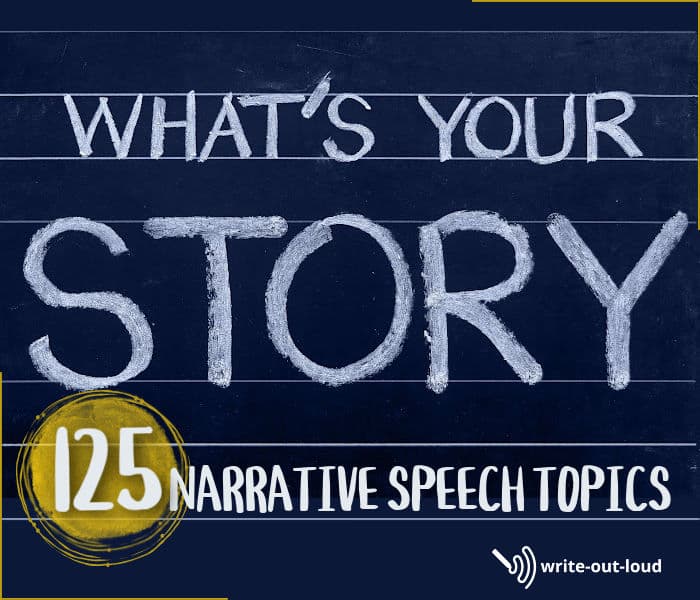
125 strong ideas for effective story telling speeches, preparation guidelines, plus a printable narrative speech outline.
If you're looking for suggestions for the Toastmasters Level Three Project 'Connect with storytelling' these will get you off to a great start.
Go to: 125 examples of narrative speech topics
60 vocal variety & body language topics

60 speech topic ideas to help you work with body language and gesture. They're perfect for evocative personal storytelling speeches or for either of these Toastmasters Pathway projects:
- Level 2: Learning Your Style: Effective Body Language or,
- Level 1: Mastering Fundamentals: Vocal Variety and Body Language
Go to 6 0 vocal variety and body language speech topics
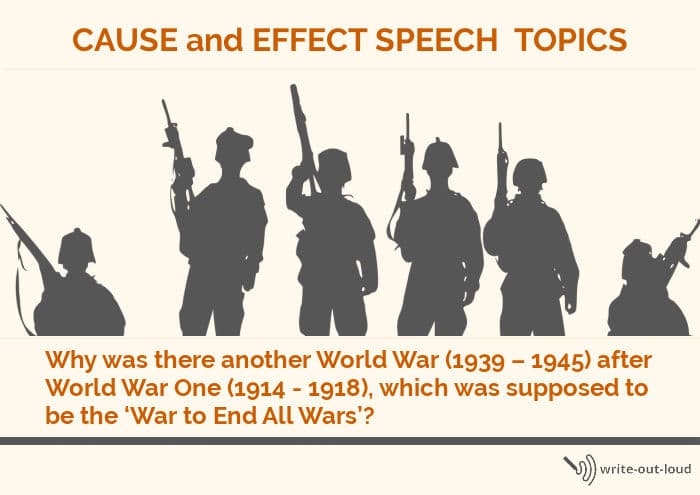
Cause and effect topics for speeches and essays to challenge, connect and make a difference. With explanations, examples and a free printable blank fish bone diagram, (an extremely useful visual cause and effect analytical tool), to download for your own use.
Go to 145 good cause and effect topics
Fun public speaking topics

They're silly; deliberately daft and ridiculous!
These speech topics focus on light-hearted nonsense, tilting the world side-ways, giving your audience a glimpse of it funny side-up.
Gems include:
- 'How to procrastinate like a professional',
- 'How to look innocent',
- 'Why lying can be useful', ...
Go on. Make them snort with laughter. Visit:
- 60 fun public speaking topics for kids of all ages
- 1 88 funny how-to speech topics
180 + interesting speech topic ideas

Here's a page of topic suggestions encouraging people to push beyond ordinary.
There's a bundle of 50 ideas around the growing influence of social media, a collection of 45 thought provoking suggestions centered on your very own community and family history, 61 'weird' topics, and more.
You only need ONE truly bright and original idea, right?
Have a look here for it.
There are 180 interesting speech topic ideas to browse through.
Good informative speech topics

An informative speech does what its title says: it informs. It gives the facts about the topic. Not people's feelings about the subject - just the facts.
Informational speech topic possibilities are quite truly endless. Use my page as a beginning to set your own creative juices in motion.
Visit: 100s of good informational speech topics
Commemorative speech topic ideas
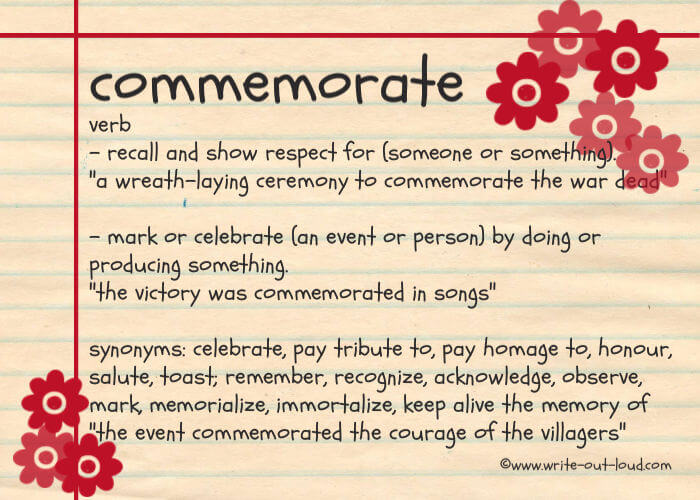
A commemorative or tribute speech honors the memory of a person, a group, an institution, a thing, an event or an idea.
Use this commemorative speech topic helper page (and its resource links) to identify the right topic and theme to match the event you've been asked to speak at.
239 controversial or argumentative speech topics

These topics are deliberately provocative. They cover four broad areas affecting us all: the food we eat, our children (from infancy through to teenage years), and the communities/countries we live in.
In addition to the 239 topics there are comprehensive guidelines about choosing the best topic: one fitting yourself and your audience.
Find yourself a controversial speech topic .
Note: these topics are best suited for high school and college students.
32 Easter themed speech topics

Easter - what is its history? What are the special days, like Palm Sunday, all about? What do bunnies and chocolate eggs have to do with it? Why does the White House have a tradition of egg-rolling as part of its Easter celebrations?
Use this page of 32 Easter speech topic possibilities to find an idea for an inspirational demonstration or an interesting informative speech.
Impromptu speech topics

Help! I have a class and need lots of impromptu speech topics for them to practice with.
You've got them here. I have four pages of topics for impromptu speeches.
You'll find them suitable for middle school and upwards. They're great for public speaking clubs too.
- 200 impromptu speech topics
- 150 1 minute speech topics - with sample speech outlines, speeches: full text & audio
- 11 themed sets of fun topics for impromptu speeches
- 80+ themed table topic questions, with printables
And last, but not least there's ...
98 printable impromptu speech topic cards, an almost* instantly available resource for busy public speaking teachers.
If you're time-poor and need a grab-and-go solution to your "HELP! I want speech topics for my public speaking class, and I need them now" problem, check these out.
Printable Impromptu Speech Topic Cards

* It'll take you 5 minutes to select the set you want, (proverbs or quotations), pay, and have it downloaded ready for printing. You'll be getting 98 themed speech topic cards - a great reusable resource for $4.75.
& One Minute Speeches!
Another almost instantly available resource.

A fun and hugely effective impromptu speaking activity. You get topics + instructions for the core activity, plus three advanced variations for $5.95. Take a look - One Minute Speeches .
- Return to write-out-loud.com homepage
speaking out loud
Subscribe for FREE weekly alerts about what's new For more see speaking out loud

Top 10 popular pages
- Welcome speech
- Demonstration speech topics
- Impromptu speech topic cards
- Thank you quotes
- Impromptu public speaking topics
- Farewell speeches
- Phrases for welcome speeches
- Student council speeches
- Free sample eulogies
From fear to fun in 28 ways
A complete one stop resource to scuttle fear in the best of all possible ways - with laughter.

Useful pages
- Search this site
- About me & Contact
- Blogging Aloud
- Free e-course
- Privacy policy
©Copyright 2006-24 www.write-out-loud.com
Designed and built by Clickstream Designs

- Choosing Good Topics
- Controversial
- Demonstration
- Extemporaneous
- Informative
- School/College
- Special Occasion
- Public Speaking Help
- Writing a Speech
- Free Sample Speeches
- Share Your Speech
- High School Speech Topics
High School speech topics are often difficult to discover. Also, giving a speech may cause you to shake with anxiety, wondering how my classmates will perceive me.
On this page, you'll not only find some great topics, but also a SUPERB video to help you overcome your fear of speaking in public.

Public speaking doesn't have to be something you shy away.
Making speeches in high school can help you build confidence in your ability to interact with your peers. Public speaking practice is also a GREAT way to learn to communicate in the outside world effectively.
And the good news is that coming up with high school speech topics - then turning them into compelling speeches - is not as difficult as it seems. Just take a deep breath and check out the video below. The presentation contains excellent tips to overcome public speaking anxiety and gives great ideas on how to deliver your speech topics and turn them into amazing speeches!
After that, scroll down, and you'll find 25 high school speech topics that I hope will inspire you!
25 High School Speech Topics
- Joining the debate club will help you be successful in College/University.
- High school is the best time of your life.
- High school is a waste of time.
- Should marijuana be legalized?
- Should parents be held legally responsible for their children's actions?
- Should animals be given chemotherapy for cancer or should they be euthanized?
- Should volunteer work be mandatory in order to graduate from high school?
- Should students have to take mandatory drug tests?
- Should the Government be involved in internet censorship?
- Assisted suicide should be legalized.
- Will weapons of mass destruction one day bring about the end of the world?
- Mothers should stay at home with their kids.
- Why are vampires so popular with school kids?
- Teachers' pay should be based on performance.
- Should adoption records stay sealed forever?
- Eating meat is detrimental to your health and to the planet.
- Television, video game and movie violence all contribute to greater juvenile crime rates.
- Students should be allowed to choose the school they attend.
- People should be allowed to sell their organs for transplants.
- Ancient methods of torture.
- Overuse of cell phones causes trauma in young brains.
- The voting age should be reduced to 16.
- Why you deserve an A in your course.
- Should any country be allowed to use torture to obtain intelligence information?
- Dependence on technology is making humanity less intelligent.

I hope these high school speech topics have helped to kickstart your brain. Just remember to take a deep breath before you begin speaking and have fun with your subject!
Free email delivery
MASTER INFORMATIVE SPEAKING WITH OUR FREE CHECKLIST!
We are offering you a FREE SpeakFlight Informative Speaking Preparation Checklist. This valuable resource is packed with step-by-step guidance to help you create compelling, memorable, and effective informative speeches.
Share this page
Return to the Top of the Page
Recommended pages:
School Speech Topics (Main Page) Speech Topics for Kids Elementary School Persuasive Speech Topics for Teens Graduation
Quotes to Use
Positive Quotes for Kids More Quotes for Kids
Sample Speeches
Bullying (persuasive) Student Council Speech (1) Student Council Speech (2) More Sample Speeches
Public Speaking for Kids
Time Management for College Students
Free Open Source Brainstorming Software
- Best Speech Topics
- School Speech Topics

Easily search your speech type
Just check out the sitemap for best-speech-topics.com , which lists all the pages on the site, or use the search box below:
Get to Know Us
- Privacy Policy
Attention Grabbers
- Positive Quotes for Kids
- Quotes for Graduation Speeches
- Poems & Quotes on Death
- Quotes on Retirement
Most Popular Pages
- Free Samples
- Good Speech Topics
- Hypnotize Your Audience
- Welcome Speech
Select a Speech Topic
- Argumentative
- Commemorative
- Inspirational
- Interesting
- Other Topics
Let Us Help You
- How To Write a Speech
- Demonstration Outline
- Informative Outline
- Introductions
- Using a Microphone
- Speech Help
- Speeches Made Easy

School Speech Topics: 200+ Unique Ideas

Delivering a speech is an essential part of every student’s curriculum. It requires confidence to articulate your thoughts and represent them in front of the entire school. It is a beautiful way to interact with your audience, engage with them, and add to their knowledge. This scholarly exercise helps students showcase their critical thinking, soft skills, creative writing, knowledge, viewpoints, and public speaking skills, which allows them to boost their confidence and stand out from the crowd.
The initial step of crafting a speech requires a unique school speech topic. Before starting the business of writing, students must consider their school speech topics. One should decide on their speech topics and get to the writing part as early as possible. But, sometimes, even after brainstorming for hours, students still need help deciding what topic to choose. Don’t worry; we’ve got you covered!
No more stomach-churning and anxiety-inducing thoughts about what topic to choose; our experts have compiled a list of excellent school speech topics. You can use these speech topics to frame an incredible piece of writing.
Table of Contents
Three Pillars of Any Speech
No matter what kind of speech you’re delivering, in all speeches, especially academic speeches, there are always three significant components. These include logic (logos), ethics (ethos), and emotions (pathos).

- Logic (Logos):- “Logos” refers to the logical reasoning in your speech. A single link must connect all the pieces of your arguments and statements. Thus, from the introduction to the conclusion, draft logical, meaningful, and reasonable points to give substance to your opinions.
- Ethics (Ethos): The second aspect, emotions, or ethos, signifies your ethics, morality, and believability as a speaker. Increasing your credibility will help persuade your professors or readers to accept your arguments and consider the necessary actions.
- Emotions (pathos): Emotions play a significant role in convincing someone. It is likely the most crucial aspect of your academic speech. Emotions pique people’s interest, which motivates them to listen to your arguments and consider taking the recommended actions.
Thus, to present a unique, intriguing academic speech, students must ensure that their speeches successfully comply with all these three pillars of speech.
How to Research Speech Ideas for School
There are some fundamental suggestions that you need to follow for selecting your speech topics. These suggestions will help you navigate through the selection process. These include:
- Research and narrow down crucial topics that would perfectly fit into a coherent speech topic. Ensure that the selected topic is suitable to enhance your abilities and interact with your audience.
- The next step is to identify your targeted audience . Knowing your audience’s demographics will enable you to choose a subject that will capture the audience’s attention from the start. Ensure to be more aligned with the audience’s general areas of interest.
- Ensure that your selected topic is not leading your audience in distinct directions where they will find it hard to follow your speech flow.
- When you’ve selected your educational speech topics, follow the answers to these 5 Ws to ensure you’re on the right track:
- Who is affected by your topic or problem?
- Why is this subject significant? What drives the exploration of it?
- What regions of the world does the topic affect, or where is it located?
- When and how was/is this subject discussed? Is time a crucial component?
- What is the most crucial argument or point of view?
- The next step is to understand your audience. Knowing your audience’s demographics will enable you to choose a subject that will capture attention from the start and be more in line with general areas of interest.
- Keep things interesting for yourself and your audience. Speeches can be tedious. Choose a creative, exciting topic to keep your audience engaged throughout the presentation.
200+ Captivating School Speech Topics

Writing a speech requires coming up with a brilliant topic and then articulating your thoughts and knowledge in a systematic and disciplined manner. Either teacher assigns students their topics for speeches, or students might have the opportunity to select for themselves.
Below is a list of 200+ great speech topics for high school students that can help you draft a powerful speech.
Speech Topics for High School Students
For high school students, the scope of research extends to another level. They can do research on anything and anyone they want. There are numerous topics for speeches that could be interesting to you. Look through the list of topics below to see if you can find something that interests you.
- The 1917 Spanish flu
- The opioid outbreak in the United States
- Ignorance is bliss
- The Salem witch trials
- Cruelty in animal testing laboratories
- How do books make a difference?
- Fashion in Victorian Britain
- Modern politics, culture, and society
- Racial discrimination in the workforce
- The power of satire in comedy
- Censorship issues in the film industry
- Classical mythology in popular cultures
- Superhero culture in society
- Body donation for medical science: why and why not?
- Depletion of the ozone layer
- What is the reason for deforestation in developing countries?
- Waste management from a global perspective
- Water-saving agriculture in China: an overview
- Why do endangered species matter?
Read Also – Top 100 Position Paper Topics
Persuasive Speech Ideas for Students
Persuasive speech is crafted to persuade individuals to believe in something or do something irrespective of their traditional beliefs. It is the type of speech that revolves around everything, whether it’s arguing about politics or talking about a balanced diet.Below are some engaging, persuasive speech topics for students. Use this list to get inspired and craft a fantastic speech:
- Impact of marketing on individuals and their perception
- Effect of peer pressure on students’ mental health
- Are zoos ethical? Why animals should not be kept in zoos
- Strategies involving students’ interest in learning
- Critical global issues: what is the biggest threat to the world?
- The past, present, and future of recycling
- Conservation of oil and natural gas
- Understanding the importance of water reservations
- Why is global warming still a threat to human health?
- Advertising standards: advertising should be more regulated.
- Why has Indonesia banned palm oil exports?
- How can television once again be instructive and beneficial?
- The truth about political correctness: the two-fold connection of liberalism
- Euthanizing stray animals: is it ethical?
- How our differences make us unique
- The importance of delegation
- Technology dependency among teenagers
- Benefits of conserved oil
- Search engine technologies are replacing traditional research methods.
- Is graffiti art or vandalism?
Informative Speech Ideas for School Students
An informative speech is a type of speech that is crafted by centralizing people, events, places, news, things, or processes. This speech is entirely and exclusively focused on facts.
Thus, in simple words, an informative speech imparts knowledge to the audience regarding a particular subject. If you’re thinking of drafting an informative speech, then here are some topic suggestions you can consider:
- The importance of the arts for students
- The life cycle dynamics of ocean animals
- Customer satisfaction surveys in the business world
- A prohibition on advertisements that depict violence, ragging, or body shaming to gain TRPs.
- Relationship between religion and Education
- IUCN Red List of Threatened Species
- Why one shouldn’t be afraid of their competitors
- The psychology of colors: the effects of colors on behavior
- Self-tanner has real-world adverse effects.
- Antipodes map: tunnel to the other side of the world
- Overweight and obesity
- Owning a pet: things to know
- Could fining parents cut childhood obesity?
- Ancient and Asiatic horse breeds
- The history and present of the ivory trade
- Causes of deforestation in developing countries
- Causes and effects of overpopulation
- medical dangers of consuming nicotine
- Sexual prejudice in sports
Read Also – Top 100 +Group Discussion Topics
Arts & Culture Speech Topics for High School Students
Here we’ve compiled a catalog of some outstanding arts and culture speech topics to help you frame a memorable speech:
- Culture and nationalism
- The importance of multicultural Education
- Graffiti should be considered an art.
- Preserving traditional games as cultural treasures
- Classic literature readings versus modern e-books
- Art and music therapy
- The economics of art museums
- The importance of music and the arts for young minds
- The E-Library Culture
Incredible School Speech Topics for English & Classical Literature
If you’re a literature student or are keen to study literature or English, then you can look at these below-given school speech topics connected with English and literature.
- Keats, the man, medicine, and poetry
- Women writers who shaped American literature in the twentieth century
- Resolving writer’s block
- Shakespeare’s role in shaping the modern language
- Evaluating Ernest Hemingway’s narratives for promoting toxic masculinity
- The history of book bans in the United States
- Symbolism in Harper Lee’s To Kill a Mockingbird
- Which current literature will endure as classical literature in the future?
- Pride and prejudice: the limits of societies
- Understanding Virginia Woolf as a feminist
- Contemporary movies that depict works of classic literature
- The role of Lady Macbeth in the downfall of Macbeth
- contribution of women in shaping early American literature
- Romanticism in the 18th-century British literature
- The status of women in 20th-century English society
- Male dominancy in the texts of early British literature
- An examination of the “I Have a Dream” speech by Martin Luther King, Jr.
- Understanding power and identity in Gothic literature
- Agatha Christie as the first lady of crime
- The post-romantic and Victorian eras
Read Also – 100+ Anthropology Research Paper Topics
School Speech Topics Regarding Current Affairs and Social Issues
Finding exciting topics regarding current affairs or social issues is pretty straightforward. Crafting a speech around current and social events will have an exceptionally significant impact on your audience. Carefully analyze each topic in the following list:
- White nationalism
- What lessons have we learned from the pandemic?
- The Occupy Wall Street movement
- Afghani women under Taliban rule
- Modern protest culture
- Israel-Palestine relations
- Ukraine and Russia are at war.
- Liberalism vs socialism
- The Me Too movement
- Role of the UN in protecting human rights
- “Viral” culture in today’s society
- Black Lives Do Matter.
- Anti-hijab protests in Iran
- Human rights as a western construct
- A Green New Deal
- Tortured justice: no pain, no gain?
- Syrian civil war
- Global human trafficking: a 2022 report
- Generational divisions between Baby Boomers, Millennials, and Generation Z
- DACA: Deferred Action for Childhood Arrivals
Politics, Law, and Business Related School Speeches Ideas
Writing a speech regarding politics, law, or business can be complicated. Despite their interest in these subjects, students chose them as speech topics. While watching current events or the news can be advantageous, you can also analyze the below-given list for some inspiration:
- Marketing niches: is it beneficial for your business?
- The role of elections in a democracy
- Understanding the influence of social media on shaping political campaigns
- Political ideologies that shook the world
- Analyzing the government’s role in combating the environment
- The future of small businesses
- Business performance management
- Unorthodox business ideas
- Anti-trust policies and provisions
- Juvenile Delinquency Prevention
- America is not a democracy.
- An overview of activity-based management in businesses
- Gender-based discrimination in the workplace
- Youth and politics: youth participation in changing the world
- The business world has forgotten competitive marketing skills.
- Democracy vs communalism
- Image of “Justice” in Dostoevsky’s Crime and Punishment
- Modelling the impact of AI on the global economy
- Emerging issues in the private panel institutions
Speech Topic Suggestions on Psychology
Today, psychology is a highly contentious issue. Many students are interested in learning more about psychological issues. Therefore, consider creating your speech around psychology. Check out our collection of topics!
- Mental health issues and war veterans
- Why does human multitasking fail?
- Drug Addiction Hypnotherapy
- The impact of media and peers on eating disorders among children
- impact of social media on our mental health
- The psychology behind cults
- Sigmund Freud’s Theories: Simply Psychology
- Social determinants of mental health
- The psychology of sleep paralysis
- Cognitive approaches to insomnia
- Abnormal psychology
- The psychology of dreams and nightmares
- The psychological essence of child geniuses and prodigies
- Early identification of autism disorders
- The consequences of childhood bullying on mental health and low self-esteem
- The relationship between physical and mental illness
- The formation of memories in the human brain
- Emotional reaction to music: how does music evoke emotions?
- The psychology of money
School Speech Topics Based On Technology
Being science students, nobody knows this better than you; those technological speech topics can never be dull or tedious. This field is undoubtedly the most complex or challenging, but what can be fun if there’s no challenge? So, here are some fascinating technology-related speech topics for high school students:
- It is preferable to have printed images than to retain electronic copies on a computer.
- The significance of regularly creating backups of your computer files
- Search engines are replacing libraries.
- Future Space Science and Exploration: A Historical Overview
- A Scientific and Ethical View on Human Cloning’s Developments
- What Is the Future of Artificial Intelligence?
- Increase in robotics
- How can we continue to profit from the internet?
- The Effects and Consequences of Bio-warfare
- The future of humankind and its technological impact
- The significance of being alert to internet fraud
- Phones make it difficult for us to communicate with one another.
- Why free internet music should be available.
- The role of technology in shaping our lives
- The future of AI watches
- How are evolving technologies harming human lives?
Topics for Scientific Studies Speeches
Are you searching for compelling subject matter for your speech? You’ll need to choose the proper topic carefully because this is one of the most challenging disciplines of study. Here are a few suggestions.
- What Is a Computer Virus?
- What Is the Influence of Social Media on Us?
- Discover Interesting Facts About the Human Brain
- How does the human brain work?
- Drug testing shouldn’t be done on animals.
- How can geniuses be produced?
- How can rainforests be preserved for future generations?
- The contribution of Newton to science
- The historical scientist with the most impact
- How are search engines operated?
- How do modern technologies change our lives?
- Why shouldn’t whales be used as a food source?
- The AI of tomorrow observes
Environmental Education Speech Topics
Despite only minor Ozone Layer loss, we still have a long way to go to protect our environment. If you are into environmentalism, then these given environmental speech topics can help you craft a memorable speech about enhancing the ecological system. Carefully analyze the following intriguing environmental speech ideas for college students:
- How to Create a World That Runs on Alternative Energy Sources
- What Can We Do to Prevent Animal Abuse?
- What human behaviors cause landslides?
- There is no longer a lot of fish in the seas and oceans. Why?
- Effects of a Growing Population
- Why Do Farmers Use Organic Fertilizers?
- Are Our Tropical Rain Forests Dying?
- The benefits of using reusable bags every day
- Whether Pluto should be classified as a planet
- Advantages of requiring recycling for everyone
- Should the US government increase its funding for space initiatives?
- What are the primary risks posed by oil spills in the ocean?
- Is it crucial to be informed about what’s going on in space?
- Importance of environmental cleanliness
In addition to research and diligent work, brilliant work is essential to prepare an educational speech. Please remember that this is not a research paper but only a speech. Prepare accordingly. Research credible sources, but don’t go overboard. Know when to stop researching and get back to writing.
Speech isn’t just about your writing skills; it also involves your communication skills. Don’t leave it to the last minute; start practicing your speech delivery as soon as you finish writing. Using words is simple if you are precise and confident in your presentation of your work. Be intellectual, passionate, and enthusiastic, and your audience will applaud you appropriately.
If you can’t handle your papers, Edumagnate is a paper help service that meet your needs.
By Alex Brown
I'm an ambitious, seasoned, and versatile author. I am experienced in proposing, outlining, and writing engaging assignments. Developing contagious academic work is always my top priority. I have a keen eye for detail and diligence in producing exceptional academic writing work. I work hard daily to help students with their assignments and projects. Experimenting with creative writing styles while maintaining a solid and informative voice is what I enjoy the most.
Speak 2 Impress
No products in the cart.

50 Unique Topics for Speeches to Impress Your Audience
Deciding on the perfect topic for a speech can often feel like searching for a needle in a haystack. Believe me, I understand the struggle all too well – finding that ideal combination of engaging and informative content is no small feat.
Throughout my own journey, I’ve stumbled upon not just one but 50 unique topics that are sure to captivate any audience . This article is designed to give you insights into selecting those attention-grabbing subjects , ensuring you leave an unforgettable impression each time you step onto the stage.
So, buckle up and get ready to wow your listeners!
Table of Contents
Key Takeaways
- Good speech topics should excite the audience, be relevant to current issues , and reflect the speaker’s knowledge and interest.
- Topics range across various areas including arts, humanities, social issues, science and technology, health and medicine, and economics .
- Choosing a unique topic helps in standing out. It’s important to research thoroughly and consider different viewpoints on your chosen subject.
- Knowing your audience is crucial for making the speech engaging. Tailor content to their interests and understanding level for better engagement .
- Practice makes perfect. Rehearse your speech multiple times to build confidence and refine it based on feedback to ensure an impactful delivery .
What Makes a Good Speech Topic
– A good speech topic is one that excites the audience and sparks their curiosity, leading them to want to know more.
– It should be relevant to current issues or areas of great significance, engaging the listeners with fresh ideas and perspectives.
Knowledge and Interest
Choosing a topic that you know about makes your speech stronger. You can share insights and details. It shows in how you talk about it. Your passion for the subject keeps people listening.
They can tell when you care deeply.
Your interest also helps in picking engaging speech topics . If it excites you, chances are it will grab your audience’s attention too. Exploring new ideas becomes easier because your enthusiasm drives you to learn more and present better.
Relevance and Significance
When choosing speech topics, it’s important to consider the relevance and significance of the subject matter. It’s essential that your topic resonates with your audience and has a meaningful impact on them.
The significance of your speech topic should be evident in how it relates to real-world issues or captures the audience’s attention . Additionally, a relevant topic ensures that you can connect with your audience on a personal level , making your speech more engaging and thought-provoking .
Now let’s delve into exploring different types of persuasive speech topics – Arts, Humanities, and Culture.
Originality
Strive for unique topics that spark interest
to captivate your audience and stand out .
Selecting original speech subjects is vital –
offer something fresh and thought-provoking .
Avoid cliches and seek ideas beyond the obvious ,
Types of Persuasive Speech Topics
Persuasive speech topics cover a range of subject areas such as arts, humanities, social issues, science and technology, health and medicine, and economics. They resonate with audiences through their relevance, significance, and ability to stimulate thought.
Arts, Humanities, and Culture
When it comes to captivating speech topics, arts, humanities, and culture offer a rich source of inspiration. Here are some thought-provoking speech topics for you to consider:
- The influence of art on society
- Cultural appropriation in the media
- The evolution of hip – hop music
- Gender representation in literature
- The impact of social media on visual arts
- The significance of ancient mythology in modern storytelling
- Preservation of indigenous languages and traditions
- Role of museums in preserving cultural heritage
- Cultural diversity in global cinema
- The power of music in shaping identities
These intriguing speech topics will help you engage your audience and leave a lasting impression with your insightful presentations.
Social Issues
When it comes to persuasive speaking, addressing social issues can be impactful and thought-provoking. These topics can captivate your audience and spark meaningful discussions. Here are some compelling speech topics related to social issues:
- The impact of social media on mental health and well-being
- Strategies to combat cyberbullying and online harassment
- The importance of promoting diversity and inclusion in the workplace
- Addressing homelessness in urban communities
- Raising awareness about the effects of climate change on vulnerable populations
- Promoting mental health education in schools to reduce stigma
- Exploring the impact of poverty on access to quality education
- Strategies for combating human trafficking and modern-day slavery
These topics provide a platform for engaging discussions that can inspire change and raise awareness about pressing social issues in our communities.
Science and Technology
As we transition from social issues, let’s delve into the realm of science and technology. Here are some stimulating speech topics to impress your audience:
- The Impact of Artificial Intelligence on Society : Discuss how AI is shaping various industries and its implications for the future.
- Ethical Implications of Genetic Engineering : Explore the moral considerations surrounding gene editing and its potential impact on humanity.
- Advancements in Space Exploration : Delve into recent developments in space technology and their significance for our understanding of the cosmos.
- The Future of Renewable Energy : Examine innovative approaches to sustainable energy production and their potential to combat climate change.
- Cybersecurity in the Digital Age : Highlight the importance of protecting personal data and critical infrastructure in an increasingly interconnected world.
- Biotechnology Innovations in Medicine : Explore cutting-edge medical treatments and their potential to revolutionize healthcare.
- The Promise and Perils of Quantum Computing : Discuss the capabilities of quantum computing and its potential consequences for cybersecurity and scientific research.
- The Role of Technology in Environmental Conservation : Examine how modern technologies are being used to address environmental challenges such as pollution and deforestation.
- Augmented Reality and Its Applications : Explore how AR is transforming various industries, from gaming to education and healthcare.
- The Future of Transportation Technology : Discuss emerging trends in transportation, including autonomous vehicles and sustainable transit solutions.
These thought-provoking speech topics are designed to captivate your audience with engaging insights into the ever-evolving world of science and technology.
Health and Medicine
When it comes to persuasive speech topics, health and medicine are crucial areas. These topics can captivate your audience and spark important discussions. Here’s a comprehensive list of engaging health and medicine speech topics:
- The impact of mental health on overall well-being, including strategies for maintaining good mental health.
- The importance of vaccination in preventing infectious diseases and the debunking of common myths surrounding vaccinations.
- Exploring the benefits and risks of alternative medicine practices such as acupuncture and herbal remedies.
- The ethical considerations of gene editing technology and its potential impact on future generations.
- Understanding the role of nutrition in preventing chronic diseases and improving overall health.
- Discussing the stigmatization of mental illness in society and promoting awareness for better understanding.
These captivating health and medicine speech topics will engage your audience and create meaningful dialogue about crucial aspects of our well-being.
As a public speaking beginner, I understand the importance of choosing a compelling speech topic to engage your audience. Here are some persuasive speech topics related to economics that can impress your listeners:
- The impact of globalization on local economies and businesses
- The role of small businesses in driving economic growth and innovation
- The pros and cons of increasing the minimum wage for workers
- How technology is changing the landscape of the job market and its effects on the economy
- The relationship between consumer behavior and economic trends
- Exploring sustainable practices in business and their economic benefits
- The significance of financial literacy in today’s economy and its impact on individuals and communities
- Analyzing the impact of government policies on economic stability and growth
- The role of entrepreneurship in shaping economic development and job creation
- Understanding the concept of supply and demand in influencing market prices
These topics are designed to spark engaging discussions and captivate your audience while addressing key aspects of economics.
Tips for Crafting a Compelling Speech
Crafting a compelling speech requires thorough research and consideration of all angles. Knowing your audience is crucial for tailoring the content effectively.
Research and Consider All Angles
When crafting a speech topic, research and consider all angles . It’s crucial to delve into various perspectives on the topic. This ensures that your speech has depth and addresses different viewpoints.
By thoroughly researching and considering all angles, you can present a well-rounded and comprehensive view to captivate your audience.
Focusing on thorough research helps in finding compelling facts and evidence that support your argument or topic. Moreover, considering all angles demonstrates respect for differing opinions , making your speech more inclusive and engaging for the audience.
Know Your Audience
Understanding your audience is crucial. Tailoring your speech to fit their interests and knowledge level will help you engage them better . This means considering what they already know, their age group, and any specific interests they may have.
Keep it simple for high school or college students but aim for depth if speaking to those with a more advanced understanding of the topic. Remember , captivating your audience starts with knowing who they are and what resonates with them.
I’ve found that knowing your audience helps in choosing the right words and examples which would make my message clearer and more relevant to them. It’s not only about what interests me as the speaker but also about piquing curiosity amongst the listeners through shared commonalities or something new that catches their attention.
Practice and Refine
To craft a compelling speech, practice and refine are crucial. Practice by rehearsing your speech multiple times to build confidence. Time yourself to ensure that you deliver within the allocated duration.
Refine your speech by seeking feedback from peers or mentors and making necessary adjustments. Pay attention to your body language, tone of voice, and pacing during practice sessions to improve delivery.
Rehearse in front of a mirror or record yourself to identify areas for improvement. Finally, seek opportunities to speak in public or join groups like Toastmasters International for practical experience .
Picking a good speech topic is key . It must interest you and grab your audience’s attention. Dr. Susan Hart, a renowned public speaking coach with over 20 years of experience, sees the value in unique topics .
Dr. Hart, with her Ph.D. in Communication from Stanford University, has guided thousands through the art of impactful speaking.
Dr. Hart praises our list for its range and originality. These topics encourage deep research and showcase various perspectives , she notes.
She also highlights the importance of ethical speech preparation .
For daily life or special events, Dr. Hart suggests these topics can inspire conversations or debates…
Weighing pros and cons, Dr.Hart finds our list diverse but warns against choosing overly complex subjects without enough prep time.
In her view, “50 Unique Topics for Speeches to Impress Your Audience” stands out as a valuable tool for anyone eager to improve their public speaking skills by offering fresh ideas that captivate any crowd.

Ryan Nelson is the founder of Speak2Impress, a platform dedicated to helping individuals master the art of public speaking. Despite having a crippling fear of public speaking for many years, Ryan overcame his anxiety through diligent practice and active participation in Toastmasters. Now residing in New York City, he is passionate about sharing his journey and techniques to empower others to speak with confidence and clarity.
Similar Posts

10 Heartfelt Poems for Funeral Programs to Honor Your Loved Ones
Searching for the right words to honor a loved one who has passed can feel overwhelming. It’s a challenge many…

10 Persuasive Speech Examples for College Students to Inspire Your Next Presentation
Confronting the jitters that come with public speaking is an all-too-familiar battle for many of us. I, too, have grappled…

How to Write a Winning SRC Speech for Student Council
Crafting a standout speech for the student council, like the SRC, can often feel akin to scaling an insurmountable peak….

150 Just a Minute Topics for Engaging and Effective Speeches
Navigating the choppy waters of public speaking can be daunting. Like many, I’ve grappled with finding the right words to…

10 Inspiring Award Speech Examples for Your Next Acceptance Speech
Walking up to accept an award can feel like you’re about to battle a colossal beast, especially if the thought…

How to Write a Winning Student Council Secretary Speech
Crafting the perfect speech for a student council secretary position can feel like quite the mountain to climb. I know…
Our Services
College Admissions Counseling
UK University Admissions Counseling
EU University Admissions Counseling
College Athletic Recruitment
Crimson Rise: College Prep for Middle Schoolers
Indigo Research: Online Research Opportunities for High Schoolers
Delta Institute: Work Experience Programs For High Schoolers
Graduate School Admissions Counseling
Private Boarding & Day School Admissions
Online Tutoring
Essay Review
Financial Aid & Merit Scholarships
Our Leaders and Counselors
Our Student Success
Crimson Student Alumni
Our Reviews
Our Scholarships
Careers at Crimson
University Profiles
US College Admissions Calculator
GPA Calculator
Practice Standardized Tests
SAT Practice Test
ACT Practice Tests
Personal Essay Topic Generator
eBooks and Infographics
Crimson YouTube Channel
Summer Apply - Best Summer Programs
Top of the Class Podcast
ACCEPTED! Book by Jamie Beaton
Crimson Global Academy
+1 (646) 419-3178
Go back to all articles
100+ Excellent Topics for a Stellar Persuasive Speech
/f/64062/1200x675/75a865e9e4/black-man-typing-writing-0730211.jpeg)
What Makes a Truly Remarkable Speech?
The Ingredients of an Effective Topic
Ideas & Inspiration: 100+ Topics
Your Next Steps, Step-by-step
This comprehensive blog post serves as a vital resource for anyone looking to craft an impactful persuasive speech. It provides an extensive list of over 100 compelling topics tailored for a wide range of interests and academic fields. Additionally, it offers advanced guidance on selecting the perfect topic, structuring your arguments effectively, and employing persuasive techniques that captivate and convince your audience. Whether you're an academic achiever or an aspiring public speaker, this guide equips you with the insights to deliver a stellar persuasive speech.
Before You Pick the Perfect Topic...
If you’re struggling to find a strong topic for a persuasive speech , you’ll find 100+ ideas for subjects and topics below. Use one that grabs you, or simply find inspiration to get unstuck and come up with a topic about something you and your audience will find interesting.
To help you think about the big picture — your larger essay — we also review what makes a truly effective persuasive speech, all the ingredients of an effective topic, and how to pick the best topic for your circumstances.
Here's what's most essential as you consider your topic choices:
- pick a topic that has the right scope, one aligned with your larger assignment
- be sure the topic is one you're interested in researching, has meaning and relevance for your audience, and has the right level of complexity — both for your audience and for your level of speech writing prowess
- remember your topic should align with themes and subjects related to your circumstances and the speech requirements
Finally, once you’ve picked your topic, and even if you know all the basics — which I’m guessing you do if you’re following posts from Crimson Education — you might still benefit from other advice in today's post, such as numerous speech writing tips and strategies designed to save you time and stress and improve the odds your final speech will exceed expectations.
Here's what you'll find:
- What Makes a Truly Remarkable Persuasive Speech
- The Ingredients of an Effective Topic, and Tips for Picking Your Topic
- 100+ Topic Suggestions
- How to Develop a Stellar Persuasive Speech — Step-by-Step!
Still feeling a bit hesitant or stuck?
Don’t worry. Once you've picked a really interesting and effective topic and start your research, you'll quickly become a subject-matter expert, regaining both motivation and confidence for all the remaining steps.
What Makes a Truly Remarkable Persuasive Speech?
A good persuasive speech will grab the audience’s attention, help them connect with the speaker (that’s you), and guide their reasoning process — giving the speech the power to persuade your audience why your point of view is logical and compelling, and also superior to the opposing viewpoints.
The 6 Most Essential Ingredients
- A strong introduction that gets the audience engaged and provides context about the subject and topic, what’s at stake (why it matters), and what issues or concerns tend to be front and center
- A clear thesis in the form of a specific point of view, opinion, or argument
- An orderly progression of ideas and arguments, each argument or subtopic supported by logic and evidence
- An anticipation of opposing viewpoints and arguments (the counterarguments to your opinion)
- Your responses or ‘rebuttals’ to the opposing viewpoints , answering the anticipated objections and adding additional support for your point of view or thesis
- A conclusion that highlights the most powerful persuasive elements in your speech and reminds listeners what's at stake, including, if suitable, a call to action
The Historical Roots of Persuasive Speech
Did you know that persuasive speech assignments may be testing your mastery of concepts that go back as far as ancient Greece?
The emergence of democracy in ancient Greece (the 6th and 5th centuries B.C.) created a space for the rule of law and political governance informed by the will of the people — making persuasive speech an essential element of social life.
From courtroom trials to political campaigns and democratic assemblies, persuasive speech emerged in 5th-century Athens as an essential tool of democracy. Soon the brightest philosophers of the day became concerned with the principles of "rhetoric" — the study of orderly and effective persuasive speaking.
Now, thousands of years later, little has changed in Western democracies: "constructing and defending compelling arguments remains an essential skill in many settings" (Harvard U, Rhetoric ). In short, the principles of deliberation, free speech, and consensus building we use for governance, in school, extracurricular activities , at work, and sometimes our day-to-day life, still rely on persuasive speech.
“In every free society individuals are continuously attempting to change the thoughts and/or actions of others. It is a fundamental concept of a free society.”
- persuasive speaking, by r. t. oliver, ph.d..

How The Rhetorical Triangle Can Turbo-charge Your Speech
The 5th-century B.C. Athenian philosopher Aristotle argued that your ability to persuade is based on how well your speech appeals to the audience in three different areas: logos, ethos, and pathos, sometimes referred to as the three points of the rhetorical triangle .
From observation and reflection Aristotle understood that humans are thinking animals (logos), social and moral animals (ethos), and emotional animals (pathos) — such that appealing to all three of these pillars of human understanding and action were essential parts of an effective persuasive speech .
1. Logos — Using clear, logical, and evidence-based reasoning and argumentation to add persuasive power to your speech.
For obvious reasons, audiences will typically expect strong arguments supported by evidence and clear reasoning and logic, all elements that are often prominent on grading rubrics for persuasive speeches.
Maybe you're thinking of speeches you've heard that utterly lacked logic and evidence? It's a reminder that persuasion as such is ultimately about points of view and not always about facts. Even without logic, a speaker can persuade, through effective uses of ethos and pathos , for example. In other instances social phenomena may underlie a lack of logic and evidence, such as "group think," for example , when people are swayed or swept up by a common point of view about an issue, instead of thinking critically about it.
2. Ethos — The component of persuasive speaking that spotlights the appeal, authority, credentials, and moral standing of the speaker .
Have you ever agreed with a speaker simply because you liked the person speaking, or rejected an argument because you disliked a speaker, responding to who the speaker is more than to their arguments? That may not be very logical, but it is very natural for us humans.
Aristotle understood this, that persuasion relies not solely on logical thinking but on relational factors too, including how much we trust a speaker, how much we believe in the integrity of their motives, and the knowledge and expertise they possess (or are perceived to possess).
Take law courts, for example. One common strategy lawyers use to undermine the force of witness testimony is to “discredit” or “taint” the witness , to undermine jurors' confidence in the veracity and motives of the witness. That's using ethos, rather than logic and facts, to impact an audience (the jury).
Likewise, when an audience has a high regard for the speaker's reputation, authority, and credibility, the more convincing that person's arguments are likely to be.
Suggestions for enhancing appeals to ethos in your speech:
- Share a transformative journey where you shifted from an opposing perspective to your current stance due to overwhelming evidence. This approach can demonstrate your capacity for logic and open-mindedness, helping your audience see you as very rational and impartial, potentially strengthening your credibility.
- Incorporate the viewpoints and expertise of respected authorities to bolster your arguments. Referencing reliable sources and experts boosts your credibility by showing you've grounded your arguments in established facts, perspectives, and ideas.
- Foster a connection with your audience. For example, rather than overwhelming them with complex reasoning to showcase your intelligence, strive to comprehend and reflect their perceptions and potential biases regarding your topic. This should make your audience more receptive to your logic and perspectives as your speech progresses.
- Employ personal anecdotes or lived experiences that unveil a deeper layer of understanding and wisdom. This personal touch not only humanizes you, the speaker, but makes your arguments more relatable and persuasive.
Depending on circumstances, you may think of additional ways to bolster your credibility and trustworthiness — enhancing your standing in the eyes of the audience in order to elevate the persuasive impact of your speech!
3. Pathos — This means injecting your speech with some powerful appeals to listeners' feelings and emotions , in addition to using logic and reason.
For example, if your speech entails persuading voters to increase foreign aide to combat world hunger, you wouldn’t just want to cite cold statistics. Painting a picture of ways malnutrition is affecting real individuals is likely to have a strong impact on listeners' emotions, appealing to their innate capacity for compassion towards others and helping them more deeply appreciate the urgency of the subject . This approach impacts listeners' emotions and highlights an urgent and universal moral imperative that adds conviction to your point of view.
In most academic settings, you'll be expected to present a speech with a strong line of evidence-based, logical reasoning, often making appeals to logos prominent in persuasive speeches in school settings. That said, by injecting and balancing appeals to logos, ethos, and pathos, based on what's most suitable for your topic, assignment, and approach, you'll add a significant measure of mastery to your persuasive writing method.
A Consistent Style and Tone
What style, voice, and tone best suit your personality, the occasion, the listeners, and your subject?
- Consider adopting a straightforward, clear, and succinct style , reminiscent of a newspaper editorial or a no-nonsense argument in a voter guide. This approach works well for topics and settings requiring direct communication with clear insights and persuasive arguments free from subjectivity and unnecessary analysis and complexity.
- For topics, interests, or assignments that naturally entail wading through broader philosophical and ethical debates — like debating justifications for euthanasia or arguments against the death penalty — a more introspective, contemplative voice may be expected . This style allows for a deeper exploration of moral dimensions and the broader implications of the issue at hand or the underlying logical principles involved.
- If your inclination is towards something more unconventional, employing humor and wit could be a chance to take the road less traveled! Whether through irony or parody, for example, by showcasing a humorous topic from the outset, such as "why dog people outshine cat people," or cleverly presenting weaker arguments to underscore your point, this strategy, while offbeat, can captivate and entertain , making your speech stand out in a large class setting. Just be sure to balance the creativity with a clear demonstration of your persuasive speech skills and consider checking in with your teacher about possibilities and expectations beforehand.
With a broader understanding of what goes into a great persuasive speech, you’re better equipped for the important step of picking the topic that will guide your speech.
Picking Your Topic — Questions to Ask
Does it interest you.
Conveying passion for a topic is infectious, adding power to your speech. The more interested and invested you are in your subject and topic, the more likely you are to make your speech the best it can be.
Will the topic interest your audience?
Understanding your audience's values, interests, and views will help you make immediate connections with their own thought processes and attitudes. Try to pick a topic that will get your listeners to perk up and move to the edge of their seats.
Is the topic or point of view fresh and engaging?
Choosing a topic that's novel, contemporary, or presents a unique angle on a familiar issue should help you captivate your audience's attention. You also want the topic to be something that matters to your audience with a point of view that challenges their thinking, so you're not just "preaching to the choir."
Are there any "triggers" or otherwise "sensitive" or "inappropriate" themes?
You might not think there’s not any problem with a topic such as Should we build a wall to keep immigrants out of the country? Or, Should same sex marriage be legal? That said, topics that delve into identity politics or areas that are so controversial that they elicit anger or hostility rather than dialogue and debate may lead to emotional hurt and harm, even if not intended. If you have any doubts, check in with your teacher or a school counselor before settling on your topic!
Finding Subjects and Topics on Your Own
Before you jump ahead and grab a ready-made topic from the list below, remember that a quick brainstorming or online search could be your preferred method to find the best, most interesting topic for your audience, setting, and individual interests or class requirements. For example, an internet search with keywords such as “biggest problems or biggest issues in the world today” will quickly uncover a host of themes and subjects that are both timely and controversial.
Search Results for Keyword Phrase Contemporary World Problems and Issues
- Water contamination
- Human rights violation
- Global health issues
- Global poverty
- Children's poor access to healthcare, education and safety
- Access to food and hunger
- Anti-corruption and transparency
- Arms control and nonproliferation
- Climate and environment
- Climate crisis
- Combating and crime
- Countering terrorism
- Cyber issues
- Economic prosperity and trade policy
- Technology and privacy
A General List vs. Time & Place Factors
Where you live and what’s timely for you and your audience is going to depend on your circumstances. Finding a “hot topic” in your specific time and place could be an effective way to get listeners' attention and address an issue that feels highly relevant.
- Is there a big policy decision that’s a hot topic at your school?
- Is there a ballot initiative your community will vote on soon that your audience has strong opinions about?
- Is there a current events issue in your local news headlines that offers a compelling persuasive speech topic?
- What’s before congress these days, or before the Supreme Court, or the United Nations — this week (any great topics there for your speech)?
More Inspiration: 100+ Interesting Persuasive Speech Topics for High School
If you haven’t already navigated your way to an interesting persuasive speech topic, use the list below for even more ideas and inspiration!
You can go from top to bottom, or you can jump the line and look for the themes that most interest you, such as Art and Culture or Recreation and Tourism.
Art and Culture
1. Is digital art really art?
2. Street art: vandalism or cultural expression?
3. Is there a place for censorship in the music industry?
4. Do museums promote culture or appropriate culture?
5. Should other countries have a minister of culture or similar government office, as they do in France?
6. Can schools, or art teachers, define good art vs. bad art? Should they?
7. Censorship in art: when is it justified or necessary?
8. Does creative freedom take precedence over cultural appropriation?
9. The impact of digital platforms on the consumption of art and the value of art.
10. Is there a role for public policy and public funding in arts and culture?
1. The pros and cons of minimum wage laws and policies.
2. Cryptocurrency: the future of finance or a scam?
3. Is student loan debt relief good policy?
4. Gender wage gap: are the concerns justified or unjustified?
5. Sustainable development: Is there a way to sustain economic growth and without an environmental catastrophe?
6. The role of small businesses in the economy, do they promote prosperity or undermine efficiencies?
7. Globalization: economic boon or bane?
8. Is consumerism in the general interest or a threat to the planet?
9. The economic effects of climate change, should they be paid now or later?
10. Universal Basic Income: a solution to poverty or a disincentive to work?
1. The case for and against school uniforms.
2. Should non-citizens be allowed to vote in school board elections?
3. The impact of technology on education.
4. Should college education be free?
5. The importance of teaching financial literacy in schools: promoting independent living or consumerism?
6. Should parents have the right to home school children against their will?
7. Is the grading system improving learning?
8. Is mandatory attendance a good policy for high school?
9. Addressing the mental health crisis in schools: is it an individual problem or a social one?
10. Arts education: valuable or a waste of time?
Environmental Issues
1. The urgency of addressing climate change and what to do about it.
2. Plastic pollution: are more stringent government regulations, policies, and laws the answer?
3. Should the government subsidize clean energy technologies and solutions?
4. The importance of water conservation, but whose responsible?
5. Should there be a global environmental tax? On what?
6. Should environmental costs be factored into everyday economic activity?
7. The impact of fast fashion on the environment.
8. The necessity of protecting endangered species.
9. Deforestation: Who's impacted? Who should have power (or not) to stop it?
10. Are electric cars truly better for the environment?
1. The changing dynamics of the modern family.
2. The role of the state in protecting children from parents and guardians.
3. Should adoption records be open or sealed?
4. How can employers, or employment laws, support healthy families?
5. Is there an age when euthanasia should become universally legal and accessible?
6. How to balance parental rights with child welfare.
7. Is your child's gender something they're born with, or something they should be free to choose?
8. The responsibilities of women vs. men in addressing an unplanned pregnancy.
9. Should parents restrict children's use of technology? What is too lax vs. what is too restrictive?
10. Balancing discipline and love in parenting.
Health, Nutrition, & Fitness
1. Should junk food advertising be regulated?
2. The dangers of fad diets: free market vs. consumer protection.
3. Should junk food be banned in schools?
4. Nutrition: are schools failing to teach it?
5. Should students be graded on their fitness and nutrition levels and habits?
6. Should sports programs be replaced by fitness education?
7. E-cigarettes: should they be regulated or not?
8. The obesity epidemic: a problem of individual responsibility, genetics, or social policy?
9. Are agricultural subsidies good for health and the environment?
10. Should teens have more options for balancing school attendance and individual sleep needs and preferences?
Media, Social Media, and Entertainment
1. The effects of social media on teenagers.
2. Should there be regulations on influencer marketing?
3. The impact of video games on behavior.
4. Fake news: Its impact and how to combat it.
5. The role of media in shaping public opinion.
6. Privacy concerns with social media platforms.
7. The influence of celebrities on youth culture: is there a role for rewards and consequences to impact celebrities public behaviors?
8. Digital detox: pros and cons.
9. Media portrayal of women and its societal impact.
10. Censorship in media: necessary or oppressive?
Politics and Society
1. The importance and limits of voting in a democracy.
2. Gun control laws: balancing safety and liberty.
3. The impact of immigration: universal human rights vs. national sovereignty.
4. The death penalty: justice vs. ethics?
5. The legalization of marijuana: the right policy?
6. The right to protest vs. public order.
7. Affirmative action: whose definition of "fairness" do we use?
8. The future of healthcare in America: market solutions or a public option?
9. Climate change policy: National vs. global approaches.
10. The role of the United Nations in today's world.
Recreation & Tourism
1. The benefits of outdoor recreation.
2. Sustainable tourism: protecting nature while promoting travel.
3. The impact of tourism on local cultures.
4. The future of space tourism.
5. The effects of recreational activities on mental health.
6. The importance of historical preservation in tourism.
7. Adventure tourism: reasonable or unreasonable risks vs. rewards proposition?
8. The effects of over-tourism on popular destinations and local communities.
9. Is eco-tourism the right way to promote environmental sustainability?
10. Does international tourism help or harm indigenous peoples, cultures, and communities?
1. Do the ethical downside of genetic engineering outweigh the potential benefits?
2. The potential and pitfalls of artificial intelligence in society.
3. Climate change denial: is it fully within the bounds of free speech?
4. Competing views of vaccine policies and individual rights in pandemics and other health emergencies.
5. Space exploration: is it worth the investment?
6. The use of affirmative action to diversify STEM education and workforce.
7. The impact of technology on job displacement and future employment: is a universal income the right answer?
8. Do renewable energy technologies offer a feasible substitute for eliminating fossil fuels?
9. Ocean pollution: is more government regulation the answer?
10. Protecting biodiversity vs. the right to economic prosperity.
Sports and School Athletics
1. The emphasis on athletic programs in high schools: is the hype benefiting students?
2. Should college athletes be compensated?
3. Do teamwork and group activities help or hinder academic and athletic development?
4. Should schools should require more physical education or less?
5. Should there be more emphasis on non-competitive formats in high school and college athletics?
6. The influence of professional athletes as role models: good or bad?
7. Doping in sports: are athletic programs teaching the wrong values?
8. The benefits and risks of contact sports in high schools athletics.
9. Should there be absolute gender equality in school athletics?
10. What should the educational goal of school athletics be?
These topics span a broad spectrum of interests and concerns — look for one that matters to you and your audience, is likely to prompt insightful dialogue or debate, and is challenging enough to put your individual persuasive speech skills to the test!

1. Use Diligent Research to Make a Watertight Argument
To go from just any persuasive speech to a truly riveting one, you’ll want to dig around until you find compelling and authoritative research . Even if you're already knowledgeable about your topic, applying yourself with patience and perseverance at this early stage will usually pay off, allowing you to uncover some real gems when it comes to compelling facts and expert perspectives.
What to look for:
- Facts, statistics, and surveys
- An expert analysis of a policy or issue
- Quotes from compelling experts, from books, editorials, or speeches
- Anecdotal evidence in the form of isolated events or personal experiences that don’t have much statistical significance but can illustrate or capture something powerful that supports your point of view, or add emotional appeal
- Graphs, tables, and charts
Riveting research will better position you to hit some home runs when you put together your speech. And remember, research is primarily to build a strong logical argument ( logos ), but citing and spotlighting reputable sources will also lend your speech greater persuasive credibility ( ethos ), just as experiential perspectives can add appeals to emotion ( pathos ).
Define Your Thesis
Clearly articulate your stance on the topic. This thesis statement will guide the structure of your speech and inform your audience of your central argument.
I like to create a "working thesis" as a planning tool, something that encapsulates and maps my point of view and essential supporting arguments, and as a way to uncover gaps in my reasoning or evidence early on. Later, it also gives me a ready guide for writing my outline.
Essential Elements of a ‘working thesis’ for a persuasive speech:
- The subject (including how you'll frame the context for your topic and speech)
- Your main point of view
- List of principal arguments
- The most important counterarguments
- Key rebuttals to the counterarguments
As you can see, this kind of "working thesis" gives you a bird's eye view of your thesis along with all the key components of your speech and the reasoning you’ll deploy.
Marshaling Your Evidence
As you delve into researching your chosen topic, such as "Why space exploration is not worth the investment," you'll accumulate evidence, including data, anecdotes, expert opinions, and more. This evidence is vital for adding depth, credibility, and persuasion to your speech. You also need to strategically align the evidence with each of your supporting arguments , ensuring that each claim you make is substantiated.
You can use a simple table format to visually map out how you want to align your subtopics and evidence.
Here's an example using the topic Why space exploration is not worth the investment .
| Supporting Arguments | Evidence |
|---|---|
| High Costs and Little Return on Investment | - "The average cost of a space shuttle mission is approximately $1.5 billion, funds that could be redirected to pressing Earth-bound issues." - According to Dr. H. Smith, 'the economic benefits of space exploration are speculative and materialize over very long terms, often not benefiting the current generation.” |
| Innovation Benefits Are Overstated | - "While proponents argue space exploration drives tech innovation, major technologies like the Internet and smartphones resulted from Earth-focused research." - "A study showed that less than 5% of technologies used in healthcare directly benefited from space research, questioning the efficiency of investment in space for technological advancement." |
| Resources Could Be Better Used on Earth | - "10% of the space exploration budget could significantly improve infrastructure in underdeveloped regions, showcasing immediate impact." - "An estimated 500,000 individuals become homeless in the USA each year; reallocating a fraction of space exploration funds could provide substantial aid." |
This table is just for illustration, and doesn't use real data and opinions, but you can see how organizing your evidence ahead of time can help you logically present and support your arguments and subtopics . It can also help you spot gaps, in case you need to do additional research, and gives you a head start on the next step: outlining your speech!
Make an Outline
Begin with a structured outline to ensure your speech flows logically from one point to the next. Your outline should include:
- introduction elements
- key subtopics and the relevant arguments and evidence, examples, anecdotes, or citations, all in sequential order
- key wording for any important or challenging transitions from one line of thought to the next, or from one subtopic to the next
- a section for responding to opposing arguments and viewpoints, with the specific rebuttals, all in sequential order
- key points for your conclusion
Drafting Body Paragraphs, Your Introduction & Conclusion
Now you're making your first rough attempts of turning the key content of your speech into phrases, sentences, and paragraphs. So, this is a could point to refocus on the tone, style, and voice you want to use, and how to use it consistently.
Pro Tip: Write your introduction and conclusion after drafting all of your body paragraphs, because you these two sections to really capture the essence of the larger speech.
Introduction : Start with a strong hook—this could be a startling statistic, a compelling quote, or a relatable and captivating (or entertaining) anecdote— then briefly preview your main points to set the stage for your argument.
Conclusion : Reinforce your thesis with concise references to the the primary evidence you presented. End with a powerful closing statement that reminds your audience of why this topic is important. As suitable, you can also call your audience to action or leave them with something significant to ponder on their own.
Balancing Pathos, Logos, Ethos
Ensure a harmonious balance among logos (logical appeal), ethos (establishing your credibility and using evidence from credible sources and quotes or perspectives from credible authorities), and pathos (emotional appeal).
Checklist for Balancing Logos, Ethos, and Pathos
Here's a rubric, adapted from a real university writing rubric for persuasive speeches, that can help you elevate appeals to logos , ethos , and pathos in your speech.
- Is the thesis clear and specific?
- Is the thesis supported by strong reasons and credible evidence?
- Is the argument logical and well organized?
- What are the speaker’s qualifications?
- How has the speaker connected him/herself to the topic being discussed?
- Does the speaker demonstrate respect for multiple viewpoints, and respond to them with thoughtful arguments?
- Are sources credible?
- Are tone, style, and word choice appropriate for the audience/purpose?
- Is the speech polished and written with care?
- Are vivid examples, details and images used to engage the listeners' emotions and imagination?
- Does the writer appeal to the values and beliefs of the listeners by using examples the audience can relate to or cares about?
Revise & Polish
Review your speech and revise for clarity, flow, sentence structure, and word choice.
Remember to use a voice and style consistent with making a speech, with the topic and subject matter, and the specific circumstances for your speech.
Remove any jargon or unnecessary details that might distract from your message.
Sharpen your arguments, making sure they are clear, concise, and compelling.
Practice the Delivery
Dedicate ample time to practicing what it will be like giving your speech. Focus on mastering the tone, pace, and volume of your delivery. If you have time limits on the speech, be sure to time your delivery as well, and make any needed adjustments. Consider body language, eye contact, and gestures, as these non-verbal cues can significantly impact your speech's effectiveness.
The more comfortable and familiar you are with your speech, the more confidently you'll present it.
Also, being nervous, for lots of people, is normal. Practice will help; with better command of your speech you'll feel more confident. Also, practicing your delivery with a friend who can listen and give you some feedback is good way to catch helpful adjustments.

Final Thoughts
Finding a topic you like and one that your audience will be interested in is a critical foundation for an effective persuasive speech. It will also help you stay motivated and get more out of the experience!
Just remember that investing in some extra research, some thoughtful organization, anticipating counterarguments, and artfully weaving in ethos and pathos alongside a strong line of evidence-based arguments ( logos ) will help you elevate your speech and your learning experience.
With the insights we've just shared, you're more than ready to turn what is often a rote class exercise into something far more artful. In addition, your effort will help prepare you for college — for debating, editorial writing, legal argumentation, public policy advocacy, public speaking, and even running for ASB President!
If you're interested in taking on the challenge of more advanced research and persuasive writing, or even projects that involve scholarly publication, be sure to reach out to a Crimson Education Advisor for information on ways to get connected to advanced online courses and any number of cool capstone and research projects that will also connect you to networks of motivated young scholars and top-notch research and writing mentors.
About the Author
/f/64062/412x444/0a1d13023e/2021_keith_nickolaus-author.jpg)
Keith Nickolaus
Keith Nickolaus is a former educator with a passion for languages, literature, and lifelong learning. After obtaining a B.A. from UC Santa Cruz and exploring university life in Paris, Keith earned his Ph.D. in Comparative Literature from UC Berkeley, and then worked for 16 years in K12 education before setting up shop as a freelance writer.
More Articles
What is a dbq understanding dbqs and how to excel in writing one.
/f/64062/1200x600/c21403e7cc/test-prep.jpg)
What Are the Hardest A-Levels in 2024?
/f/64062/800x450/48dddeec73/studying1.jpg)

The AP Macroeconomics Exam: A Comprehensive Guide
/f/64062/800x450/40c0ce36c9/what-can-you-do-with-an-economics-degree.jpg)
Crimson students are 7x more likely to gain acceptance to their dream college!
Remember, you don't have to navigate this journey alone. crimson provides a comprehensive suite of services, from academic mentoring and test prep to essay assistance, extracurricular guidance, and career mentoring, ensuring a holistic approach to your college preparation journey..

435 PERSUASIVE Speech Topics for High School Students (Top)

Disclosure: Some of the links in this article may be affiliate links, which can provide compensation to me at no cost to you if you decide to purchase. This site is not intended to provide financial advice and is for entertainment only.
Giving a persuasive speech can be stressful for high school students , especially when you are tasked with coming up with your own topic.
To help reduce the stress of preparation, I have compiled this list of 435 persuasive speech topics for high school students to give you some ideas and inspiration.
These topics cover a wide range of issues that are relevant to today’s young adults, from social concerns like gender roles and mental health awareness to more academic pursuits such as college admissions and financial aid opportunities.
With this comprehensive list in hand, you will be able to quickly come up with an engaging idea that resonates with both yourself and your audience .
So take a look around - there is sure to be something here which can help make your next presentation a success!
1. Should standardized testing be eliminated in favor of a more personalized approach?
2. Should high school students have the right to choose their own curriculum?
3. Should minors be given the same rights as adults when it comes to freedom of expression?
4. Is it beneficial for schools to offer mental health counseling services on campus?
5. How can society work together to combat bullying in schools?
6. Can video games help young people learn new skills or develop existing ones?
7. Are zero-tolerance policies effective in reducing student misconduct and promoting better behavior at school ?
8. What are the pros and cons of allowing cell phone use during class time ?
9. What regulations should be put into place regarding cyberbullying prevention ?
10. Do current laws successfully protect LGBTQ+ individuals from discrimination within schools ?
11. Should students be given more opportunities to provide input on the school's curriculum?
12. How can social media use be better regulated in schools to avoid misuse and distraction?
13. How can we create an environment of inclusion for all racial and ethnic backgrounds in school ?
14. What measures should be taken to ensure online safety for students?
15. What steps should schools take to reduce teenage drug abuse?
16. Is it beneficial for high schoolers to pursue dual enrollment or advanced placement courses ?
17. Is corporal punishment an effective form of discipline in schools ?
18. Are dress codes still necessary in modern education systems ?
19. Should student athletes receive special treatment, such as lower academic standards or priority scheduling?
20. Has the cost of higher education become too expensive for most families today ?
21. Should the school day start later in order to improve student performance?
22. Could technology be leveraged more effectively to help students better understand their course material?
23. Are there any viable alternatives to traditional classroom instruction for modern students?
24. What regulations should be put into place regarding academic dishonesty and cheating ?
25. Is it beneficial for high schools to offer specialized courses such as robotics or coding?
26. How can we create a sense of community within larger educational institutions ?
27. Should cell phones be prohibited from use during class time, even if they are not being used for disruption purposes ?
28. Do current laws protect student's privacy rights adequately enough when it comes to gathering data about them online ?
29. Can extracurricular activities help foster greater school pride among students in large districts ?
30 .Should public universities take measures to reduce tuition costs for all levels of income families?
31. Should schools decrease their reliance on textbooks and utilize digital forms of learning?
32. How can we create an environment in which all students feel safe to express themselves without fear of ridicule or bullying?
33. Is the current academic system providing students with enough opportunity for creative expression and exploration ?
34. What policies should be implemented to reduce dropout rates among high schoolers?
35. Should high schools offer more vocational training courses for those not planning on attending college?
36. How can we successfully implement sustainable practices into modern education systems ?
37. Are standardized tests accurate representations of a student's knowledge in a given subject area ?
38. What measures should be taken by educators to help ensure that students are well-prepared when it comes time to transition into adult life?
39. Should music and art courses continue to remain mandatory subjects within public school curriculums ?
40 .What role do teachers play in helping their pupils achieve greater success beyond just academics?
41. Should schools provide mental health services to help students cope with the increasing pressure and stress of modern day life?
42. How can we encourage more young people to become involved in politics and government reform initiatives?
43. What measures should be taken by teachers to ensure that all students are receiving an equal education regardless of background or financial status?
44 .Should states continue administering high-stakes tests such as the SAT/ACT for college admissions purposes ?
45. Could longer school days improve student performance, or would they lead to burnout and fatigue?
46. Should educational institutions offer an alternative form of punishment other than detention for wrongdoings ?
47. Is it beneficial for high schools to initiate career guidance programs for their students earlier on ?
48. What measures could be taken in order to reduce bullying among children in school systems ?
49. How can we increase access and opportunities within underprivileged communities when it comes to higher education ?
50. How could discussions about diversity, race equality, sexism , etc., best be implemented into classrooms without causing discomfort or controversy amongst pupils?
51. Should high schools have separate classes for boys and girls to reduce the gender gap among students?
52. How can we create more awareness about mental health issues in educational institutions?
53. Is it beneficial for students to attend single-sex schools rather than coed ones ?
54. What measures could be taken by school districts to improve the quality of food served in cafeterias?
55. Should religious education continue to remain part of public school curriculums?
56. Do current grading systems accurately reflect a student's knowledge of a given subject matter ?
57. How can educators ensure all pupils receive an equal, fair education regardless of race or ethnicity ?
58. Could implementing mindfulness practices into daily routines help reduce stress amongst teens attending high school ?
59. What measures should be taken by teachers and administrators when it comes to bullying prevention within educational institutions?
60. Should universities provide free speech courses that teach how to communicate effectively with others in order to foster greater understanding between different groups/cultures.?
61. Should high schools provide internships and job shadow experiences to help their students gain a better understanding of the working world?
62. Are current methods for evaluating student performance effective or should we look into alternative assessment strategies?
63. How can we ensure that all students have access to resources necessary for success in school, such as textbooks and technology ?
64. What roles do teachers play in encouraging healthy eating habits among their pupils?
65 .Should educational institutions consider incorporating modern technologies (such as smartphones) into classrooms rather than banning them completely ?
66. What measures should be taken by educators to increase awareness about the dangers of drug use amongst teenagers ?
67. Is it beneficial for schools to allocate more funding towards extracurricular activities such as sports teams, martial arts clubs, music groups etc.?
68. Should students have more freedom to express their opinions in schools?
69. Is it beneficial for high schoolers to take part in community service projects?
70. Are current standardized tests an accurate measure of a student’s knowledge or should we look into alternative assessment strategies?
71. How can educators best address controversial topics such as sexuality, gender identity, and politics without causing controversy amongst pupils?
72. Can technology help improve the quality of education received by students or are there drawbacks that outweigh the benefits ?
73. What measures could be taken by teachers to ensure that all students receive equal access and opportunities regardless of race or financial status ?
74. How can peer-to-peer learning best be incorporated into educational institutions to foster greater understanding between different groups/cultures?
75. Is homeschooling an effective alternative form of education when compared with traditional schooling methods ?
76. Could longer school days lead to higher rates of burnout and fatigue among high schoolers or would they benefit from increased instructional time?
77. Could incorporating mindfulness practices into daily routines help reduce stress among teens attending high school?
78. Should extracurricular activities such as sports be mandatory in educational institutions ?
79. Should schools and universities provide mental health services to their students?
80. How can educators best address cyberbullying among high schoolers?
81. Could implementing a mentorship program within public schools help better prepare pupils for the working world?
82 .Should universities provide free speech courses that teach how to communicate effectively with others in order to foster greater understanding between different groups/cultures.?
83. Would providing incentives for good academic performance be beneficial for students or would it put too much pressure on them ?
84. Is it beneficial for high schoolers to take part in community service projects ?
85 .Do current grading systems accurately reflect a student’s knowledge of a given subject matter ?
86. What measures should be taken by teachers and administrators when it comes to bullying prevention within educational institutions ?
87. How can we ensure that all students have access to resources necessary for success in school, such as textbooks and technology?
88. What roles do teachers play in encouraging healthy eating habits amongst their pupils?
89. Should high schools provide career-focused courses to help kids decide their future?
90. Are current measures taken by educational institutions enough to prevent cheating and plagiarism?
91. How can teachers best address the issue of social media addiction among teenagers?
92. What strategies should be implemented in order for students to stay focused on their studies?
93. Is there a need for stricter punishments regarding cyberbullying ?
94. Can student feedback help improve teaching methods used by educators?
95. In what ways can educational institutions better assist those with learning disabilities when it comes to schooling and/or exams ?
96. Could implementing body cameras in classrooms promote accountability amongst both students and faculty members ?
97. Do high schoolers benefit from taking part in debates or are they an unnecessary waste of time ?
98. Should all high schools have mandatory internships programs as part of their curriculum so that students gain real world experience before graduating?
99. Should high schools provide gender-neutral bathrooms and locker rooms for their students?
100. What strategies can educators use to ensure that all students are included in classroom activities?
101. How has technology changed the way we learn, and should it continue to be incorporated into educational systems?
102. Are standardized tests an effective measure of a student's knowledge or do they favor those from more privileged backgrounds?
103. What role should the parents have when it comes to monitoring their child’s academic performance ?
104. Could offering online classes for high schoolers result in higher grades as well as improve work/life balance amongst teenagers ?
105. Is there enough support provided by teachers and faculty members concerning mental health
issues among young adults ?
106. Should educational institutions offer courses on financial literacy in order to better prepare pupils for adulthood and life after graduation ?
107. What approaches could teachers take in order to ensure that all students get equal attention regardless of learning styles or needs?
108. Should schools create more after-school activities that serve both educational and recreational purposes?
109. How can parents ensure that their children’s digital lives stay secure at school and outside of it?
110. Is physical education an important part of the high school curriculum or should those classes be reduced in order to accommodate for other studies?
111. Should there be harsher punishments for students caught cheating on exams or assignments ?
112. Does standardized testing accurately reflect a student's knowledge or does it put them under too much pressure ?
113 .What measures should teachers take in order to reduce competition amongst pupils in the classroom ?
114 . In what ways could government funding help improve the quality of education provided by public schools ?
115. Do current teaching methods need to be reevaluated so as to better engage students with their studies ?
116. Are student loans beneficial for financially struggling college hopefuls, or do they simply add another layer of debt on top of existing ones?
117. Is there a need for high schoolers to be taught about digital safety and security?
118. Should schools offer more electives in order to give students the opportunity for self-exploration?
119. Are dress codes necessary for high schoolers, or do they create an environment of conformity?
120. Could providing healthier food options in cafeterias increase student focus during class time ?
121. How can we ensure that all students are given the same resources and opportunities when it comes to their studies ?
122. Do current grading systems favor those from more privileged backgrounds over others ?
123. What strategies should teachers use in order to motivate struggling pupils to reach their full potential ?
124. Is homeschooling a viable option for high schoolers looking for alternative routes towards graduation ?
125. Could offering flexible schedules help reduce stress amongst teenagers who juggle both studies and extracurricular activities?
126. Should standardized tests remain as part of the college application process or be replaced with other forms of assessment?
127. Are extracurricular activities a necessary part of high school education or should they be optional?
128. How can educators ensure that all students have equal access to educational resources regardless of their backgrounds?
129. Should schools provide more support in order for students to understand mental health issues and better cope with them?
130. Does the current grading system accurately reflect a student's academic performance or does it put too much emphasis on memorization?
131. What measures could teachers take in order to create an inclusive environment that encourages student collaboration ?
132. Could offering internships as part of the curriculum help motivate pupils towards a career path earlier on in life ?
133 . Is there any use for corporal punishment when it comes to disciplining teenagers ?
134 . Do standardized tests create an unfair advantage for those from wealthier households over others who lack financial stability?
135 . In what ways can parents help their children overcome the challenges posed by social media at school ?
136. Should the current school curriculum be redesigned to provide more knowledge on current global events?
137. Could teaching soft skills such as critical thinking, problem solving and leadership help better prepare high schoolers for the future?
138. Is it necessary to give standardized tests in order to measure student performance or can they be replaced with alternative assessment methods ?
139 . Does physical education still have a place in modern day high schools or should those classes be reduced in order to accommodate other courses?
140 . Why is it important for students to learn about different cultures and perspectives from an early age ?
141 . Are online classes a viable option for reducing costs associated with higher education.?
142 . Do extracurricular activities truly benefit teenagers or are they just distractions from their studies ?
143 . What steps could teachers take towards developing better relationships between students and faculty members?
144. Are there effective ways of incentivizing pupils who excel at academics beyond giving them awards and recognitions?
145. Should the current school curriculum be redesigned to include more information about robotic automation and its impact on employment?
146. What measures should schools take in order to prevent cyberbullying amongst teenagers?
147. Is it important for students to learn about financial literacy from an early age?
148. How can we ensure that high schoolers get access to a well-rounded education rather than one that is focused solely on college preparation?
149. Should educational institutions focus more on developing soft skills such as creativity, critical thinking and communication rather than memorization of facts ?
150. Could providing access to technology in classrooms help improve student engagement or would it just be a distraction ?
151. Do online classes provide sufficient support when compared with traditional classroom settings ?
152. Are there any effective strategies which teachers could implement in order to engage unmotivated pupils successfully ?
153. Should students be taught to prioritize self-care and mental health rather than academic achievements?
154. How can schools help foster a sense of personal responsibility among students in order for them to become better citizens?
155. What are some effective measures which teachers could take in order for students to learn about environmental sustainability?
156 . Does the current educational system provide enough opportunities for pupils from all backgrounds regardless of their socio-economic standing ?
157 . Is it important that high schoolers receive advice on career exploration and job readiness before they graduate ?
158. Are there any approaches we should consider when it comes to implementing early college enrollment programs within schools ?
159. What role does technology have in creating an interactive learning environment in classrooms today?
160. Does requiring community service as part of the curriculum improve student motivation or reduce it instead ?
161. Do standardized tests create an equal opportunity platform as far as evaluating student abilities is concerned or do they overlook individual talents ?
162. To what extent should grade inflation be regulated so that grades retain their integrity and value over time?
163. Is the current educational system doing enough to equip students with skills that employers look for in employees?
164. Should schools implement ways to reward students who are good at teamwork and collaboration more than grades?
165. Does increasing homework help strengthen student academic performance or does it lead to exhaustion instead?
166. What impact can extracurricular activities have on developing social skills among teenagers ?
167. Are there any effective solutions which can be implemented in order for students from lower income households receive equal access to quality education ?
168. How is technology changing the way information is learned, retained and applied by high schoolers?
169. Can high school curriculums be redesigned so as to include courses that teach basic life skills such as housing budgeting and managing finances ?
170. Would mandatory mentoring programs amongst older and younger generations of pupils make a difference when it comes to student learning outcomes ?
171. How do teachers ensure an atmosphere of inclusion within their classrooms without compromising diversity of thought ?
172. Should the school curriculum be designed to include courses that focus on developing soft skills such as communication, problem-solving and critical thinking?
173. Can providing access to event planning experiences in classrooms make a difference when it comes to learning outcomes?
174. Is there any way for students from all backgrounds to receive equal access to quality education regardless of their socio-economic standing?
175. What strategies can schools implement in order for pupils to become better informed citizens with high moral standards?
176. Are there any potential benefits or drawbacks which should be taken into account when considering early college enrollment programs ?
177. Does technology have a role in creating an interactive learning environment within traditional classroom settings ?
178. Would incentivizing teachers lead them to perform better and provide higher quality education or is this an ineffective measure ?
179. Should parents be allowed more input regarding how their children are taught within the educational system?
180. What measures could be enacted so that grades would remain consistent across different schools and regions ?
181. Are there ways we can bridge the gaps between student performance levels across various demographic groups within schools today?
182. Is there a way to make the college admissions process fairer for all students?
183. Do standardized tests accurately measure a student's knowledge and potential?
184. How should schools address bullying in an effective manner?
185. Are there any innovative approaches that can be used to better engage high schoolers with the material they are learning?
186. Should parents and teachers be held more accountable for their roles in providing quality education for children ?
187. What measures could be implemented so as to reduce cheating during examinations within schools today ?
188. Does social media have a role in creating an interactive learning environment within classrooms or is it distracting instead ?
189. To what extent should grade inflation be regulated so that grades retain their integrity and value over time?
190. Would increasing homework help strengthen student academic performance or does it lead to exhaustion instead?
191. Is there any way of bridging the gap between student performance levels across demographic groups within schools today ?
192. Should schools provide more student-led clubs to foster creativity and innovation?
193. What strategies should be used to reduce the amount of standardized testing in school curriculums?
194. How can teachers ensure that learning takes place without making it a boring experience for students?
195. Is there a way to make the college admissions process easier and less stressful for all students?
196. Are there any potential drawbacks or benefits associated with homeschooling ?
197. To what extent should schools include extracurricular activities when it comes to assessing student performance ?
198. Can technology help us create interactive classrooms that are conducive to learning and engagement ?
199. To what extent do public schools need reform in order to meet changing societal needs across different generations ?
200. What strategies could be implemented so as to better prepare high school graduates for the working world they will face upon graduation ?
201 .Are there any effective ways we can use technology in order not just teach but also inspire pupils within our classrooms today ?
202. Should the government provide free college tuition for all students?
203. Are there any methods that could be used to make online learning more engaging and effective?
204. How can we better measure student success without relying solely on grades ?
205. What policies should be implemented in order to reduce the amount of cheating during examinations within schools today ?
206. Is there a way to make extracurricular activities more accessible and affordable across different demographics?
207. Should parents have an option when it comes to opting out of teaching certain topics due to personal beliefs or convictions?
208. Would incentivizing teachers lead them to perform better and provide higher quality education or is this an ineffective measure ?
209 .How should schools address racism, sexism and other forms of discrimination in an effective manner ?
210 .What measures can be taken so as ensure that every child has access to quality education regardless of their financial background?
211 .Should physical education classes receive equal weighting when compared with core academic subject areas like math, science & language arts?
212. Should schools offer more comprehensive mental health support services to students?
213. Can technology help bridge the gaps between student performance levels across demographic groups?
214. Is there any way of making college admissions fairer and less competitive?
215. To what extent should financial literacy be incorporated into school curriculums today ?
216. What can be done in order to ensure that teachers have better access to quality educational resources within their classrooms ?
217. Are standardized tests an effective measure of judging a student's academic ability or potential ?
218 .What strategies could be implemented so as to reduce the amount of bullying and harassment faced by high school students today ?
219 .Should we limit the number of extracurricular activities offered at our schools in order for us to focus on academics instead?
220 .How should social media platforms like Facebook, Instagram & Twitter be monitored by parents and educators when used by children/students ?
221 .Are there any measures that could be taken so as to make online testing secure from cheating and fraudulence?
222 .To what extent does peer pressure negatively affect high schoolers'
223. What can be done to make sure that students in rural areas have access to the same educational opportunities as those living in urban centers?
224. Is there any way of mitigating the effect of toxic cliques and peer groups on student's mental health ?
225 .Are there any measures that could be implemented so as to reduce the amount of stress faced by high schoolers today?
226. Should parents or schools bear more responsibility when it comes to disciplining children/students?
227. How can we reduce gender inequality within High School classrooms and curriculums today ?
228 .Should all public schools receive equal funding regardless of their location or size ?
229 .What strategies should be used to ensure a safe learning environment for our students even during times of global crisis such as Covid19 pandemic ?
230 .How should we go about making sure that college education remain accessible despite rising tuition fees across different institutions worldwide ?
231 .What methods can be used in order for teachers to better integrate technological tools into their teaching methodology without compromising quality education?
232. Should schools be allowed to implement a dress code policy?
233. Are there any measures that should be taken in order to reduce the amount of stress faced by high schoolers during exams?
234. What role do standardized tests play in helping students earn college admissions and scholarships?
235. Is it important for parents, teachers and the government to work together in order to ensure successful learning outcomes for children/students ?
236. How can we use technology in order to bridge the gap between student performance levels across various demographic groups ?
237 .What methods are available so as to make sure that our students have access quality educational resources even during times of crisis or pandemics such as Covid-19 ?
238 .Should schools offer more comprehensive career counseling services for their students?
239 .What strategies could be used by educators so as ensure better parent-teacher communication when it comes addressing student issues within classrooms ?
240 .How can we distinguish between what is beneficial and harmful content when using social media among teenagers today ?
241 .Should schools incorporate financial literacy topics into their curriculums for high schoolers
242. What measures should be taken in order to promote equitable access of resources and opportunities among students from all backgrounds ?
243. Should universities increase funding for student-led initiatives and research projects?
244. How can schools create a safe space for meaningful conversations about mental health issues among high schoolers ?
245. Are there any strategies that could help teachers better engage their students in controversial topics such as politics, race, sexuality etc. ?
246. Are there any ways of incentivizing healthy habits such as physical exercise and nutrition amongst teenagers across different demographics?
247. How can we use technology to reduce the gap between teacher-student interaction levels in virtual classrooms today?
248. What role do standardized tests play when it comes evaluating the performance of an individual student or a group of students?
249. Is there any way to make sure that college admissions are done equitably even if certain colleges have more applicants than others due to prestige factors ?
250. To what extent does competition within high school classrooms affect how well our children learn complex concepts and acquire skillsets ?
251. Should schools incorporate more experiential learning activities so as to ensure effective learning outcomes for their students
252. Should schools offer more diversified options for extracurricular activities?
253. Is there a need to reduce the emphasis on grades when it comes to college admissions and scholarships?
254. What measures should be taken in order to promote ethical use of technology amongst high schoolers?
255. How can we make sure that our education systems remain accessible despite changes within the global economy ?
256. Are there any ways of making sure that teachers get adequate support in terms of resources, training and remuneration ?
257. Should schools invest more into teaching about personal finance management for their students ?
258. What strategies should educators take towards establishing a safe environment free from discrimination against students on the basis of race, gender or sexuality ?
259. To what extent does social media affect student performance as well as mental health within high schools today?
260. How can we ensure that our classrooms are inclusive and welcoming environments even during times of uncertainty such as pandemics like Covid19.
261. What strategies should be employed to reduce cheating during exams and assessments amongst high schoolers?
262. How can we make sure that our classrooms are supportive and equitable spaces for students of all backgrounds?
263. Are there any measures that could help reduce the level of stress experienced by teenagers across different demographics ?
264. Should states increase funding towards developing better infrastructure within schools so as to ensure adequate resources for teachers & students?
265. In what ways can educators encourage greater civic engagement among high schoolers today?
266. How can we improve the quality of education provided at public institutions while also reducing its costs ?
267. Is there a need to modify the existing grading system so as to make it more accurate when it comes evaluating student performance ?
268. To what extent do extracurricular activities play a role in helping teens develop important skillsets & knowledge ?
269. How can parents, teachers, and administrators work together in order to promote positive mental health outcomes amongst high schoolers
270. How can robotics & automation help high schoolers develop skillsets for the 21st century workplace?
271. Should schools incorporate more learning activities that are based on real world problems?
272. What measures should be taken to promote gender equality in terms of academic opportunities within high schools today ?
273. Are there any feasible solutions to make sure our students are adequately prepared for college admissions tests such as SAT and ACT?
274. What strategies could be employed to reduce the cost of textbooks and educational materials so as to make them accessible to a wider range of students?
275. How can technology enable educators in providing tailored instruction plans that meet the different needs of their students ?
276. Is there a need for introducing an ethics class in all high schools in order to foster meaningful conversations about morality, justice, and equity?
277. Can we use artificial intelligence (AI) tools within classrooms today so as to optimize individualized learning experiences ?
278. What measures should teachers take towards tackling plagiarism amongst their students effectively ?
279. In what ways can parents provide support when it comes motivating their children academically without putting too much pressure on them?
280. Should schools offer more financial support for low-income students?
281. Can we make the curriculum in high schools more relevant to real-world needs?
282. How can technology be used as a tool in classrooms to help foster collaboration amongst learners?
283. Is there a need to introduce new forms of assessment such as portfolios and projects in order to accurately evaluate student performance?
284. To what extent does standardized testing affect the quality of education within our high schools today ?
285. What strategies should educators employ towards combating cyberbullying among teenagers today?
286. Should states adopt legislation that supports increased period lengths so that students have more time during classes to engage with course material in greater detail ?
287. Are there any measures that could improve teacher retention rates across different demographics & regions within the US ?
288. How can we ensure our classrooms are safe spaces where all students feel comfortable enough to express their opinions without fear or judgement ?
289. Does an increase in school funding lead directly result into improved academic performance amongst students at public institutions ?
290. How can we promote meaningful conversations around difficult topics such as racism, sexism, and homophobia in high schools today?
291. Is the current college admissions process fair enough to give students from all backgrounds equal opportunities ?
292. Should states invest more into vocational training programs so that teens have a wider range of career options available to them after graduation ?
293. What measures should be taken in order to increase parental involvement within their teenage children's lives beyond academics?
294. Are there any feasible solutions towards reducing drop-out rates among high schoolers?
295. Can we use technology effectively when it comes inspiring our teens towards great life goals & ambitions?
296. Do alternative forms of education such as home schooling offer definite benefits over traditional classroom instruction for some students ?
297. To what extent has technology changed the way teachers interact & engage with their students in classrooms today ?
298. How do educators foster critical thinking amongst their teenage learners without imposing too much pressure on them academic performance wise?
299. Should standardized testing be eliminated from schools to give students more opportunities for creativity?
300. Can we make the curriculum in high school contribute more towards preparing students for the future job market?
301. How can states invest in resources that promote healthy mental health amongst teenagers today ?
302. Are there any ways of increasing access to digital learning materials without compromising on educational standards?
303. Is it possible to reduce homework load and still maintain a rigorous academic program in high schools ?
304. What strategies can teachers employ to help their struggling learners overcome academic challenges ?
305. Should parents also bear responsibility when it comes teaching values such as respect, honesty, and integrity at home?
306. Can technology tools be used effectively within classrooms so as to provide personalized instruction plans?
307. Is online education the best way forward towards achieving equity & excellence in education today ?
308. Should students be allowed to use their phones in class for educational purposes?
309. Are all-girls schools more beneficial than coeducational institutions?
310. Does the current school system limit creativity and innovative thinking among young learners?
311. Is there a need for increased regulation of private schooling systems so as to ensure equity & excellence in education?
312. What measures can be taken in order to make physical education classes more fun and engaging for high schoolers?
313. To what extent can teachers use traditional storytelling techniques when it comes teaching complex subjects such as mathematics or sciences ?
314. How do we address issues arising from overcrowded classrooms that inhibit teacher-student communication & engagement with course content ?
315. How should educators tackle drug abuse amongst teens without compromising on student privacy rights ?
316. Can technology help enhance our ability to teach difficult concepts such as abstract reasoning, problem solving and critical thinking ?
317. Should states adopt legislation which discourages teenage pregnancy through sex education programs offered at high schools throughout the country ?
318. Do modern day activities such as video gaming offer developmental benefits that are often
319. Should students be encouraged to participate in extracurricular activities in order to develop their communication & leadership skills?
320. Is the current system of standardized testing fair enough towards minority & underprivileged communities?
321. Are there any effective methods of teaching ethical decision-making among teenagers ?
322. What are some ways we can promote healthy competition without making it overly competitive or cruel at schools ?
323. Can the use of technology within classrooms improve student engagement and learning outcomes?
324. How can educators effectively address cyberbullying amongst students today with minimal disruption for classes ?
325. To what extent should parents be allowed to monitor their children's online activity when it comes to school work assignments, tests & exams etc.?
326. Do afterschool programs offer tangible benefits that impact both academic performance and well being amongst high schoolers ?
327. Does the legalization of marijuana have an effect on student behaviour and attitudes towards drug abuse in general?
328. Are there any strategies for reducing teenage crime rates in a given community beyond law enforcement measures alone?
329. Should students be encouraged to take part in political debates and campaigns within their communities?
330. Is the current educational curriculum adequate enough for providing a holistic learning experience to high schoolers ?
331. What are some of the best teaching practices that can help develop strong critical thinking skills among students?
332. How should educators approach controversial topics such as religion, gender identity, and sexual orientation when teaching high schoolers?
333. Is there evidence that homeschooling has any effect on academic performance or personal growth amongst teens ?
334. Can young learners benefit from internships & apprenticeships programs offered by companies in their respective areas?
335. Are there methods teachers can adopt so as to better motivate underperforming students with special needs while still maintaining classroom discipline?
336. Should all states have strict policies regarding underage drinking & drug use both within schools and outside of them ?
337. Does student participation in art projects improve cognitive development such as problem solving, memory recall & creativity ?
338. What measures can be taken towards helping teenage parents balance attending classes with raising children successfully?
339. Are there any cultural implications on the learning process for teenagers from diverse backgrounds ?
340. Can teenage volunteering positively influence their social and emotional development?
341. Is it possible to create a safe environment in schools where students can freely express themselves without fear of discrimination?
342. Should classes be scheduled differently so as to allow more time for independent study or extracurricular activities?
343. Does peer pressure have an impact on academic performance amongst high schoolers ?
344. Do standardized tests adequately assess the knowledge & skills of teens while preparing them for college studies ?
345. How could education reform effectively address growing student loan debt among young adults?
346. Is there any evidence that shows how physical activity such as sports, exercise etc. is beneficial to cognitive functioning among teens? ‐
347. What are some effective ways in which teachers can engage with parents better when addressing issues faced by students at school?
348. Does participation in community service projects help develop altruism within teenagers’ social circle and beyond ?
349. Should students be taught financial literacy from a young age in order to prevent them from making costly mistakes with their money?
350. Is there enough emphasis on practical skills such as coding, robotics etc. in high school curriculums?
351. Are online classes & virtual learning environments an effective way of teaching teenagers?
352. How can schools best address the issue of bullying among students and what steps should be taken for prevention ?
353. Can restorative justice approaches significantly reduce student suspensions & expulsion rates within schools ?
354. What are some of the ways that parents can better support their children throughout the transition into high school? ‐
355. In what ways could meditation and mindfulness practices improve academic performance amongst high schoolers ?
356. Does parental involvement have any significant impact on teenage behavior related to drug or alcohol abuse?
357. To what extent does technology influence how teens interact with each other both inside and outside school grounds?
358. Do teachers need additional resources/training when it comes to addressing mental health issues amongst their students ?
359. Should there be stricter regulations in regards to the information that is sha
360. Are there any advantages to teaching students with a blended approach of online and physical classes?
361. Is social media use beneficial or detrimental to teenagers’ development & wellbeing?
362. What precautions should schools take in order to ensure student safety on campus?
363. How could introducing vocational courses help high schoolers gain skills for their future jobs ?
364. Does the current education system allow for equal opportunities for all students regardless of socio-economic backgrounds ?
365. Have digital devices and technology caused an increase in attention span issues amongst teens?
366. In what ways can career guidance counselors better assist teenage students make well informed decisions about their educational paths ?
367. What are some effective methods teachers can use when it comes to imparting knowledge as well as inspiring curiosity among high schoolers ?
368. Should the government enforce stricter laws and regulations regarding student safety in high schools?
369. Is it necessary for young people to learn a second language from an early age?
370. What are the long-term effects of sleep deprivation among teenagers?
371. How has social media changed communication dynamics between teens & their peers/family members ? ‐
372. Do standardized tests accurately measure the knowledge & skills acquired by students during their high school years ?
373. Are extracurricular activities beneficial to a student's academic performance and personal development ?
374. To what extent can technology assist with personalized learning experiences in order to better facilitate understanding amongst teenage students? ‐
375. Is there any benefit of introducing longer summer breaks into high school curriculums ?
376. Does interdisciplinary teaching have any positive effect on teen engagement within classrooms ?
377. Can increasing awareness about mental health issues help reduce stigma faced by those seeking help or support at school?
378. Should the legal drinking age be lowered for high school students?
379. Are there any effective ways to address bullying in schools?
380. How do dress codes impact teenagers’ self-expression?
381. What can be done to reduce the number of dropouts in high schools?
382. Can we use technology as a tool for teaching critical thinking skills to teens?
383. Is it necessary to maintain strict gender roles when it comes to academic activities amongst teenage students ?
384. Do standardized tests have any value when assessing student performance & should they continue being used ? ‐ ‐
385. In what ways could developing countries benefit from introducing programs that encourage girls' education in secondary schools ? ‐
386. Are there any innovative methods teachers could utilize in order to promote healthy competition amongst their pupils ? ‐
387. How much of an influence does socio-economic status play on educational outcomes among teenage students worldwide?
388. Is media literacy an important skill for teenagers to learn in order to combat the negative effects of fake news?
389. Should there be stricter laws concerning food labeling and ingredients in school cafeterias?
390. What are some effective methods parents can use when it comes to monitoring their teen's internet usage & digital footprints ?
391. Can video games have a positive impact on teen learning outcomes ?
392. Are standardized tests necessary for universities/colleges admissions and should they continue being used ?
393. How could introducing budgeting courses help high schoolers understand personal finance & money management better ?
394. What measures can teachers take in order to create a more inclusive classroom environment among teenage students?
395. Is there any benefit of increasing recess times for high schools students & could it improve concentration levels during classes?
396. Should students be allowed to choose the topics they want to learn in school?
397. Are religious holidays important enough to be taken off from school?
398. Is it necessary for young people to have a basic understanding of coding and programming languages?
399. Can technology help reduce the amount of cheating on tests/assignments within high schools ? ‐
400. What are some effective ways parents can use when it comes to monitoring their teen's mental health & well-being ?
401. How can we foster better relationships between teachers, students, and parents in order to create a more productive learning environment for teens? ‐
402. Does using smartphones during classes really have any negative effects on student engagement & concentration levels ?
403. To what extent should educational institutions introduce courses that emphasize financial literacy amongst teenage students ? ‐ ‐
404. Should there be stricter regulations regarding student safety in high schools?
405. Do standardized tests accurately measure the knowledge & skills acquired by teenagers during their high school years?
406. Should social media be regulated to prevent cyberbullying amongst high school students?
407. Is it necessary to have stricter regulations regarding the use of cellphones in classrooms?
408. Are there any effective ways educators can reduce educational inequality between low-income and affluent communities ? ‐
409. What strategies or activities could teachers utilize in order to facilitate meaningful conversations during class discussions ? ‐
410. Could introducing courses related to mental health awareness help teenage students cope with stress & anxiety better?
411. Does student participation and engagement decrease when laptops are used for coursework ? ‐ ‐ What is the value of learning a foreign language in secondary schools, should it still be mandatory ?
412. How can teenagers become more civically engaged within their own community & political environment ?
413. Are standardized tests necessary for universities/colleges admissions and should they continue being used? ‐
414. Should technology companies take responsibility for data privacy issues among young people online? ‐
415. Should students be able to pick their own topics within school curriculums?
416. Is homework a necessary part of the learning process or an outdated practice?
417. How could introducing courses focused on personal development help teenagers reach their full potential?
418. What are some effective methods parents can use when it comes to monitoring their teen's internet usage & digital footprints ?
419. Can video games have a positive impact on teen learning outcomes ?
420. Are standardized tests necessary for universities/colleges admissions and should they continue being used ?
421. How could introducing budgeting courses help high schoolers understand personal finance & money management better ?
422. What measures can teachers take in order to create a more inclusive classroom environment among teenage students?
423. Is there any benefit of increasing recess times for high schools students & could it improve concentration levels during classes?
424. Is it beneficial to introduce a more active learning environment for teens?
425. Does homeschooling offer better opportunities for high school students?
426. Should schools relax their dress codes to create a more inclusive teaching environment?
427. What are the benefits and drawbacks of offering free public college tuition & education reform ?
428. Should technology companies take responsibility for data privacy issues among young people online ?
429. Are there any effective ways educators can reduce educational inequality between low-income and affluent communities ?
430. What measures can teachers take in order to create a more inclusive classroom environment among teenage students ?
431. To what extent should educational institutions introduce courses that emphasize financial literacy amongst teenage students ?
431. Should social media be regulated to prevent cyberbullying amongst high school students ?
432. How could introducing budgeting courses help high schoolers understand personal finance & money management better?
433. Should schools offer more flexibility in course options for their students?
434. Should technology companies take responsibility for data privacy issues among young people online?
435. What strategies or activities could teachers utilize in order to facilitate meaningful conversations during class discussions ?
Please note
https://dollverse.com/ site is valuable resource, but when it comes to matters of health, always consult with a trained medical professional.
Never rely solely on digital information.
Taking into account your individual situation will help you make the best decisions for your own wellbeing.
https://dollverse.com/ site serves as an informative resource, but should never be used to diagnose or treat a medical condition.
When it comes to your health, always consult with a qualified doctor for the best advice and care tailored specifically for you!
https://dollverse.com/ site and the materials and information it contains are not intended to, and do not constitute, medical or other health advice or diagnosis and should not be used as such.
You should always consult with a qualified physician or health professional about your specific circumstances.
Disclosure: Some of the links in this article may be affiliate links, which can provide compensation to me at no cost to you if you decide to purchase. This site is not intended to provide financial advice and is for entertainment only.
Enter Your Email Here
(only email nothing else)
125+ Persuasive Speech Topics To Amaze Your Audience

Reviewed by:
Former Admissions Committee Member, Columbia University
Reviewed: 5/31/24
This article provides a comprehensive list of persuasive speech topics and answers to some of your frequently asked questions about speech topics.
Persuasive writing is hard, and it’s even harder to try to come up with an engaging topic that interests you and your audience.
Not only do you have to convince your audience to take your side on subjects that are often pretty divisive, but you also have to persuade them to take your side of the argument. The first step to making a successful persuasive speech that will amaze your audience is having a strong topic.
Keep reading for 125+ persuasive speech topics.
125+ Topics for a Persuasive Speech
Persuasive speech ideas are harder to come up with than you may think. There is a fine balance between interesting your audience, being interesting to you, unique, and fresh, all while being thought-provoking without being outright offensive.
Here is a breakdown of various topics for persuasive speeches, organized by categories, to inspire you.
1. Arts & Culture
Art and culture are always hot topics among individuals and groups. There are many interesting arguments and stances on both topics, and many people have strong opinions about them.
See below for prompts for persuasive speeches about art and culture:
- Is graffiti art?
- Should art classes be mandatory for all students?
- Should we keep reading classic literature that is offensive?
- Should there be a distinction between ‘high’ and ‘low’ literature?
- Are romcoms and erotica series like Fifty Shades of Grey empowering for women?
- Is reading actually more beneficial than watching TV or playing video games?
- Is there any benefit or relevance to teaching high school students Shakespeare?
- Should video games be considered a high form of entertainment?
- Are biographical movies of deceased musicians and artists ethical?
- Is modern music really worse than older music?
- Should paparazzi be banned and unable to sell their photos?
Topics in arts and culture are always fun to debate and discuss because you have the opportunity to talk about your favorite pieces of media!
2. Economics
Economics is a hotly debated topic. There is no shortage of compelling, engaging arguments involving economics.
Here are some good persuasive speech ideas on the topic of economics:
- Is capitalism a functional, ethical economic system?
- Should everyone, despite their income, be taxed at the same rate?
- Can we introduce another economic system to our society?
- Should each state, the federal government, or individual companies be responsible for setting a living wage?
- Should the minimum wage be doubled?
- Should everyone adapt to the four-day workweek?
- Should people who make under a certain amount per year not be taxed at all?
- Should governments encourage and reward people for shopping locally?
- Should advertisements be banned during TV and media programming aimed at kids?
- Has modern consumerism gone too far?
Economics is a great topic for a persuasive speech because it affects our everyday lives in so many ways. There are tons of research and perspectives to help support your argument.
3. Education
Many people feel strongly about education, and many sides and perspectives come into play: teachers, parents, students, student athletes, and more.
Here is a list of some engaging topics to write a persuasive speech on:
- Should post-secondary education be free?
- Should taking a year off between high school and college be mandatory?
- Is it fair to take cell phones away from kids in middle/high school while they are in class?
- Should school uniforms be mandatory in all high schools?
- Should cursive writing still be taught in schools?
- Do frats and sororities actually serve their purpose?
- Should programming and coding be introduced to young students?
- Should school lunches be free?
- Is college/university necessary anymore?
- Does the education system prepare students for adult life?
- Should gyms be mandatory for all students?
- Do schools need to do a better job at teaching students a second language?
- Should schools teach sign language?
- What age should students be taught sex ed?
- Should distant learning be encouraged or avoided at all costs?
Education is another great topic to write a speech about because it intersects with economics, culture , and politics . These topics will guarantee an engaged audience. This is a popular topic for high school students who are learning about tuition and scholarships at their top colleges!
4. Environment
Since the release of Al Gore’s “An Inconvenient Truth” and Greta Thunberg’s unapologetic activism, climate change has been at the forefront of many political, economic, and cultural conversations.
If environmental issues spark your interest, consider writing on one of the topics below:
- Can we ever live in a truly ‘green’ and environmentally friendly society?
- Should water bottles be banned?
- Are businesses responsible for implementing environmentally friendly production and products?
- Should there be a carbon tax?
- Should electric cars be mandatory in the near future?
- Should we switch over to entirely renewable energy?
- Do low-income families have the same duties to be eco-conscious as high-income families do? Should plastic bags and single-use plastic be completely banned?
- Should car racing be banned?
- Should fast fashion be banned?
The environment and climate change are becoming, if not already, some of the most pressing issues of our day.
Ethics may be one of the most difficult topics to write a persuasive speech about because they tend to involve sensitive subject matter. However, ethics are also some of the most compelling and complex topics to explore.
Here are some potential topics for a persuasive speech about ethics:
- Is animal testing ethical?
- Is drinking coffee unethical?
- Are animal shelters that allow euthanization ethical?
- Should more people try to adopt a vegetarian/vegan diet?
- Is the death penalty ethical?
- Can racism ever truly be eliminated?
- Can the prison system genuinely contribute to the improvement and rehabilitation of individuals?
- Should justice systems and incarceration facilities focus on rehabilitation over punishment?
- Should cosmetic plastic surgery be covered by insurance?
- Are morals objective or subjective?
- Should zoos and circuses be banned?
- Should fur coats be illegal?
- Are censorship laws ethical?
- Is it ethical to genetically modify an embryo?
- How should we address the homelessness crisis, and who is responsible for it?
- Should minors who commit violent crimes be charged and tried as adults?
Tackling a persuasive speech on ethics is a challenge, as many of these topics are complex and sensitive. It can also be difficult to wrap up a speech on such huge ethical debates.
However, these topics also provide some of the most riveting and energizing debates—if you’re up to the challenge, you should definitely try to tackle one of these topics.
From fitness to food prices to economic privilege, there are tons of debatable topics regarding health. Here are just some of the potential topics you can write a speech on:
- Are individuals solely responsible for their own health?
- Should prescription medications be free?
- Should sugary drinks like pop be taxed at higher rates?
- Should Starbucks be allowed to advertise its high-calorie and high-sugar drinks?
- Should the government regulate the prices of fruits and vegetables?
- Should fast food restaurants regulate and reduce their portions?
- Should gym memberships be free?
- Should the government change and restructure the work week to reduce stress?
- Should nurses be paid more?
- Should smoking be banned?
- Should insurance companies fully cover rehabilitation stays for health issues like eating disorders?
People have varying opinions and understanding of health, which makes these topics very engaging and interesting to write about.
7. Politics
It goes without saying that almost every political issue is debatable.
- Do we actually live in a truly democratic society?
- Should there be a minimum wage or a living wage?
- Should the legal voting age be decreased?
- Does the pay gap exist?
- Are younger politicians more effective?
- Should there be stricter gun laws?
- Should Presidents be able to serve more than two terms?
- Should everyone get the day off work to go vote?
- Should political party funding be regulated?
- Should political smear campaigns be banned?
- Is there a political bias in mainstream media?
- Should you date someone with opposing political views?
- Is the government spending too much on the military sector?
Politics is all about persuading people to take a side, which makes it a strategic topic for delivering a moving, persuasive speech.
Sports is another big topic that people care a lot about. There are sports-related matters that are questioned everywhere: sports on TV, the Olympics, college sports and athletics, and athletic sponsorships .
Below is a list of captivating sports topics for a persuasive speech:
- Should the pay for professional teams be based on audience viewership?
- Are professional sports getting too violent?
- Are athletes overpaid?
- Is cheerleading empowering or exploitative?
- Should children be allowed to compete in competitive sports?
- Should we continue spending millions of dollars on the Olympic Games?
- Do people put too much importance on high school and college football?
- Should alcohol and tobacco ads be banned during sports?
- Is betting on sports teams ethical?
- Should high school and college athletes be paid?
Sports is a topic that people don’t often think of as controversial. However, your audience is bound to be engaged and contemplating your argument as you present your speech.
9. Technology
As the world increasingly moves to online spaces, and technology advances faster than ever before, technology is another hot topic that people have a lot of thoughts and opinions on.
- Should all workplaces offer hybrid/remote work?
- Should we pursue Artificial Intelligence?
- Do we need to put resources into traveling to space?
- Should parents monitor their children’s online activity?
- Is it okay for phones to use facial recognition and fingerprint technology?
- Is technology actually addicting?
- Can we blame technology for increased stress and anxiety?
- Are security cameras and body cameras an invasion of privacy?
- Should the internet be surveilled or managed?
- Should video game chats be surveilled or even banned?
- Are machines replacing human labor?
- Should cloning be outlawed/banned?
As technology continues to advance and expand into our personal lives, it is a great topic to write a unique persuasive speech on.
Having a unique and creative speech topic discussing one of your interests can make it stand out more! Think about extracurriculars you participate in, podcasts you enjoy, or fascinating facts you’ve learned. Don’t be afraid to think outside of the box.
- What makes a hero?
- Are we headed toward World War 3?
- Did humans really land on the moon?
- Are serial killers born or made?
- Can good and evil be separated neatly?
- Is cancel culture a positive or negative thing?
- Can money buy happiness?
- How to become a millionaire
- How to become more confident
- How to live to be 100
- How to survive an apocalypse
- Do extraterrestrial beings exist?
- Why students should start investing at 16
- The true history of… (event of your choice, such as the Chernobyl disaster, the Black Plague, Salem Witch Trials, etc.)
Exploring these diverse and intriguing topics will not only capture your audience's attention but also allow you to share your passions with your peers!
What Makes a Good Persuasive Speech Topic?
The best persuasive speech topics are topics that are not overdone and that the speaker is genuinely passionate about and knowledgeable about.
Persuasive topics should also be a bit controversial (this does not mean offensive) because the topic and speech itself should be thought-provoking. The more people are emotionally invested in the topic, the better.
For example, while you can try to persuade your audience that strawberry ice cream is better than chocolate ice cream, it’s unlikely that many people have a strong emotional investment in that topic. Without an emotional investment, audiences will be sitting listening to your speech, thinking: “So what?”
On the other hand, a topic like “Should government set limits on how many children a family can have in overpopulated countries?” is emotionally charged and truly matters to people.
Components of a Great Persuasive Speech Topic
Let's take a look at the key components that make up a great persuasive speech topic.
Timeliness and Relevance
Consider what's on people's minds right now. Your topic should be something they care about, whether it's in the news or a long-standing issue. It needs to feel important and connected to their lives. Picking a timely and relevant topic grabs your audience's attention and makes them more interested in what you have to say.
When choosing a topic, aim for something that has layers to it. Controversial topics or ones with lots of different opinions are good because they make people think. By exploring all the different angles of your topic, you can make your speech more engaging and show that you understand it well.
In today's world, facts matter more than ever. It's not enough to simply state your opinion; you need to back it up with solid evidence. Rely on numbers, data, and information from reliable sources to support what you're saying. When you do this, people trust you more and are more likely to believe what you're saying.
Personal Connection
Passion is a powerful tool in persuasion - so choose a topic that you truly care about. Passion is evident in your speech and ultimately makes it more interesting. Your enthusiasm rubs off on the audience, and they're more likely to pay attention. Feeling connected to your topic makes your speech more powerful and convincing.
How to Create a Compelling Persuasive Speech
Let's delve into the process of creating a compelling persuasive speech.
Understanding Your Audience
Before diving into your speech, take the time to understand your audience. What motivates them? What are their goals and values? Tailoring your message to resonate with their interests and concerns will greatly enhance its impact.
Focus on Key Goals
Keep your speech focused by selecting just one to three key goals to address. Trying to cover too much ground can overwhelm your audience and dilute your message. Instead, hone in on the most important points you want to convey.
Address Objections Head-On
Anticipate objections that your audience might have and incorporate them into your speech. Acknowledging and addressing these concerns demonstrates empathy and builds credibility, making your argument more persuasive.
Start with a Compelling Story
Capture your audience's attention from the outset by starting with a compelling story. Make it relatable and relevant to your message to draw listeners in and set the tone for the rest of your speech.
Practice, Practice, Practice
The key to delivering a persuasive speech with confidence is practice. Rehearse your speech until you know it inside and out, focusing on the flow of your ideas rather than memorizing every word. This will allow you to speak naturally and authentically.
Maintain Eye Contact
Engage your audience by maintaining eye contact throughout your speech. This creates a connection and keeps listeners attentive and engaged. Don't just stare at one person; instead, scan the room and make brief eye contact with various individuals.
Reinforce Your Points with Repetition
Repetition is a powerful tool for reinforcing your message. After explaining each key point, circle back and reiterate it to drive it home. This helps ensure that your audience remembers and internalizes your main ideas.
Leave a lasting impression by ending your speech with a strong closing statement. Summarize your key points and reiterate your main message with conviction. This final flourish will leave your audience inspired and motivated.
Embrace Feedback
Be open to feedback from your audience, and graciously accept both praise and criticism. Use feedback as an opportunity to refine your message and improve your delivery. By embracing feedback, you can continuously hone your persuasive skills and become an even more effective communicator.
After reading through all the possible topics you can write a persuasive speech on, you may still have some questions before you get going. Let’s get into them.
1. What Are Some Easy Persuasive Topics?
Any persuasive topic can be easy to write about if you are passionate about your stance. The more passionate and knowledgeable you are about your topic, the easier it will be to research and write.
There are also easy, persuasive topics that are more lighthearted than controversial, which some people may find easier to debate and write about. Some easy persuasive topics include:
- Should everyone have a three-day weekend?
- Should every public place have free Wi-Fi?
- Does social media do more harm than good?
- Should kids get paid for getting high grades?
- Do we need more holidays?
These topics are all fun to debate, which makes it easy to write a persuasive speech or essay. Whereas some persuasive topics can be complex and sensitive, the topics listed above are pretty straightforward, which makes them easier to discuss than more complex topics.
2. What Is a Good Speech Persuasive Topic For School?
A good start to finding a good persuasive speech topic for school is looking for a topic that involves something related to school. For example, you can look into talking about school uniforms, class sizes, tuition and scholarships, and school sports, just to name a few.
Having a speech topic related to school is a good idea for school because your audience (teachers and peers) are directly in that environment as well. This means they will likely be more engaged as the topic, whether they agree or disagree, is relevant to their everyday lives.
3. What are Three Examples of a Persuasive Speech Topic?
Any of the above topics listed in this article are examples of speech topics. Three specific examples that have not been listed are:
- Is social media to blame for the rates of depression and anxiety among youth?
- Do young adult romance novels encourage harmful and toxic relationships with their target audience?
- Should children under 18 have total control over medical decisions made about their bodies?
These topics are examples of speech topics because you need to take a clear stance in order to answer the question. The point of a persuasive speech is to convince or persuade the audience that your side of the argument is valid and should be considered, so the topic needs the individual to take a specific stance.
As briefly touched upon before, your topic needs to interest your audience for a successful persuasive speech. While you should make sure your topic isn’t overdone, you don’t want to go with something too ‘safe’ as that will most likely bore your audience.
Final Thoughts
Coming up with a topic for a persuasive speech may be the most difficult part of the writing process.
Read over our list of topics and pick out a few topics that genuinely interest you. From there, do some preliminary research on each topic and see which one has the strongest evidence to support your argument. Then, you’ll be good to start writing your persuasive speech that will amaze your audience!
Get A Free Consultation
You may also like.

How To Deal with College Admission Envy

The SAT Math Test: Overview & How to Prepare

Chat With Us
Select Service Resume Writing Article Writing Speech Writing eBook Writing Cover Letter Writing LinkedIn Writing Product Description Writing Blog Writing Web Copywriting Press Release Writing Editing and Proofreading
- Blogging Subscriptions
- Resume Writing
- Article Writing
- Speech Writing
- eBook Writing
- Cover Letter Writing
- LinkedIn Writing
- Product Description Writing
- Blog Writing
- Web Copywriting
- Press Release Writing
- Editing and Proofreading

50+ Persuasive Speech Topics For High School Students in 2023
Unique topics for persuasive speech.
Good persuasive speech topics needs to be interesting and captivating. It’s easier said than done. It’s true that choosing the right topic for a persuasive speech is a time-consuming process.
You need to speak on something that isn’t cliché and grabs the listener’s attention. The type of speech also involves generating a convincing argument and making your audience sways to your side.
This factor makes topic selection a significant endeavour. But, if you don’t know how to write a speech on such topics, don’t worry because we’ve got you covered. This detailed blog features engaging and easy persuasive speech topics with other essential information.
What is a Persuasive Speech?
Before we discuss topics, it’s good to understand what is a persuasive speech.
You can consider it a special kind of speech in which a speaker convinces the audience to agree with his point of view. As a speaker, you need to organize your speech and present one idea at a time.
Moreover, persuasive speeches have the ultimate objective to make the audience understand your point of view.
There’s no denying that persuading the entire audience to agree to one idea with one speech isn’t an easy task. You can seek assistance and opt for speech writing services to make maximum listeners agree on your point of view.
Persuasive Speech Components
It isn’t a secret that every speaker wants to ace their speech. But they don’t always manage to do it. That’s why they often look for tips and tricks about how to write a speech.
The case is somewhat similar to persuasive speech. To nail it, you need to maintain a balance between logical and emotional appeals.
Let’s elaborate on logical and emotional appeals further.
Logical Appeals
It refers to incorporating well-researched and authentic facts and figures into your persuasive speech. You need to use comprehensive stats in the logical appeal to persuade the audience.
This way, you can make listeners agree with your point of view. For example, when speaking about the adverse effects of global warming , you can include stats about marine life.
You can also talk about the dangers of melting glaciers or others to make your speech valuable.
With logical appeals, you can emphasize the practical applicability of your speech and encourage your audience to think that such data-driven speech can be true.
Emotional Appeals
Emotional appeals are great to fill the gap between stats and the audience’s connection to it. This component involves narrating a story to increase the value of a logical statement.
For example, you can talk about glaciers melting at an “X” rate. Your statement will be informative but not persuasive. To persuade your audience, tell a beautiful narrative about the data and the consequences associated with it.
To deliver an effective persuasive speech, it needs to have balanced components. The absence of stats or storytelling will defeat the purpose and ruin your efforts.
Significance of a Persuasive Speech
What if we tell you that persuasive speeches have real-world value? Therefore, as a student, don’t fret when you’ve to prepare to deliver a speech.
You can also find engaging, persuasive speech topics for college students that you can ace while maintaining the balance of stats and emotions.
Moreover, the art of delivering a persuasive speech will serve as an asset to every student. These speeches can help students make a strong stand based on facts and stats. They also incorporate emotional appeals to connect to them.
How to Choose the Right Persuasive Speech Topic for High School?
When it comes to choosing a topic for a persuasive speech, here are a few factors you need to consider.
Familiar Topic
Try to go for the topics that you’re familiar with. This way, you will prepare it quickly and in less time.
Unique Speech Topics
Selecting a unique speech topic that genuinely interests you is the best. It might involve plenty of research.
But when your audience will see and feel the enthusiasm when you’re speaking, add more persuasiveness to it.
Avoid Cliché Topics
When choosing a topic, ensure that you don’t select something overdone or cliché. The reason is that they don’t keep the listeners engaged for more than a few minutes.
If you’ve new data for such a topic, make it clear at the beginning of your speech.
Choose Relatable Topics
You need to go for a relatable topic as people like to hear about the ideas that affect them and their community. You can research local issues and turn them into an engaging and persuasive topic.
Focus on Emotional Topics
Emotions are motivators, and speaking on an emotional topic will help persuade your audience. However, don’t overdo it and strike a balance between emotion, facts, and figures.
Focus on Visualization
You need to opt for a topic that allows you to be descriptive. The descriptive nature of a topic will enable your audience to visualize, which ultimately persuades them.
Focus on the Desired Outcome
Do you want any kind of outcome from your audience as a result of your speech? Ask this question to yourself and use it as a guide to choose the right topic.
Consider Audience’s Interest
Your audience’s interest in the topic also matters. You can’t afford to lose their attention; therefore, you need to select a topic that keeps the listeners engaged till the end.
Persuasive Speech Topics
You can find plenty of topics to deliver a persuasive speech. However, keep an eye on persuasive speech topics to avoid, and don’t waste your efforts on mundane topics.
Here’s a list of interesting topics to write a persuasive speech.
Easy Persuasive Speech Topics For High School
- Science courses must include topics regarding mental health.
- Should learners be allowed to use smartphones on school premises?
- Degree or skill – which one is essential in 2023?
- Rising cost of education is depriving students of higher studies.
Persuasive Speech Topic Related to Technology
- What is the scope of paper media in the digital age?
- Should cyberbullying be considered in-person bullying?
- Are automated or self-driving cars our future?
- Are robots a threat to human employment?
Persuasive Speech Topics Related to Business & Economy
- Introverts make great leaders – is it true?
- Do we need to make tips essential in restaurants?
- Unpaid internships should be banned.
- Is it reasonable to offer bonuses or incentives for walking or biking to work?
Persuasive Speech Topics Related to Ethics
- Does equality exist?
- Is it essential to ban guns in the U.S?
- Can negotiations stop a war?
- Do we need to legalize cannabis for medical reasons?
Persuasive Speech Topics Related to Media
- Why is it wrong to promote a particular beauty standard in the media?
- Freedom of the press is widely misused.
- Moral degradation of teenagers – is the media responsible?
- Should we keep children away from social media?
Persuasive Speech Topics Related to Sports
- Do schools need to teach swimming to all students?
- Does parental pressure affect the performance of young athletes?
- Should female athletes be paid more than males athletes?
- Would it be harmful to allow doping in professional sports?
Persuasive Speech Topics Related to Science & Environment
- The long-term impact of recycling on the environment
- Adverse effects of smoking in public on infants.
- How plastic bags have ruined the environment over the decades?
- Genetically modified foods – do we need them?
Topics Related to History, English, or Humanities
- Were women oppressed in an ancient culture?
- Did Jane Austen play a significant role in early Victorian feminist literature?
- Were ancient Egyptians smart?
- Wealthy people are consumed by power and arrogance.
Topics Related to Social Issues
- Factors that changed speaking English in America.
- Does setting a retirement age necessary?
- Do we need to promote prayer time in schools?
- Public display of affection – do we need to reconsider our values?
Topics Related to Politics/Government
- The U.S education system needs more budget.
- Who was the best president and why?
- Are government branches important?
- What present president needs to learn from former presidents?
Interesting Persuasive Speech Topics
- Streaming services such as Netflix have changed entertainment.
- What is the future of magazines and newspapers?
- Do award shows nominate celebrities in real or is it a different case?
- Are all actors paid equally?
Persuasive Speech Topics for College
- Significance of volunteer work for college or university students.
- Are high schools capable enough to handle bullying?
- Do we need high-tech classrooms to facilitate learning?
- Significance of physical education in schools.
Funny Persuasive Speech Topics
- Who gossips more? Boys or girls.
- Blaming your horoscope for making silly decisions.
- Autocorrect can be dangerous for relationships.
- Why does mathematics feel like mental abuse?
Persuasive Speech Topics for Kids
- Students should be allowed to bring pets to school
- We need longer lunch breaks
- Is homework necessary for school goers?
- Do kids need pocket money?
Public Speaking Persuasive Speech Topics
- Is television censorship necessary?
- Why does the internet need to be free?
- Do you think music should be played in mental health therapies?
- Relationships in the digital era.
Deliver a memorable speech with our expertly crafted speeches!

Creating and Delivering Speeches
Just choosing a persuasive topic, writing, and delivering a speech on that topic is also essential. You can create a persuasive speech outline to ease the process.
Keeping it concise, using rule of three and following these steps help you compose a compelling persuasive speech.
Find your Argument
Start writing your speech by finding an opinion or belief you want your audience to agree with. If you want them to take any action after listening to your speech, ensure that you add a clear call to action.
Organize your Argument
It’s best to stay organized to ease the entire speech writing process. Think about creating an outline containing evidence or points that support your argument. Make sure that these ideas flow logically and make your argument stronger.
Examples, Facts, and Stats
You need facts and stats to support your ideas. It’s also best to use real-life examples to boost the effectiveness of your persuasive speech.
Add Emotions
It isn’t a secret that persuasive speeches contain a balance of logic and emotions. These emotions enable your audience to connect with the argument. It helps them to evoke their sense of nostalgia and shared beliefs.
Incorporate Counterarguments
Don’t wait for your audience to object. Do it yourself, then include additional facts, examples, and anecdotes to make a strong counterargument.
Conclude your Speech
Restate your argument in the closing lines and connect with your audience one last time. You can use emotional appeals and finish your speech with an awesome call to action.
Persuasive Speech Examples
Writing a persuasive speech can become interesting if you know how to do it. Here are a few examples that will help you compose a fantastic speech.
Example for Students
Public schools encourage students to participate in speech competitions. It also enables teachers to evaluate student’s creative writing and public speaking skills.
However, speaking in front of a group of people can be challenging which you can overcome by practicing speaking skills. You can also follow the example to ace your overall experience.
For example, if you’re speaking on topics related to crime or criminal, you can begin your speech with a quote or question. It’s also best to incorporate facts, real-life examples, and stats to make your speech credible.
Example for Adults
Convincing adults to agree on a particular idea isn’t an easy task. However, you can try doing that by delivering a persuasive speech. It may require lots of research to gather authentic information but may achieve your objective.
Take the topic “distracted driving” as an example. The topic is directly referring to adults who drive and get distracted at times too.
You can talk about the dangers of getting distracted while driving. More importantly, you can discuss distraction as a cause of life-threatening accidents.
Read Next In Line:
- Best Argumentative Speech Topic Ideas
- Steps to Writing Valedictorian Speech
- Tips to Writing Salutatorian Speech
Brainstorming good persuasive speech topics can be time-consuming. The list we’ve incorporated in the blog contains various topics from different domains. It should help you find a topic to compile a remarkable speech.
Moreover, you can go for the topics you’re most interested in. But, ensure that the topic you choose is unique and keeps your audience engaged as well.
You can also talk on a common topic, incorporating new research, facts, and stats to make it interesting. To write a persuasive speech, you need to start from research and should spend most of the time on it.
Researching will provide ample information to cover your topic from every angle. Lastly, don’t forget to consider your audience before working on your speech.
Struggling to compile a persuasive speech? Get in touch to get a speech written by professional writers.
Frequently Asked Questions:
| |
| |
| |

Unleash your brand story`s potential with eContentSol – your creative writing companion. We craft narratives that captivate. Ready to elevate your content game? Dive into creativity with us and let`s bring your ideas to life.
Related Articles

Upgrade Your Content with eContentSol
A Reputed Content Writing Agency!
I Need Help With Resume Writing Article Writing Speech Writing eBook Writing Cover Letter LinkedIn Writing Product Descriptions Blog Writing Web CopyWriting Press Release Editing & Proofreading
Contact Details
- [email protected]
- (650) 338-8226
Cupertino, CA

- Our Philosophy
- Our Results
- News, Media, and Press
- Common Application
- College Application Essay Editing
- Extracurricular Planning
- Academic Guidance
- Summer Programs
- Interview Preparation
Middle School
- Pre-High School Consultation
- Boarding School Admissions
College Admissions
- Academic and Extracurricular Profile Evaluation
- Senior Editor College Application Program
- Summer Program Applications
- Private Consulting Program
- Transfer Admissions
- UC Transfer Admissions
- Ivy League Transfer Admissions
Graduate Admissions
- Graduate School Admissions
- MBA Admissions
Private Tutoring
- SAT/ACT Tutoring
- AP Exam Tutoring
- Olympiad Training
Research Programs
- Science Research Program
- Humanities Competitions
- Passion Project Program
- Ad Hoc Consulting
- Athletic Recruitment
- National Universities Rankings
- Liberal Arts Colleges Rankings
- Public Schools Rankings
Acceptance Rates
- University Acceptance Rates
- Transfer Acceptance Rates
- Supplemental Essays
- College Admissions Data
- Chances Calculator
- GPA Calculator
National Universities
- College Acceptance Rates
- College Overall Acceptance Rates
- College Regular Acceptance Rates
- College Early Acceptance Rates
- Ivy League Acceptance Rates
- Ivy League Overall Acceptance Rates
- Ivy League Regular Acceptance Rates
- Ivy League Early Acceptance Rates
Public Schools
- Public Schools Acceptance Rates
- Public Schools Overall Acceptance Rates
- Public Schools Regular Acceptance Rates
- Public Schools Early Acceptance Rates
Liberal Arts
- Liberal Arts Colleges Acceptance Rates
- Liberal Arts Colleges Overall Acceptance Rates
- Liberal Arts Colleges Regular Acceptance Rates
- Liberal Arts Colleges Early Acceptance Rates

Choosing Unique Speech Topics for High School and College

By Eric Eng

Whether you’re a high school student preparing for a class presentation, or a college student getting ready to give a speech in a competition, choosing a unique speech topic can make a significant difference in your audience’s reaction and the effectiveness of your message. But how do you go about selecting a unique topic? Unique speech topics assist you in grabbing the audience’s attention and getting them to pay attention to you. This guide will take you through the process.
Understanding the Importance of Unique Speech Topics
The topic of your speech forms the backbone of your communication with your audience. A well-chosen topic can command attention, stimulate interest, and help you connect with your listeners. Understanding the importance of this selection can help you give your speech the right start.
The Role of Unique Speech Topics in Effective Communication
Your speech topic essentially sets the stage for your whole communication. A good topic can spark interest, connect with your audience, and create a conducive environment for effective communication. Hence, your topic acts as the driving force behind your speech, steering it and determining its outcome.
In high school and college, speeches often serve a dual purpose: they not only communicate a subject matter but also reflect your understanding of that subject. Thus, the importance of a speech topic extends beyond just the speech – it showcases your knowledge and comprehension of a subject.
When selecting a speech topic, it is crucial to consider the interests and preferences of your audience. By choosing a topic that resonates with them, you can establish a connection right from the start. This connection will make it easier for your audience to engage with your speech and understand the message you are trying to convey.
Furthermore, the topic you choose should align with your own interests and expertise. When you are passionate about the subject matter, it will shine through in your delivery and captivate your audience. Your enthusiasm will be contagious, and your listeners will be more likely to be engaged and receptive to your ideas.
The Impact of Unique Topics on Audience Engagement
A unique speech topic can have an impressive impact on audience engagement. Unlike common subjects that might feel overused or boring, a unique topic offers a fresh perspective, piquing the listeners’ curiosity and holding their attention throughout. It can compel your audience to think, react, and engage more actively with your speech.

When selecting a unique topic, it is important to consider the relevance and timeliness of the subject matter. Choose a topic that is current and addresses issues that are significant to your audience. By doing so, you can tap into their interests and concerns, making your speech more relatable and engaging.
In the context of a setting like high school or college where your audience usually has to sit through multiple speeches, a unique topic can help your presentation stand out, creating a memorable impact. It demonstrates your creativity and ability to think outside the box, leaving a lasting impression on your listeners.
Additionally, a unique topic can also showcase your research and critical thinking skills. By exploring unconventional subjects or approaching familiar topics from a different angle, you demonstrate your ability to delve deeper into a subject and present novel insights to your audience.
In conclusion, the importance of selecting a unique speech topic cannot be overstated. It sets the tone for your communication, reflects your understanding of the subject, and has a significant impact on audience engagement. By choosing a topic that resonates with your audience and offers a fresh perspective, you can captivate their attention, spark their curiosity, and create a memorable speech experience.
Factors to Consider When Choosing a Unique Speech Topics
Choosing a unique speech topic is not as daunting as it may seem. There are certain factors you should consider to guide your selection. By paying attention to these areas, you can ensure that your chosen topic aligns with your audience, context, and personal style.
Considering the Audience
An audience-centered approach plays a crucial role in topic selection. Your topic should relate to the age, interests, demographics, and needs of your listeners. Closing the gap between your topic and your audience’s understanding can result in more attention, comprehension, and overall engagement.
For example, if you are speaking to a group of college students, you may want to choose a topic that is relevant to their current stage in life, such as navigating career choices or managing student loans. On the other hand, if your audience consists of professionals in a specific industry, you might focus on a topic that addresses their unique challenges and offers practical solutions.
Understanding your audience’s background and preferences can also help you tailor your speech to their specific interests. For instance, if you are speaking to a group of sports enthusiasts, you could choose a topic that explores the psychology of winning or the impact of sports on personal development.
Relevance to the Course or Subject Matter
In an educational setting, the relevance of your speech topic to the course or subject matter is crucial. This not only satisfies the academic standards but helps your audience draw connections with the material they are learning. Therefore, you should ideally select a topic that complements the course content or expands upon a subject studied in class.
For instance, if you are giving a speech in a biology class, you could choose a topic that delves into recent advancements in genetic engineering or the ethical implications of cloning. By aligning your speech with the subject matter, you can provide your audience with a deeper understanding of the course material and foster critical thinking.
Furthermore, selecting a topic that relates to the course can also demonstrate your engagement and commitment to the subject. It shows that you have taken the time to explore the material beyond what is covered in class, which can earn you respect and credibility from your peers and instructors.
Personal Interest and Knowledge
Your personal interest and knowledge of the topic can drastically enhance the quality of your speech. If you are passionate about the subject, that enthusiasm will shine through and resonate with your audience. Furthermore, if you have a good understanding of the topic, you will be more comfortable speaking about it, leading to a more confident performance.

When choosing a speech topic, consider your own hobbies, experiences, and areas of expertise. For example, if you have a background in psychology and are fascinated by the human mind, you could choose a topic that explores the power of subconscious thinking or the impact of positive psychology on well-being.
By selecting a topic that aligns with your personal interests and knowledge, you can bring a unique perspective and authenticity to your speech. Your passion and expertise will captivate your audience and make your speech more memorable.
Steps to Identify Unique Speech Topics
Once you have considered the factors above, the next step is to start identifying potential topics. This can be a creative process, but there are some tried-and-true strategies you can count on.
One effective technique for generating unique speech topics is to engage in a thorough brainstorming session. Start by jotting down any ideas that come to mind, even if they seem odd or out of place. Sometimes, the most unexpected ideas can lead to the most captivating speeches. This brainstorming session can yield a surprising number of potential topics, providing you with a diverse range of options to choose from.
During your brainstorming session, you can utilize various tools to help generate and organize your thoughts. Mind maps, for example, can be a valuable tool for visually mapping out your ideas and their connections. Lists can also be helpful in creating a structured overview of potential topics. Additionally, free writing can be a liberating exercise that allows your thoughts to flow freely, potentially uncovering hidden gems of speech topics.
Using Current Events and Trends
Another effective method to find unique topics is to look at current events and trends. These are topics that are relevant, timely, and in many cases, not yet overused. By tapping into current events, you can ensure that your speech resonates with your audience and captures their attention. Furthermore, discussing current events offers the added bonus of immediate audience relevance, as your audience is likely to be familiar with the context.
When exploring current events and trends, it is important to consider both local and global perspectives. Local events can provide a unique angle that reflects the specific concerns and interests of your audience. Global events, on the other hand, can offer a broader perspective and highlight the interconnectedness of our world.
Incorporating Personal Experiences and Stories
Your own experiences and stories can serve as a rich source of unique speech topics. Personal anecdotes can offer original perspectives and capture your audience’s attention with their authenticity. By sharing your personal experiences, you can create a deeper connection with your audience and make your speech more relatable.
When incorporating personal experiences and stories into your speech, it is important to choose topics that align with your audience’s interests and concerns. Reflect on your own life experiences and identify moments that have shaped your beliefs, values, or worldview. These moments can serve as the foundation for powerful speeches that resonate with your audience on a personal level.
Furthermore, personal experiences can be used to illustrate broader themes or societal issues. By sharing your own journey, you can shed light on universal human experiences and inspire your audience to reflect on their own lives.
Tips for Making Your Unique Speech Topics Stand Out
Finally, while choosing a unique topic is crucial, the way you present it can further set your speech apart. Here are some tips for making your speech topic stand out.
Adding a Creative Twist to Common Topics
Common topics can be transformed into unique ones by adding a creative twist. Instead of discussing a subject straight from a textbook, consider what fresh angle or perspective you can lend to it. This keeps your audience intrigued and makes your speech more memorable.

For example, if your topic is about climate change, instead of simply presenting the facts and statistics, you could incorporate personal stories or experiences that highlight the impact of climate change on individuals or communities. This humanizes the topic and makes it more relatable to your audience.
Furthermore, you can also explore alternative solutions or perspectives that are not commonly discussed. This adds depth to your speech and encourages critical thinking among your listeners.
Using Humor and Surprise Elements
Humor and surprise are powerful tools to grab the audience’s attention and keep them engaged. They also make your speech more enjoyable and memorable. However, ensure that your humor and surprises are appropriate for the setting and your audience.
One way to incorporate humor is through clever anecdotes or witty remarks related to your topic. This lightens the mood and creates a positive atmosphere in the room. However, be mindful of cultural sensitivities and avoid offensive jokes that may alienate or offend certain individuals.
Surprise elements can be introduced through unexpected visuals, props, or demonstrations. For instance, if your speech is about the importance of recycling, you could bring in a unique recycled item as a visual aid or perform a live demonstration to showcase the process of repurposing waste materials. These unexpected elements capture attention and leave a lasting impression on your audience.
Incorporating Multimedia and Visual Aids
Multimedia and visual aids can help to illustrate your points and make your speech more visually engaging. They can make complex topics easier to understand and keep your audience’s attention. Remember to choose visuals that support your topic and complement your speech.

When selecting multimedia elements, consider using a variety of formats such as images, videos, or infographics. This adds variety to your presentation and caters to different learning styles. Additionally, ensure that the visuals are high-quality and relevant to your topic.
For example, if your speech is about the impact of social media on society, you could include screenshots of popular social media platforms to demonstrate specific examples or trends. This visual representation helps your audience connect with the topic and enhances their understanding.
Furthermore, consider incorporating interactive elements such as polls or quizzes using presentation software. This encourages active participation from your audience and keeps them engaged throughout your speech.
In conclusion, choosing a unique speech topic requires understanding its importance, considering key factors, and implementing some creative strategies. With these guidelines, you’re well on your way to delivering an engaging, memorable speech that leaves a lasting impression on your audience.
Want to assess your chances of admission? Take our FREE chances calculator today!

Why College Admissions Isn’t Perfect

US News Rankings

The Personal Statement: The Holy Grail of College Admissions

The Modern Day 4.0 and 1600 SAT Score Student Is No Longer Impressive

The Competitive Nature of College Admissions for Asian Americans

The College Application

Our Comprehensive Approach

Ivy League Schools

How Early Should You Prepare for College?

Featured in US News & World Report Best Colleges Publication

Congratulations to AdmissionSight Students and their Acceptances!

College Rejection

College Rankings

College Consultants Could Make A Difference

College Admissions Scandal and Higher Education

How to Submit Supplemental Materials to Colleges

How to Apply for BS/DO Programs

How to Update Cornell After Submitting Your Application

How to Update Columbia After Submitting Your Application

How to Update Harvard After Submitting Your Application

What Should You Write in Your MIT FUN Form?

How to Secure an Internal Transfer and Dual Degree to Wharton

100 Research Topics for High School Students

SAT Test Dates and Deadlines for 2024-2025

How to Join the FBLA Competitive Events

How to Apply for the Coolidge Scholarship

Top 33 Colleges That Require Test Scores

How to Apply for RISE by Schmidt Futures and the Rhodes Trust

Top 50 Test-Optional Colleges

Balancing Cost and Comfort: Finding the Right Student Accommodation for You

How to Compete In the USA Math Olympiad (USAMO)

How to Get the Cameron Impact Scholarship
Leave a comment cancel reply.
Your email address will not be published. Required fields are marked *
Save my name, email, and website in this browser for the next time I comment.
Recent Articles

How to Submit Supplemental Materials...

How to Apply for BS/DO...

How to Update Cornell After...

How to Update Columbia After...

How to Update Harvard After...

What Should You Write in...

How to Secure an Internal...

100 Research Topics for High...

SAT Test Dates and Deadlines...

How to Join the FBLA...

How to Apply for the...

Top 33 Colleges That Require...
Sign up now to receive insights on how to navigate the college admissions process..

Admissions Counseling
- Academic & Extracurricular Profile Evaluation
Copyright © AdmissionSight 2024
Privacy Policy - Terms and Conditions
Calculate for all schools
Your chance of acceptance, your chancing factors, extracurriculars, need unique speech topics for high school.
I have to give a speech in my high school class and I'm struggling to find a unique topic that hasn't been done a million times. Any suggestions for something that'll really stand out?
Finding a unique speech topic can certainly be a challenge, but it's also an opportunity for you to delve into an area you're passionate about or explore a new topic that sparks your curiosity. Here are a few suggestions to help you find a topic that'll stand out:
1. Unusual hobbies and subcultures: You could discuss the world of competitive air guitar, urban beekeeping, or extreme ironing. These lesser-known hobbies and subcultures can be intriguing and open up a new perspective for your audience.
2. Lesser-known historical events or figures: Choose an event or individual from history who isn't commonly covered in textbooks but has had a significant impact, such as the Sykes-Picot Agreement, Ada Lovelace, or the Christmas Truce of 1914.
3. The impact of emerging technologies: Discuss how lesser-known technologies, like vertical farming, gene editing, or brain-computer interfaces, may revolutionize human life and society.
4. The science of happiness: Dive into the psychology and neuroscience research behind happiness, by exploring how factors like gratitude, mindfulness, and social connections contribute to our overall well-being.
5. Art and mental health: Explore the connection between artistic expression, mental health, and well-being, and discuss how creative activities can help people cope with challenges and improve emotional health.
6. Niche ethical dilemmas in modern society: Choose a controversial but niche issue that raises ethical questions, such as facial recognition technology or designer babies.
7. Unusual animal abilities or behaviors: Share some fascinating facts about animal abilities, like the incredible navigation skills of pigeons, mimicry in octopuses, or tool use in dolphins.
8. Hidden talents or skills: Talk about skills or activities people might be curious to learn more about, like how to read braille, preserve food at home, or use sign language.
9. The psychology of colors: Explore how color influences human perceptions, emotions, and even decision-making, and discuss its potential applications in marketing, design, and art.
10. The future of work: Discuss how the rise of automation, remote work, and the gig economy may reshape the future of work and how society will need to adapt to these changes.
As you go through these suggestions, try to find a topic that you find genuinely interesting and that you think will pique the curiosity of your classmates. Hopefully, this list gives you a good starting point, but don't be afraid to branch out if something else resonates with you. And finally, make sure to tailor your speech to your audience and to provide a unique angle on the subject, while also sharing your own personal enthusiasm and passion for the topic. Good luck!
About CollegeVine’s Expert FAQ
CollegeVine’s Q&A seeks to offer informed perspectives on commonly asked admissions questions. Every answer is refined and validated by our team of admissions experts to ensure it resonates with trusted knowledge in the field.
- Grades 6-12
- School Leaders
FREE 2024-25 Printable Teacher Calendar! 🗓️
125 High School Debate Topics To Challenge Every Student
Learn how to argue with logic instead of emotion.
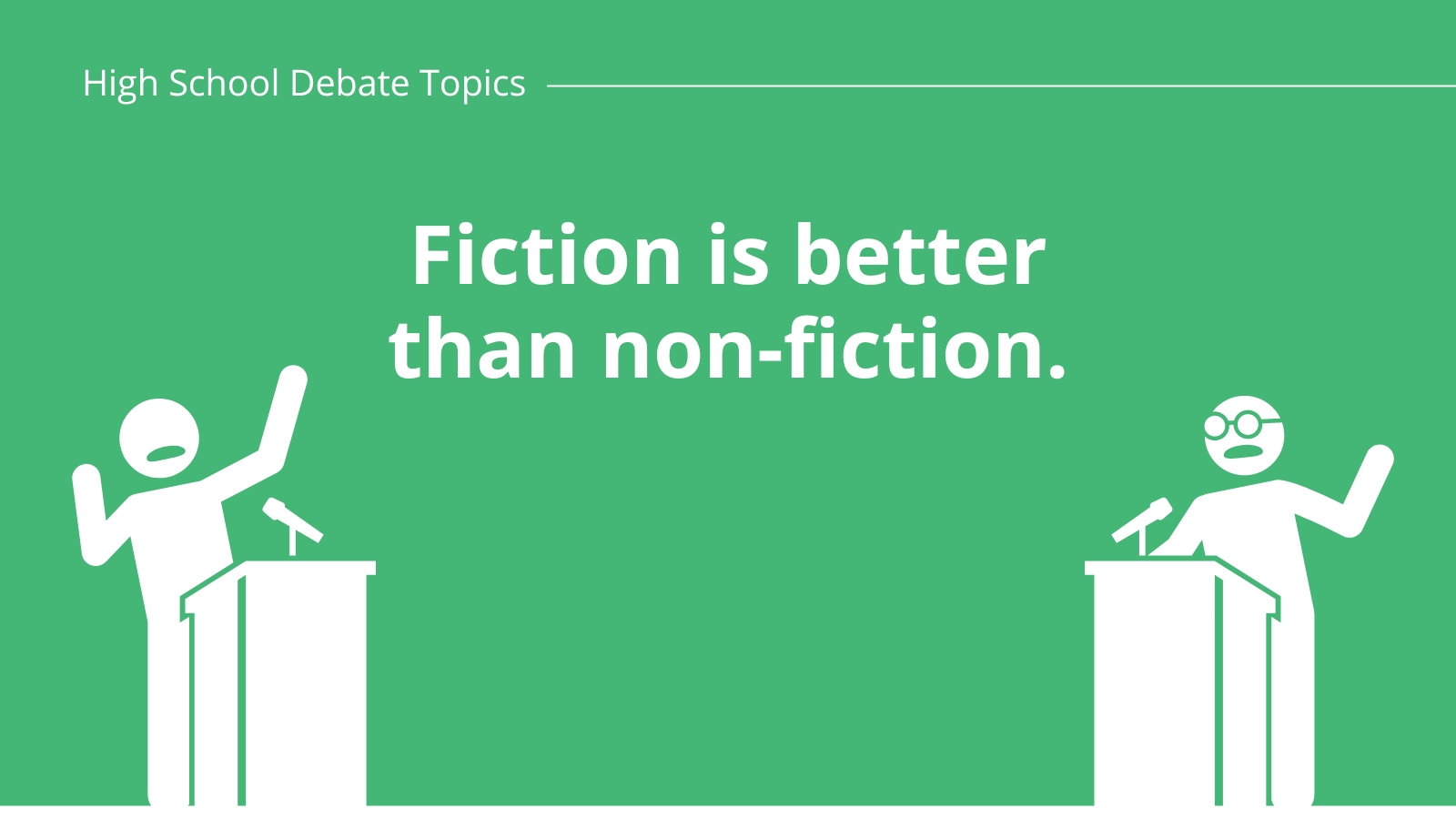
Some teachers shy away from debate in the classroom, afraid it will become too adversarial. But learning to discuss and defend various points of view is an important life skill. Debates teach students to research their topic, make informed choices, and argue effectively using facts instead of emotion. You’ll find plenty of engaging high school debate topics in this list for inspiration. Each topic includes a link to an article from a reliable source that provides pros and/or cons to help kids make their arguments.
School and Education Debate Topics
Life and ethics debate topics, entertainment and technology debate topics, fun and funny debate topics.
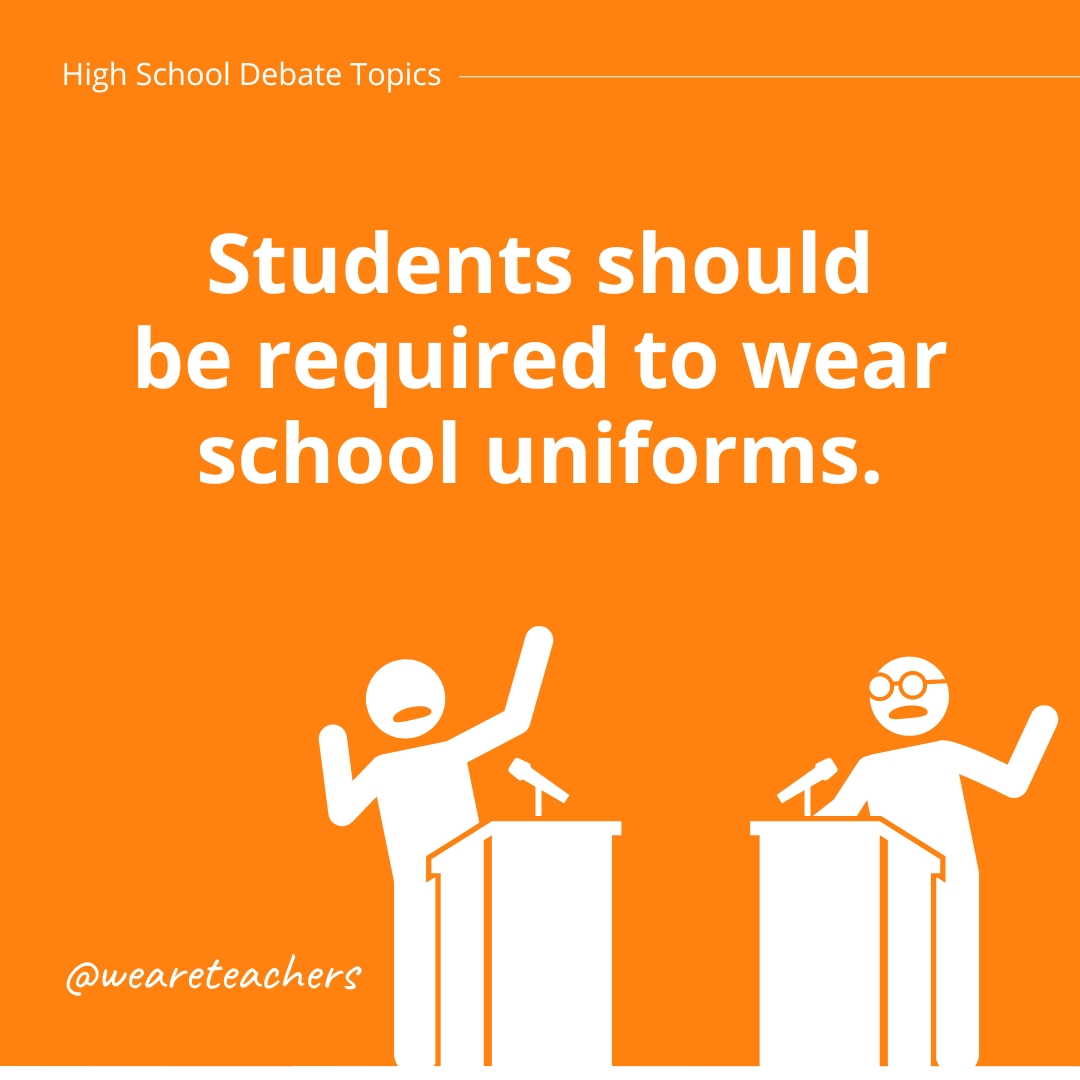
- It’s better to be good at academics than to be good at sports.
- Final exams should be abolished.
- Students should be required to wear school uniforms.
- Private schools are better than public schools.
- Year-round school is better for students.
- Standardized tests are effective.
- Every student should have to participate in athletics.
- All students should be required to volunteer in their community.
- Junk food should be banned in school cafeterias.
- Single-gender schools are better for students.
- Schools should be allowed to teach critical race theory.
- Math is the most important school subject.
- Schools should teach sex ed instead of abstinence only.
- Letter grades should be abolished.
- Teachers should be replaced by computers.
- People who get better grades in school will be more successful in life.
- Sometimes it’s OK to cheat on homework or a test.
- Students who fail a test should be given the chance to take it again.
- Outdoor recess is important at every grade level.
- Students should be allowed to grade teachers.
- Everyone should be able to bring their pets to school.
- Shorter school days are better for students.
- Schools should eliminate dress codes.
- Everyone should be required to go to college.
- College should be free for everyone who wants to attend.
- Schools should install safe rooms in case of mass shootings or natural disasters.
- Schools should be allowed to ban some books from their libraries.
- Book smarts are better than street smarts.
- Schools should provide free mental health services to students and teachers.
- Schools should teach life skills like cooking and personal finance.
- School vouchers benefit students and schools.
- Religion has no place in schools.
- In-person school is better than online school.
- Traditional school is better than homeschooling.
- Charter schools should receive public school funds.

- Girls face more peer pressure than boys.
- The voting age should be lowered to 16.
- Humans should not eat animals.
- Democracy is the best form of government.
- All Americans should be required to vote.
- Cigarette smoking and vaping should be banned entirely.
- Giving is better than receiving.
- Parents should be punished for their children’s mistakes.
- Animals should not be kept in zoos.
- Happiness is more important than success.
- The driving age should be raised to 18.
- The drinking age should be lowered to 18.
- Plastic bottles should be banned.
- People should have to take a parenting class before having a child.
- If you find money on the ground, it’s automatically yours to keep.
- It is better to be kind than to be truthful.
- Learning about history can stop us from repeating past mistakes.
- It’s important to spend money exploring space.
- White-collar jobs are better than blue-collar jobs.
- The death penalty should be abolished.
- Drug addicts should receive help instead of punishment.
- Euthanasia should be legal.
- GMOs are more helpful than harmful.
- Human cloning should be legal.
- A progressive income tax is better than a flat tax.
- Supreme Court judges should be appointed for fixed terms.
- Vaccines should be mandatory.
- We should ban fossil fuels.
- Marijuana should be legal everywhere.
- All drugs should be legalized, regulated, and taxed, like alcohol.
- Nuclear weapons should be banned worldwide.
- Police funding should be redirected to social services.
- Religion does more harm than good.
- Testing on animals should be illegal.
- We will never achieve world peace.
- The United States should implement a universal basic income.
- We should require people of all genders to register for the draft.
- Healthcare should be universal.
- Gun safety laws infringe on the Second Amendment.
- Anyone over 12 should be tried as an adult in court.
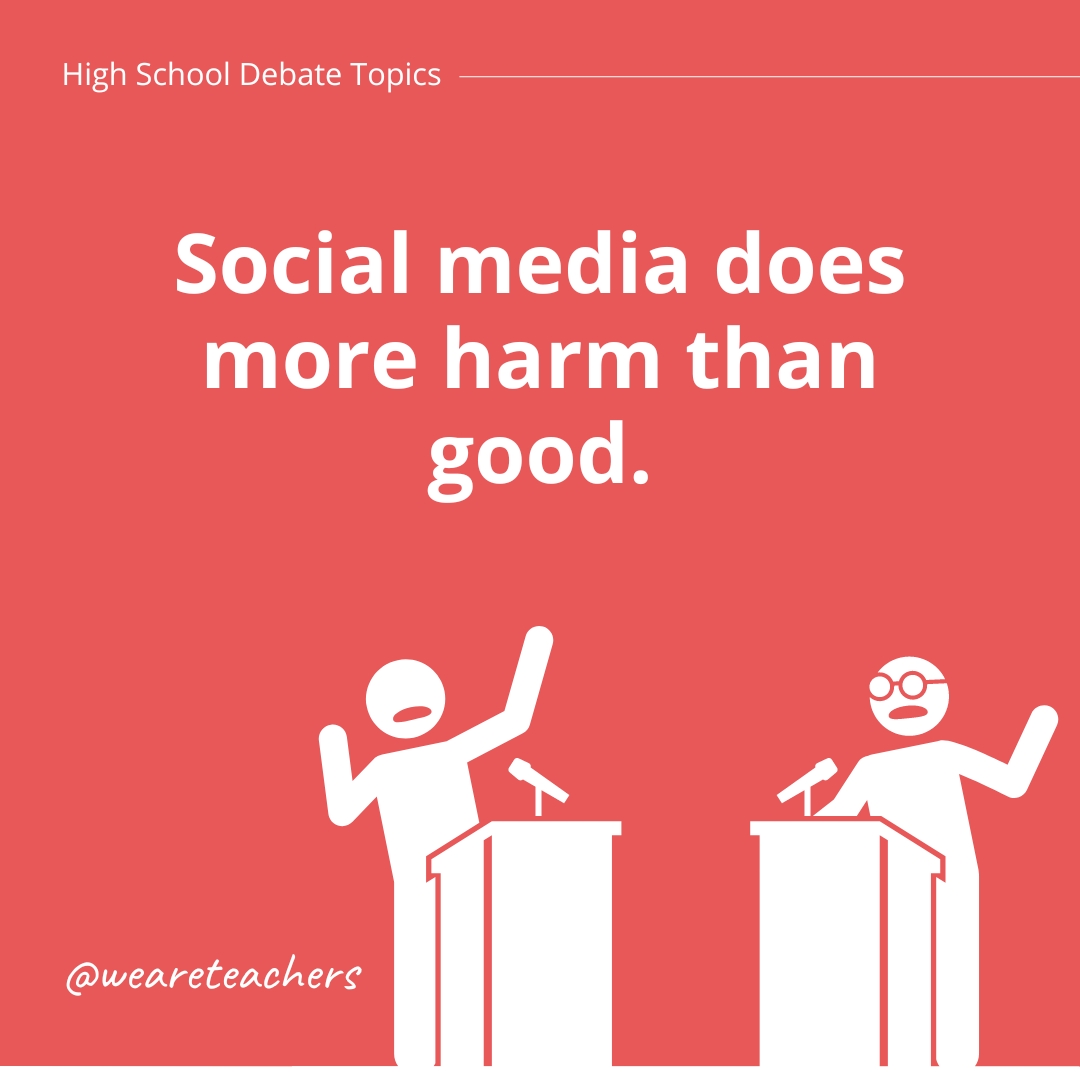
- Reality television depicts real life.
- Schools should allow students to use phones in class.
- Macs are better than PCs.
- Androids are better than iPhones.
- Social media is making us less social.
- Social media does more harm than good.
- Video games are better than board games.
- Video gaming is a sport.
- Reading books is better than watching TV.
- We should replace all paper documents with electronic versions.
- The book is always better than the movie.
- Parents should use their kids’ cell phones to track them.
- Playing video games makes you smarter.
- Scientists should try to develop a way for everyone to live forever.
- Paper books are better than e-books.
- Schools should have surveillance cameras in classrooms and hallways.
- All museums and zoos should be free to everyone.
- There is intelligent life on other planets.
- People rely too much on technology.
- Everyone should play on the same sports teams, regardless of gender.
- Net neutrality should be mandatory for internet service providers.
- Expanded use of artificial intelligence will be good for humanity.
- Technology is creating more jobs than it eliminates.
- The United States should provide free internet access for everyone.
- Cryptocurrencies should replace cash.

- Dogs are better pets than cats.
- A taco is a sandwich.
- Summer is better than winter.
- Coke is better than Pepsi.
- Pepperoni is the best pizza topping.
- Fruit counts as dessert.
- The number 13 is not unlucky.
- People should eat to live, not live to eat.
- Monday is the worst day of the week.
- Clowns are more scary than funny.
- Modern music is better than classical music.
- Aliens live among us here on Earth.
- It’s OK to put ketchup on a hot dog.
- Was Robin Hood a thief or a rebel hero?
- It would be better to be able to fly than to be able to turn invisible.
- Pluto should still be considered a planet.
- It’s better to be too hot than too cold.
- We should allow people to go barefoot anywhere if they want to.
- Fiction is better than non-fiction.
- Using profanity is good for your mental health.
- Leftover pizza is better cold than reheated.
- It’s OK to wear socks with sandals.
- Being famous is actually not all that great.
- GIF should be pronounced “JIFF” not “GIFF.”
- People shouldn’t have to go to school or work on their birthdays.
Did we miss one of your favorite high school debate topics? Then come share on the We Are Teachers HELPLINE group on Facebook !
Plus, how to use fishbowl discussions to engage every student ..

You Might Also Like

Debate Graphic Organizer (Free Printables)
Help students keep track of their ideas during argumentative writing or debate lessons. Continue Reading
Copyright © 2024. All rights reserved. 5335 Gate Parkway, Jacksonville, FL 32256

80 Impromptu Speech Topics For High School Students
Could you share a few words about yourself? This is one of the common questions asked in interviews, scholarships, or even when getting to know a new group of people. While you may be confused as to the pieces of information to be shared, it is so important to be present in the moment.
It is significant to understand that you are certain to come across various situations that require promptness and creativity. This is why impromptu speech is one of the helpful ways to build this skill for high school students.
Just as history essay topics help you express your words through written communication, impromptu speech allows you to build a better grasp of verbal communication. This article helps you with interesting impromptu speech topics that are thoughtfully selected to help students exercise their critical thinking skills and map their ideas.
Creative impromptu speech topics for high schoolers
- The significance of humor in life.
- Technology’s effects on society.
- The advantages of reading.
- The parent’s role in their child’s education.
- The force of goodwill.
- Significance of time management in life.
- Impact of climate change in everyday life.
- Importance of friendship in life.
- Influence of social media on young adults.
- Public speaking is an art.
- Advantages of exercising.
- Importance of Reducing, Reusing, and Recycling.
- Why is quality education a need for the time?
- Advantages of Goal setting for the future.
- The role of women in history.
- The significance of voting.
- The power of positive thinking.
- The benefits of volunteering.
- The impact of video games on children.
- The value of cultural diversity.
- The role of mentors in life.
- The effects of fast food on health.
- Do dreams have a hidden meaning?
- The importance of forgiving.
- Advantages of picking up a new language.
- Is adventure travel a lesson for life?
- Technology’s function in education.
- The significance of productive dialogue.
- Smoking’s negative consequences on health.
- Importance of building interactive museums for children.
- The influence of good role models.
- Effects of artificial intelligence on human beings.
- Advantages of sports for students.
- Significance of enhancing other skills in high school.
- The importance of cultural customs.
- The function of the media in forming views.
- The value of raising awareness of mental illness.
- Online shopping’s implications on small local businesses.
- Importance of Renewable Energy Sources.
- Why is meditation important for personal well-being?
- The impact of fashion on self-esteem.
- The value of wildlife conservation.
- The importance of learning from failure.
- The effects of overpopulation.
- The significance of personal hygiene.
- Power of storytelling for students and adults.
- The benefits of a healthy diet.
- The impact of space exploration.
- The value of community service.
- The role of art in therapy.
- The importance of sleep for well-being.
- The effects of social inequality.
- Do art activities impact learning in high school?
- The significance of clean water access.
- Importance of saving environmental resources for the future.
- The benefits of learning to play a musical instrument.
- The power of volunteer firefighters.
- The value of cultural heritage preservation.
- The impact of smartphones on relationships.
- The effects of deforestation on the environment.
- Why is empathy an important value for students?
- The importance of supporting local businesses.
- The value of emotional intelligence.
- Is internet privacy an important element in today’s time?
- The role of space exploration in scientific advancements.
- The benefits of eco-friendly transportation.
- The value of lifelong learning.
- The advantages of neighborhood gardening.
- Virtual reality’s effects on education.
- The importance of programs for cultural interaction.
- The function of humor in stress reduction.
- The significance of eco-friendly clothing.
- The results of online activism.
- The value of sustainable resources.
- The efficacy of self-care techniques.
- Advantages of urban gardening.
- The results of schooling in coding.
- The significance of being disaster-ready.
- Impact of music therapy for students.
- Why should you indulge in self-care practices?
Helpful tips for impromptu speech
Delivering a speech with preparation on funny persuasive topics or political debate topics might be way different than talking on impromptu topics. Hence, it is vital to check for helpful tips and tricks that channel your thoughts in a more organized manner. Check the below tips to make your impromptu speech engaging for the audience.
- Organize your thoughts on the topic and join the connecting links. This helps you decide the introduction, main theme, and conclusion of your speech.
- Map your ideas and always keep some extra pointers in case you forget the main ones. Mapping ensures that you go in a series without disturbing the rhythm of the speech.
- If you relate to the topic well and have something personal to share, go ahead and make it seem like an example thereby entertaining the audience.
- Be confident while speaking as there is no wrong or right in sharing your opinions on the topic. Make sure to showcase the firmness in your ideas to create an engaging time.
- You can also practice writing by using literary essay topics that allow you to fill your mind with interesting ideas and a plethora of words to enhance your vocabulary.
Wrapping Up
An impromptu speech is certainly a helpful way to encourage participation from everyone in the class. As you deliver your speech, you also get an opportunity to hear others and learn from them.
It is super important to know that impromptu speech is to polish your skills and not a typical competition among your fellow mates. Trust yourself and be clear with the ideas you deliver in your speech. The more confidence you show in your attempt, the more you improvise in verbal communication.

Sananda Bhattacharya, Chief Editor of TheHighSchooler, is dedicated to enhancing operations and growth. With degrees in Literature and Asian Studies from Presidency University, Kolkata, she leverages her educational and innovative background to shape TheHighSchooler into a pivotal resource hub. Providing valuable insights, practical activities, and guidance on school life, graduation, scholarships, and more, Sananda’s leadership enriches the journey of high school students.
Explore a plethora of invaluable resources and insights tailored for high schoolers at TheHighSchooler, under the guidance of Sananda Bhattacharya’s expertise. You can follow her on Linkedin
Leave a Comment Cancel reply
Save my name, email, and website in this browser for the next time I comment.
Elimu Centre
Education Centre

School Speech Topics – High School, Middle School, Elementary
School speech topics, high school speech topics, unique speech topics for high school, middle school speech topics, simple speech topics for school students, speech topics for high school, speech topics for middle school, speech ideas for school, elementary school speech topics.
School Speech Topics – High School, Middle School, Elementary: Ran out of ideas or Searching for School Speech Topics? At times you have been given an assignment at school but you don’t know where to start.
Sometimes it is difficult to discover even simple speech topics for school students. Also when you are told to give a speech, it may cause you to shake with anxiety and worry so much.
Find some great School Speech Topics for High School, Middle School, and Elementary
1. All students should get involved in exchange programs
2. All students should join the gym.
3. Amazing discoveries or facts you have never heard of before and like to introduce to your class.
4. Creativity isn’t something that can be taught.
5. Cyber bullies should be suspended from school.
6. Dream explanation, ask for dreams, explain them. Consult dream reading professional and keep away from the shabby occult business.
7. It is important to take career assessment tests.
8. It should be illegal for under 21’s to buy cigarettes.
9. Kids purposely make parenting hard.
10. Leaving high school with no clear career path isn’t a bad thing.
11. Students must know their place in the classroom.
12. Students should always have condoms with them.
Read: Debate Topics for Kids
13. Students should focus school work ahead of a social life.
14. Students should leave a team if they are never chosen to play.
15. Corporal punishment is abuse.
16. Driving must be taught in High School.
17. Dropping out of high school should be an illegal offense.
18. Extra online classes are worth it.
19. Failing is a blessing in disguise.
20.Group projects only cause conflict
21.When you take a walk in the woods, you can see more than you might think …
22.Why giraffes have long necks.
23. Things to expect when your mother is pregnant.
24.Traditional fairy tales from around the world – remember the thick book of the Grimm Brothers?
25. Unusual experiences in the last year.
26. Why we are no longer kids but are called young adults.
27. Your most favorite memories are also great grade 6 speech topics too to talk about in school.
Read: Motivational Speech Topics for Students
1. ‘Name and shame’ does not change teenage behavior.
2. 16 is an appropriate age to start dating.
3. A narrow escape from trouble …
4. Adventure racing and famous heroes on motorbikes – so-called off the road movie clips could be nice video aids
5. Astronomical signs and their meanings. Make it personal by asking a volunteer to give all the info you need.
6. Attractive students have an advantage over others.
7. Birth control should be available at schools.
8. Boys hide their body image pressure.
9. Bystanders must be held responsible for not intervening when there is trouble at school.
10. Cheating at school is getting worse.
11. Cheerleading isn’t a sport.
12. Class sizes make a big difference.
13. Class sizes should not exceed 20 students.
Read: Fun Topics for Presentations
14. Co-ed schools are better than single-gender schools.
15. Fashion isn’t all that important.
16. Food photography is much difficult than you think.
17. Gay students need older gay role models.
18. Girls are under more pressure in high school.
19.Great places to go in the world.
20. Group work in class should be kept small.
21. Grouping students by ability only benefit the smartest ones.
22. Hard work is more important than talent.
23. Healthy school lunches are a lost.
1. A Day In the life of a kid in Ancient Rome, compare it with your own modern life.
2. A ride in a truck for transporting heavy objects.
3. African masks and their meaning in holy rituals.
4. The secrets of the Egypt King Tutankhamun.
5. The world would be a better place if … (fill in your highest dreams)
6. Things that make you happy right away if you have the power to buy or dictate.
Read: Easy Topics to Talk About In a Presentation
7. Ancient Chinese emperors and their interesting uniform and dress looks.
8. Mythological monsters such as the Minotaur and Nymphs.
9. Outdoor activities, and indoor activities on a rainy day.
10. What is a decent dress code for a serious dinner at official moments:
11. Ways I use to relax.
12. What brands or products are popular in this school and why?
13. What’s in my room at home.
14. Why I like to dance my favorite dance.
15. Oceans of the world: Pacific, Atlantic, Indian, Southern, and Arctic gulf streams.
16. Pen pals or email pals; how traditional patterns have changed.
17. Pollution sources in our world, and what to do about them in a cost-friendly way at home.
18. Pot and care for a plant or small vegetable is hard labor and needs patience.
19. Birds, bears and rabbits spend the winter by sleeping, why?
20. Celebrities, actors, and actresses.
21. Cool home computer games I like to play, criticize, review and share in class.
22. Discovering caves are cool grade 6 speech topics to tell something more and show them the work of speleologists.
23. Environmental problems in our community.
Read: Topics to Argue About
1. Animals I should take in Noah’s Ark – and the philosophy behind it.
2. Animation characters and their voices.
3. Antarctica research of penguins.
4. Aviation pioneers.
5. Aztec masks and their amazing stories and secrets hidden inside.
6. Best 3D paper models: cars, robots, spaceships, airplanes, buildings.
7. Birds in our backyard, you’re perplexed about the miles they flew to get there.
8. Exotic fruits and vegetables in grocery stores; look up where they come from.
9. Family members I admire: uncles, aunts, nieces or nephews.
10. Fashion trends in the last century.
11. Favorite sports moments.
12. Flying discs tricks on the beach side.
13. Foreign flags and their story – perhaps you should play the anthems too for a full picture.
14. Free time activities that you can recommend.
15. Greyhound racing and the bet systems that are used.
Read: Elocution Topics for Kindergarten
16. History of the Panama Canal, and the way the pilotage handle very big ships.
17. How does global warming affect the icebergs?
18. How to make a marionette puppet – a grade 8 speech topic for the artistic
19. How to organize a fun weekend for the whole family.
20. I cope with fear of public speaking for this grade 8 speech by … (secret tactic)
1. If I was a journalist, I should investigate …
2. If I was born hundred years ago, I would be …:
3. If I was my father or mother for one day.
4. If I won one million dollars, I would …
5. Kid cooking is cool – if you know how to prep recipes
6. Last weekend I was at …
7. Magic tricks with simple playing cards for every unexpected occassion.
8. Monitoring butterflies in the field outside and in our garden.
9. Music festivals and the big logistics puzzle of the organizing parties involved.
10. My checklist for if you move to another town.
11. My favorite era in history.
12. My favorite spot in the woods near our cabin.
13. My favourite sports games on television.
14. My first visit to a dentist: the correct way to brush and floss your teeth.
15. My hobby and pet peeves.
16. My most memorable vacation trip till now.
17. My musical instrument and the lessons I take.
18. Skateboarding tips and tricks, safe on the sidewalks.
19. Strange world records set in history.
20. Suggestions for fun weekends.
21. The best summer camp games I have ever played and enjoyed very much.
22. The character I want to be in a movie the hero with heroic courage / or the villain who gets the worst of it in the end.
23. The day I was sick and I must see the doctor.
24. The Diary of Anne Frank (book or movie) and the meaning today.
25. The funniest thing that ever happened to me this month or year.
26. The Ice Age; when, how and the causes are good K-6 subjects to come across.
27. The school field trip I would like to make.
28. When I am grown up I want to become a / an …
1. Helping a friend isn’t always good.
2. High school kids don’t need helicopter parents.
3. High school should be treated as if it were a job.
4. High schools don’t recognize a student’s full potential.
5. Hiking trails nobody knows and you want to share.
6. How to organize surprise parties.
7. How to visit and enjoy an art museum with an audio guide tour on your ears.
8. Hurricanes, how they start and their international accepted standards for name giving (boys and girls names from a to z).
9. I want a new law on … Well feel free to repair and remedy abuses.
10. Islands in Oceania, in the tropical Pacific Ocean region. There where the date line starts.
11. It is important that students volunteer in fields of interest.
12. It is important to have a mix of friends to socialize with.
13. Locker room talk is demeaning to female students.
14. Mass-shooting in schools can be prevented.
15. Never shrug off small assignments.
16. Not every teacher has the ability to inspire students.
17. Nursing your parents when they get older. Lots of young people do that in their spare time, and they do not often speak about it. Take a chance and show them the world of voluntary care by friends, children, and neighbors.
18. Outings to museums have no educational value.
19. Parents embarrass their kids too much.
20. Parents must not pay kids for good grades.
21. Students don’t spend enough time reading books.
22. Students have no interest in government matters.
23. Robotics now and in the future – is it helpful in the daycare business?
24. School should be all year round.
1. Schools must get involved with obese students weight issues.
2. Schools must not sell unhealthy foods.
3. Schools should offer rewards for good test scores.
4. See Europe in seven days after high school!
5. Smoking makes students outcasts.
6. Standardized tests are not a measure of a students ability.
7. Strange experiences in a restaurant or bar and the moral lesson you draw after that.
8. My penpal or better: email-pal from the other side of the world.
9. My trip abroad to Europe or Latin-America.
10. Puppets and their funny looking but indeed very serious theatrical performances from Java, Indonesia.
12. Reasons to abandon grounding rules.
13. Recipes for kids, orally like your favorite meals and food.
14. Rodeo riding: how to survive more than 30 seconds on the riding machine
15. Peer pressure will help students grow.
16. Plagiarism is getting out of hand.
17. Principals don’t help develop teachers enough.
18. Private schools are not better than government schools.
19. Railroads and trains from 1850, and great train builders and engineers is a high school speech topic to work out.
20. Recess time must be extended.
21. Rhetorical questions, Socratical debating techniques.
22. Student’s interests will change in high school.
23. Students are less religious than their parents.
24. Students do not have to get involved with everything in high school.
25. Students do not know how to live in the moment.
1. Students have too much workload.
2. Students shouldn’t be graded for gym.
3. Sugary drinks should not be sold at school.
4. Suggestions for a school field trip in the autumn.
5. Teachers don’t use technology to its full potential.
6. Teachers should be allowed to refuse problem students in their classes.
7. Teachers want to create leaders.
8. Textbooks shouldn’t be replaced by technology in high schools.
9. The best way to learn is alone.
10. The importance of not being a follower.
11. The in crowd is usually the most insecure group.
12. The media is to blame for the pressure of girls wanting perfect bodies.
13. The methods used to deal with bullies are not effective.
14. The morning after pill shouldn’t have an age restriction.
15. The racial makeup of a school is important.
16. There is too much focus on sports in high schools.
17. Things we can’t understand.
18. Tutors are necessary even with good grades.
19. Untidy handwriting is a sign of intelligence.
20. Web filters at school are not restrictive enough.
21. Weekend jobs make students more responsible.
22. What are your community activities?
23. What do you think about often when you enter the school?
24. What have you always wanted to do and did not have the courage to ask or really act?
25. What would you like to change and why? This one is especially good as graduation input and output.
26.Why are television soaps popular
27. Your most embarrassing moment at school and the way you saved your face, solve and fix the awkward situation.
1. Fairy tale characters you would like to talk with.
2. Fireworks on New Year’s Eve.
3. A visit to the doctor, dentist.
4. Circus clowns in all sorts and characters
5. Funny Halloween costumes, inspires to lots of funny elementary school speech topics.
6. Funny things my pet has done. A great quantity of this special theme is to be sorted out of animals and keeping them at home. Do consult your attending if you may bring an animal in class. In case of hesitation – do not cross this line:
7. How boomerangs return to their sender.
8. How does it feel to wake up an being a giant?
9. Magic tricks you can show.
10. Making puzzles of thousands pieces and the tricks I have learned.
11. Musical instruments in an full orchestra.
12. My best birthday ever.
13. My favorite family story.
14. My neighborhood.
15. My one-day internship at the fire department.
16. Oceans in the world.
17. Our last vacation trip.
18. Places I lived.
19. Police uniforms or fire department attire outfits.
20. The best fishing spots.
21. The best paper airplanes without less folding work.
22. This is the song I like to sing every day is: …
23. What can you see in the zoo?
24. What makes me happy.

Betty is a qualified teacher with a Bachelor of Education (Arts). In addition, she is a registered Certified Public Accountant. She has been teaching and offering part-time accounting services for the last 10 years. She is passionate about education, accounting, writing, and traveling.

IMAGES
VIDEO
COMMENTS
Write a speech you're passionate about with these 55 great ideas for interesting persuasive speech topics for high school. ... If you want more school-related speech ideas, try these unique persuasive speech topics for college. Advertisement Persuasive Speeches About Politics and the Economy.
High school speech topics and themes for verbal speeches (such as Tropicana Speeches, writing assignments, and essays. From strange experiences in bars to Europe in seven days, we're to help. Girls are under more pressure in high school. Schools must not sell unhealthy foods. Cyberbullies should be suspended from school.
180 unique speech topics for students from 5 broad areas. Social media - 50 social media themed speech topics. Visiting yesterday - 45 interesting historical speech topics focused on family and community. Just plain weird - 61 speech topic suggestions focusing on the oddities and weirdness of the world and its inhabitants.
112 Engaging Persuasive Speech Topics. Tips for Preparing Your Persuasive Speech. Writing a stellar persuasive speech requires a carefully crafted argument that will resonate with your audience to sway them to your side. This feat can be challenging to accomplish, but an engaging, thought-provoking speech topic is an excellent place to start.
How to Practice and Deliver a Persuasive Speech. Talk to yourself in the mirror, record yourself, and/or hold a practice speech for family or friends. If you'll be using visual cues, a slide deck, or notecards, practice incorporating them seamlessly into your speech. You should practice until your speech feels very familiar, at least 5-10 ...
100 Examples of Persuasive Speech Topics. Studying martial arts is good for mind and health. Competitive sports can teach us about life. Reality shows are exploiting people. Community service should be a graduation requirement for all high school students. The characteristics that make a person a hero.
100+ persuasive speech ideas grouped by theme: animals/birds, arts/culture, automotive, business/economy, social/community, environment, education, ethics, global/world, sports... Notes covering: what makes a speech topic 'good'. why some topics are potentially boring for an audience to listen to and best left alone.
What Makes a Good Persuasive Speech Topic? There are multiple factors that make some persuasive speech topic ideas better than others. Three major things to think about when choosing a persuasive ...
60 vocal variety & body language topics. 60 speech topic ideas to help you work with body language and gesture. They're perfect for evocative personal storytelling speeches or for either of these Toastmasters Pathway projects: Level 2: Learning Your Style: Effective Body Language or, Level 1: Mastering Fundamentals: Vocal Variety and Body Language.
And the good news is that coming up with high school speech topics - then turning them into compelling speeches - is not as difficult as it seems. Just take a deep breath and check out the video below. The presentation contains excellent tips to overcome public speaking anxiety and gives great ideas on how to deliver your speech topics and turn ...
The initial step of crafting a speech requires a unique school speech topic. Before starting the business of writing, students must consider their school speech topics. ... Below is a list of 200+ great speech topics for high school students that can help you draft a powerful speech. Speech Topics for High School Students.
105 Topics for a Persuasive Speech. Here's our list of 105 great persuasive speech ideas. We made sure to choose topics that aren't overdone, yet that many people will have an interest in, and we also made a point of choosing topics with multiple viewpoints rather than simplistic topics that have a more obvious right answer (i.e.
Key Takeaways. Good speech topics should excite the audience, be relevant to current issues, and reflect the speaker's knowledge and interest.; Topics range across various areas including arts, humanities, social issues, science and technology, health and medicine, and economics.; Choosing a unique topic helps in standing out. It's important to research thoroughly and consider different ...
1. Logos — Using clear, logical, and evidence-based reasoning and argumentation to add persuasive power to your speech. For obvious reasons, audiences will typically expect strong arguments supported by evidence and clear reasoning and logic, all elements that are often prominent on grading rubrics for persuasive speeches.
Giving a persuasive speech can be stressful for high school students, especially when you are tasked with coming up with your own topic.. To help reduce the stress of preparation, I have compiled this list of 435 persuasive speech topics for high school students to give you some ideas and inspiration.. These topics cover a wide range of issues that are relevant to today's young adults, from ...
Funny persuasive speech topics for high school students. Why cats make better pets than dogs. The benefits of procrastination. The art of being awkward. Why pizza should be considered a vegetable. The joys of being a couch potato. Why Mondays should be eliminated. The secret to being a professional video game player.
Here is a breakdown of various topics for persuasive speeches, organized by categories, to inspire you. 1. Arts & Culture. Art and culture are always hot topics among individuals and groups. There are many interesting arguments and stances on both topics, and many people have strong opinions about them.
When it comes to choosing a topic for a persuasive speech, here are a few factors you need to consider. Familiar Topic. Try to go for the topics that you're familiar with. This way, you will prepare it quickly and in less time. Unique Speech Topics. Selecting a unique speech topic that genuinely interests you is the best.
When selecting a unique topic, it is important to consider the relevance and timeliness of the subject matter. Choose a topic that is current and addresses issues that are significant to your audience. By doing so, you can tap into their interests and concerns, making your speech more relatable and engaging.
Finding a unique speech topic can certainly be a challenge, but it's also an opportunity for you to delve into an area you're passionate about or explore a new topic that sparks your curiosity. Here are a few suggestions to help you find a topic that'll stand out: 1. Unusual hobbies and subcultures: You could discuss the world of competitive air guitar, urban beekeeping, or extreme ironing.
125 High School Debate Topics To Challenge Every Student. Learn how to argue with logic instead of emotion. Some teachers shy away from debate in the classroom, afraid it will become too adversarial. But learning to discuss and defend various points of view is an important life skill. Debates teach students to research their topic, make ...
Creative impromptu speech topics for high schoolers. The significance of humor in life. Technology's effects on society. The advantages of reading. The parent's role in their child's education. The force of goodwill. Significance of time management in life. Impact of climate change in everyday life.
Unique Speech Topics for High School. 1. A Day In the life of a kid in Ancient Rome, compare it with your own modern life. 2. A ride in a truck for transporting heavy objects. 3. African masks and their meaning in holy rituals. 4. The secrets of the Egypt King Tutankhamun.